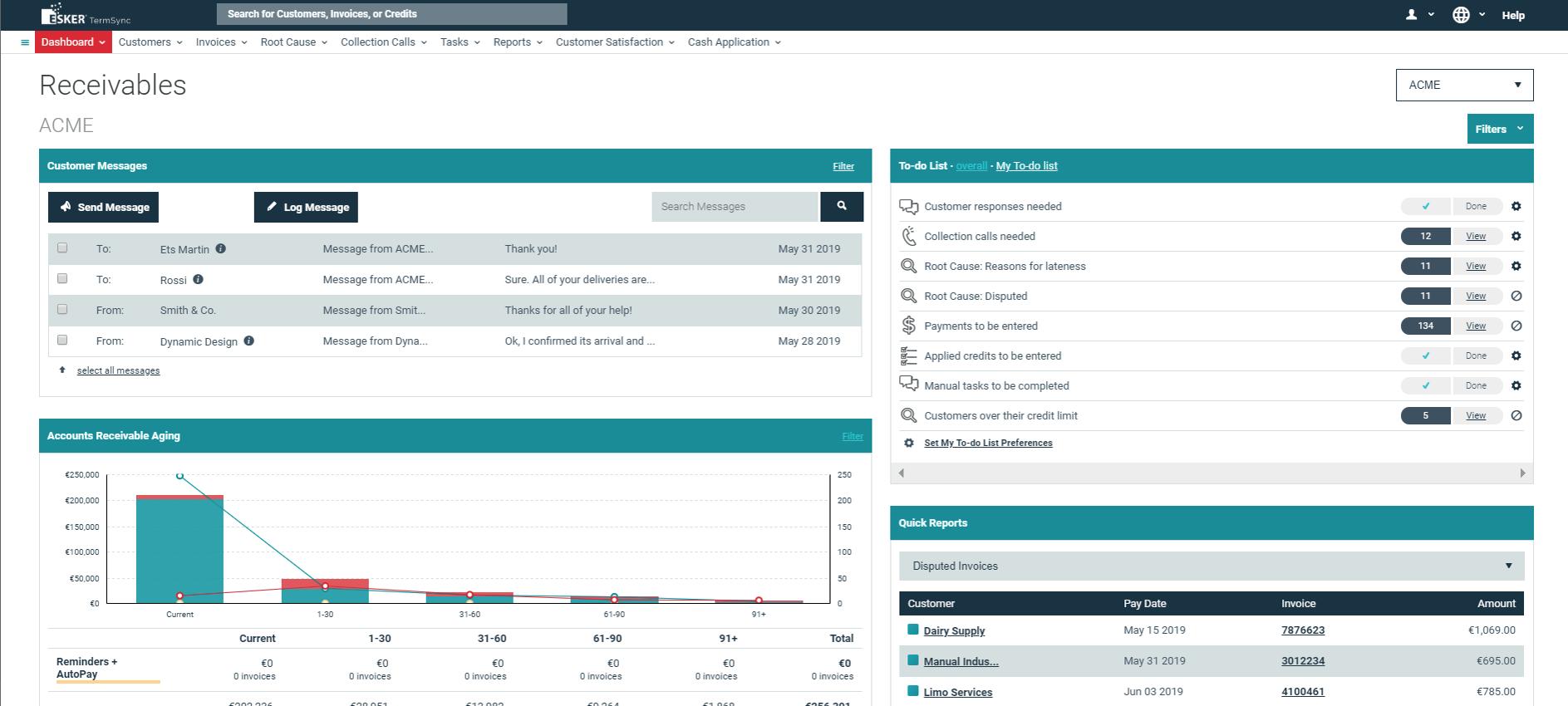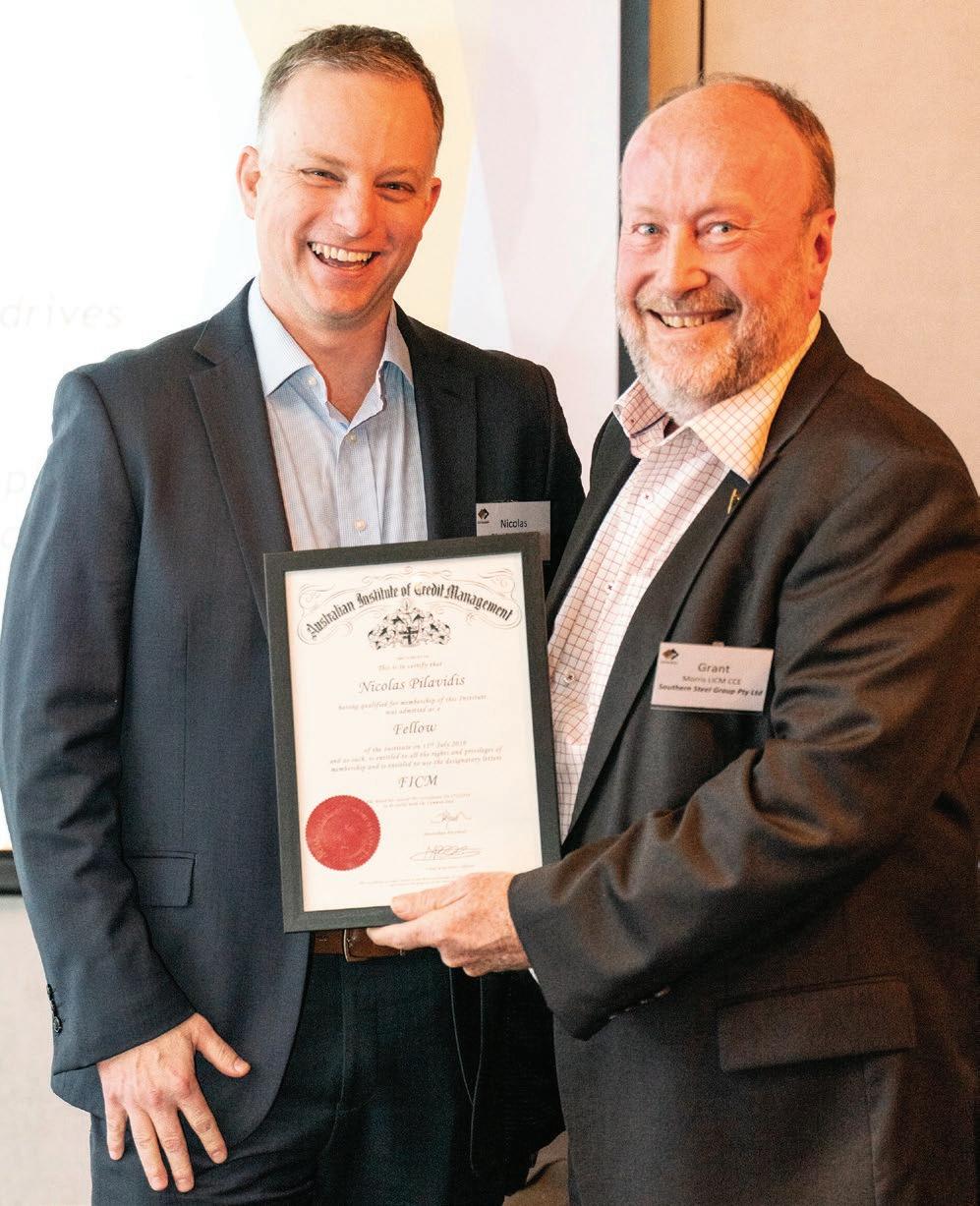announced at





Network 10AGL WoolworthsEFM Logistics The Publication for Credit and Financial Professionals IN AUSTRALIA l Collections and vulnerability – a considered approach l Top 5 myths around legal entities – debunked l Happily ever AfterPay? Volume 27, No 1 October 2019
the NATIONAL CONFERENCE

Message From the President
Credit Management
insurance claims
By Kirk Cheesman
being caught in
By Patrick Coghlan
flow
5 myths around legal entities

 By Michael Criss
By Michael Criss
to choose the right
By Stephanie Hughes
Credit Managers
By Guy Saxelby
Data & Technology
is money
Damian Arena
is King, long live the King!
By Richard Vaughan
Credit
& Vulnerability
By Nikki Dennis
CreditSmart:
By Michael Blyth
Ever AfterPay?

a population of
By Clare Venema
the new
the “buy now, pay later”
Update
By Roger Mendelson
ways
Daniel Turk









October 2019 • CREDIT MANAGEMENT IN AUSTRALIA 1 Volume 27, Number 1 – October 2019 Contents
4
Credit
up; What does this mean? 6
Avoid
the
on effects of economic 8 uncertainty
Top
– debunked! 12
How
Debt Collection agency? 14
How
stand to benefit from Early 16 Payment Programs
Time
18 By
Data
20
Consumer
Collections
– A considered approach 22
Being
navigating
world of 28 comprehensive credit reporting
Happily
Is
sensation 30 cultivating
debtors?
Legislation
Compulsory changes to Warranty Clauses 34
Simple
trade suppliers can improve securities 36 By
Richard Vaughan Nikki Dennis
20 22
Guy Saxelby Damian Arena
16 18
Michael Criss Stephanie Hughes
12 14
Kirk Cheesman Patrick Coghlan
6 8
Michael
Blyth
Clare Venema
28 30 Roger Mendelson Daniel Turk 34 36
ISSN 2207-6549
DIRECTORS
Trevor Goodwin LICM CCE – Australian President
Julie McNamara MICM CCE – Queensland and Australian VP

Lou Caldararo LICM CCE – Victoria/Tasmania
Rowan McClarty MICM CCE – Western Australia/Northern Territory
Gail Crowder MICM – South Australia
Peter Morgan MICM CCE – New South Wales





Debbie Leo MICM – Consumer
CHIEF EXECUTIVE OFFICER
Nick Pilavidis FICM CCE
Level 3, Suite 303, 1-9 Chandos Street, St Leonards NSW 2065
PO Box 64, St Leonards NSW 1590
Tel: (02) 8317 5085, Fax: (02) 9906 5686 Email: nick@aicm.com.au
PUBLISHER
Nick Pilavidis FICM CCE | Email: nick@aicm.com.au
CONTRIBUTING EDITORS
NSW – Sev Indrele MICM CCE
Qld – Carly Rae MICM
SA – Lisa Anderson MICM CCE
WA/NT – Rowan McClarty MICM CCE Vic/Tas – Michelle Carruthers MICM
EDITOR/ADVERTISING
Andrew Le Marchant LICM CCE Phone Direct 02 8317 5052 or Mob 0418 250 504 Email: andrew@aicm.com.au
EDITING and PRODUCTION
Anthea Vandertouw | Ferncliff Productions
Tel: 0408 290 440 | Email: ferncliff1@bigpond.com
THE EDITOR reserves the right to alter or omit any article or advertisement submitted and requires idemnity from the advertisers and contributors against damages or liabilities that may arise from material published. CREDIT MANAGEMENT IN AUSTRALIA is published by the Australian Institute of Credit Management, Level 3, Suite 303, 1-9 Chandos Street, St Leonards NSW 2065. The views expressed in CREDIT MANAGEMENT IN AUSTRALIA are not necessarily those of Australian Institute of Credit Management, which does not expect or invite any person to act or rely on any statement, opinion or advice contained herein (whether in the form of an advertisement or editorial) and neither the Institute or any of its employees, agents or contributors shall be liable for any opinion contained herein. © The Australian Institute of Credit Management, 2019.
JOIN US ON LINKEDIN
Insolvency
– what’s in it for creditors?
By Tim Cole
My customer has gone into external administration,
“oh s#%t!” but it aint over, until it’s over …
By Andrew Spring
Personal Property Security Act
2020: Future-proofing the PPSR
By Gavin McCosker
Legal
It’s a matter of (trust) money
(and how to follow the money trail) – Part 2
By Natalie Ledlin, Terry Ledlin and Peter Mills
am I paying you for something that I legally
own? The imposition of levies by insolvency practitioners for the recovery of PMSI stock
By Nicholas Boyce
EDITORIAL CONTRIBUTIONS SHOULD BE SENT TO:
The Editor, Level 3, Suite 303, 1-9 Chandos Street, St Leonards NSW 2065 or email: aicm@aicm.com.au
Graduates and Training calendar
the AICM
Pilavidis CEO and now FICM
CREDIT MANAGEMENT IN AUSTRALIA • October 2019
Bankruptcy
40
42
Beyond
44
46
Why
52
Training Recent
54 From
Nick
56 Contents
Andrew Spring
Natalie
Ledlin
Gavin McCosker
Terry
Ledlin Peter Mills
Tim
Cole
42 46 44 46 46 40
Click Here





October 2019 • CREDIT MANAGEMENT IN AUSTRALIA 3 Contents For advertising opportunities in Credit Management In Australia Contact: Andrew Le Marchant Ph: (02) 8317 5052 | E: andrew@aicm.com.au Around the States New South Wales 58 Queensland 62 South Australia 68 Victoria/Tasmania 72 Western Australia/Northern Territory 77 New Members 81 Credit Marketplace 83 58 62 68 72 77 NSW: YCP finalists Laura McCulloch, Ceyda Sert, Nathan Abellanoza and Chris Lagana. Qld: YCP Finalists: David Tharp (Tradelink), Chad
San
Giorgio (DHL), Ashleigh Mason (NCS), Talitha Bere (Tradelink), Edward Sklavos (Nexxa) and Damian Crowley (Choice Mercantile). SA: YCP Finalists – Clare Venema (Worrells), Craig Brooks (illion), Edwina Tideman and Tammy Ktisti (both NCI).
Vic/Tas: YCPA finalists Henry Liew (NAB) Martina Vucak (Kingspan), Farhan Hossain (recoveriescorp), Natasha Clarkson (Dulux Group) and Quan Le (Department of Justice).
WA/NT: WA
State Finalists: Charis Ludemann, Alex Cimetta, Melissa McVey, Alex Ramsay and Alex Fenna.
Volume 27, Number 1 – October 2019
Trevor Goodwin LICM CCE National President

This issue of our Credit Management magazine is the only hard copy magazine of the five editions the Institute issues each year. Its release coincides with our premium event of the year, the National Conference.
This year we return to the Marriott Hotel on the Gold Coast which has always been an exceptional conference venue impressing our delegates, presenters and sponsors. During the conference I look forward to speaking to many of you and sharing our credit experiences and stories.
The conference is the single largest education and networking event for professionals in the various sectors within the credit industry. We have an excellent program encompassing both commercial and consumer credit with presentations of the highest quality which will only enhance the Institute’s reputation further amongst credit professionals.
On behalf of your board I thank all delegates who are attending the conference and the service providers who support us with their exhibition booths that help keep us up to date with the latest products and services. In particular, I acknowledge and thank Equifax, our Premium Sponsor for the 2019 AICM National Conference.
There will be numerous presentations at the conference including the announcements of the winner of the Young Credit Professional award which is sponsored by illion, and the Credit Team of Year sponsored by Equifax. We will present certificates to our new Certified Credit Executives including the Dux award donated by National Credit insurance (Brokers) and an acknowledgment of CCE’s who have recertified. In addition, we will also announce the winner of the Student Award of the Year and the Presidents Trophy for the best performing State Division.
For those members who cannot attend I hope to see you a conference next year or in years to come.
Much has happened since our last conference 12 months ago in Melbourne. Our membership numbers have remained strong, indicative of our members support for the Institute and our ongoing relevance and importance to education, training and legislation advocacy for members.
I am proud to say your Board and National office team have implemented and worked tirelessly on a number of initiatives this past year. The Constitution and By-Laws have been rewritten and policy documents are being reviewed. We are introducing an Education Foundation to further our focus on quality training to our members.
We have also recently appointed our first Board appointed Director, Debbie Leo, to further our involvement in the consumer credit sectors.
aicm From the President 4 CREDIT MANAGEMENT IN AUSTRALIA • October 2019
From the President aicm
We are also looking to introduce a mentoring program along with a number of other initiatives developed from feedback from the wide range of stakeholders who like me are passionate about their industry.
The Board continues to plan for the future to seek out new opportunities and initiatives, and to implement our key strategic priorities to ensure we continue to grow and maintain our position as thought leaders and point of reference for all credit professionals.
Recently the Board held a strategy planning day to develop key strategies for the future based around 8 pillars of where we wish to be in the short and long term.
The Board and National Office team are well supported by the Councils in each division which consist of hardworking volunteers who continue to provide excellent education and network events for members and their colleagues. If you are interested in working with our local divisions on a sub committee please speak with a councillor in your State who will be happy to chat to you about the role you can play.
I can’t speak more strongly as to how working in a team assists you with your career and personal development and with networking opportunities. In addition it is extremely rewarding.
Upcoming events in your local divisions include economic breakfasts, an insolvency roadshow, credit toolboxes and half day seminars as well as the Pinnacles awards in each of the divisions.
The Institutes training programs are providing excellent education to our many members with a variety of options at every price point, including Registered Training Organisation Certificates and Diploma, seminars, the Conference and our Credit Toolboxes and Workshops.
The Institute will continue to grow into the future to ensure our relevance, position and posterity. But we should not to forget our past and I encourage members that may have old AICM photos or items to send them into National office so as we can save them and remember our past.
Finally, in closing I thank all volunteers who are involved in organising our events including the highly successful WINC event, our YCP judges and facilitators, and the presenters at our various education events. Without you we cannot be the successful Institute we are.
Trevor Goodwin LICM CCE National President
October 2019 • CREDIT MANAGEMENT IN AUSTRALIA 5
Credit insurance claims up; What does this mean?
By Kirk Cheesman*
2019 has been an interesting year so far with both consumer and business confidence wavering due to many factors; global economic conditions, Brexit, local competition, global trade ‘wars’ and political uncertainty.
What we have seen at NCI is a steady demand for trade credit insurance cover, which indicates businesses are concerned about their credit risk and are being proactive in protecting themselves.
Premium rates have remained steady while we have seen slight increases in turnover. Backing this
confidence approaching the end of the calendar year.
It is not just our claims figures that have been setting records. The combination of collection actions, claims received, credit limit decisions and overdue accounts is at a threeyear high with our trade credit risk index reaching 838. Claims received in the second quarter came in at 419 with a value of $22.4 million. Around the country, New South Wales and Queensland have both received their fair share of claims with 27.25% and 27% respectively. This is followed not too far behind by Victoria with 21.75% and then Western Australia and South Australia.
Kirk Cheesman
up is an increase in claim volumes. May was the highest ever number of claims received in one month. The flow-on effect of this was that in August, the number of claims paid was at an all-time high.
There have been some notable statistics released recently, starting with Australia’s GDP growing at just 1.4%, against a projection of 2.75% the slowest in 10 years. The Reserve Bank of Australia holding the official interest rate at 1% would suggest that it will take some time for the economy to get back to a position of significant growth. Hopefully, this can shift consumer and business
Alarmingly, all these negative indicators have increased over the past 12 months. As we head into the fourth quarter, could we expect to see a further rise due to increased spending around Christmas? Drilling down into the claims we received, labour hire and electrical were number one and two followed closely by building and construction.
An industry sector which has been hit hard recently is the agriculture industry with notable insolvencies such as Special One Grain, GrainPro, All Commodities, Lempriere and Dalgrains all entering external administration. For businesses that operate on extended credit terms and low margins, insolvencies such as these can be devastating for the

Credit Management 6 CREDIT MANAGEMENT IN AUSTRALIA • October 2019
“There have been some notable statistics released recently, starting with Australia’s GDP growing at just 1.4%, against a projection of 2.75%”
industry and especially for one that is in
midst of drought.
In summary, questions should be asked of all businesses, large and small, what would be the impact on the business if their largest customer was unable to pay?

Unfortunately, there are many businesses throughout Australia that would be in great difficulty if that situation was to arise, statistics referred to earlier would suggest that there will be more insolvencies and more difficulties for the remainder of 2019.
So, now is a good time to review
top customers
Credit Management October 2019 • CREDIT MANAGEMENT IN AUSTRALIA 7
the
your
and gauge what effects the current economic conditions may have on them and your business. *Kirk Cheesman MICM Managing Director National Credit Insurance Brokers P:1300 654 500, E: kirk.cheesman@nci.com.au W: www.nci.com.au 0.75% 14.00% 1.25% 7.00% 27.00% 27.25% 21.75% w Contact us today for a free 30-minute consultation 1800 954 418 | enquiries@kpr.com.au | www.kpr.com.au With over 70 years of combined experience we have the skills, expertise and resources to recover monies owed to you as quickly, efficiently and cost effectively as possible. Our customer promise to you is if no money is collected, no commission is paid. We offer the following debt recovery & legal services: • Debt recovery • Credit management • Commercial litigation • Field calls • Repossessions • Process servicing • Strata levy arrears collections Kemps Petersons help Australian businesses stay in business Our experienced team recovers 85% of debt without taking legal action.
Avoid being caught in the flow on effects of economic uncertainty
By Patrick Coghlan*
If the headlines in the media are enough to go by, the state of the economy has entered uncertain times. Every day it seems as though there is a new collapse and a company is entering administration.
According to the Sydney Morning Herald, the economy may be set to record its worst annual result in two decades and JP Morgan stated that there is the real possibility of another negative quarter. Two negative quarters in a row would push Australia into a recession.
CreditorWatch’s recent Small Business Risk Review, showed that court actions increased in financial year 2019 across all states and there has been a steady increase since December 2018. Despite this, insolvencies and bankruptcies have fallen but that doesn’t mean that the next wave of insolvencies won’t start presenting themselves soon off the back of the court actions. It will be interesting to watch these trends over the next few quarters.
An Industry Insights report also conducted by CreditorWatch for the 2019 financial year, showed the top three worst performing industries according to court actions were (in order):
1. Construction
2. Professional, Scientific and Tech Services
3. Retail Trade
Patrick Coghlan

New South Wales saw the highest construction risk and Victoria came
in second place. To many, this may be of no surprise.
One of AICM’s longest standing members of 20+ years, Treacy Sheehan, was caught out by the construction industry. As a resident of the Mascot Towers and a small business owner herself, she is now facing the flow on effects of the poor performing construction industry. While it is still unclear what happened with the Mascot Towers, Treacy is now staying in temporary living arrangements and has had to contribute thousands for repairs.
Treacy and 132 other owners of units in the Mascot Towers are caught up in the flow on effects of poor due diligence in the construction industry. “I run a small recruitment business, Trace Personnel, and being caught in this mess affects revenue, its an absolute flow on effect. The IGA that operated at the bottom of the Mascot Towers has lost hundreds of thousands in stock. Yet, our mortgages still need to be paid, interest still needs to be paid, and if the building is unacceptable, what happens to the owners’, our investments and our credit, where do we go from here?”
“The situation with the construction industry is endemic with at least 3 other buildings in Sydney facing a similar situation,” said Treacy. There is constant news of construction company collapses as of late. According to the Australian Bureau of Statistics, as of June
Credit Management 8 CREDIT MANAGEMENT IN AUSTRALIA • October 2019
2019, the trend estimates for total construction work done fell 2.7% this quarter and has fallen for four quarters. Building work also fell 2.2% this quarter and has fallen for three quarters. Residential and nonresidential also fell. Construction work in New South Wales and Victoria has fallen for the last three quarters. The value of total work completed has also fallen by 2.7%.
The CreditorWatch Industry Insights report also found that the most amount of insolvency notices were given to Professional, Scientific and Tech services, with Construction in second and Retail in third. The headlines match these statistics with some notable collapses:
l Professional, Scientific and Tech Services – RCR Tomlinson, an engineering firm, collapsed owing $630 million. ECM, an electrical engineering contracting business, collapsed, leaving 400 employees with two weeks’ pay and out of jobs.
l Construction – Ralan Group collapsed owing $500 million. J.M. Kelly Group saw a $33 million collapse. Strongbuild collapsed owing $7 million and JBP Holding collapsed owing $6.4 million l Retail Trade – It’s no surprise that retail has been struggling for a while. Recently, Australia saw the collapse of big names such as TopShop, ToysRUs, Roger David and recently, Karen Millen Big W is closing 30 stores around the country and department stores are voicing their struggle.
On top of all this, you need to be aware of illegal phoenix operators. The Phoenix Taskforce, which comprises 37 federal, state and territory government agencies, found that “it can occur in any industry or location. However, illegal phoenix activity is particularly prevalent in major centres in building and construction, labour hire, payroll services, security services, cleaning, computer consulting, cafés and
restaurants, and childcare services.
We also see it in regional Australia in mining, agriculture, horticulture and transport. There is an emerging trend in intermediaries who promote or facilitate illegal phoenix behaviour.”
The ATO, ASIC and the Fair Work Ombudsman commissioned PwC to measure the current impacts of illegal phoenix activity.
Annual costs of Phoenix Activity from the 2018 report found:
l Annual direct impact of illegal phoenix activity to be between $2.85 billion and $5.13 billion
l The cost to business from unpaid trade creditors is between $1,162 million to $3,171 million
l The cost to employees, lost through unpaid entitlements is between $31 million to $298 million
l The cost to government from unpaid taxes and compliance costs is around $1,660 million.
Xero released an explosive Small Business Insights report which highlighted that there was $115 billion in late payments throughout financial year 2018 and that $7 billion was owed from larger businesses. There could be many reasons for this but often we see larger businesses paying their larger customers first and it’s the smaller businesses that get paid late, or not at all.
While the state of the economy may seem worrisome, it is not all doom and gloom. Small businesses and larger businesses alike can see this point in time as an opportunity to reset their knowledge and processes around due diligence and who they do business with. By keeping the following tips in mind, businesses can mitigate risk, improve management of cash flow and reduce the impact of becoming part of a flow on effect.
Invest in onboarding your customers correctly

One of the most important things a business can do to protect their cash flow is to invest in onboarding their customers correctly. Allocating spend and taking the time to improve the onboarding process will actually save a business money in the long term. While we’d like to trust everyone, it’s just not possible to do that. If a customer goes into liquidation, it can affect your business’ cash flow and there is a flow on effect from there.
We live in a digital age where technology is more accessible than people think. One way to significantly improve the onboarding process is to switch to technology that can streamline and automate your processes, saving you both time and money. ➤
Credit Management October 2019 • CREDIT MANAGEMENT IN AUSTRALIA 9
Small Business Risk Review
Review
Court Actions by Volume FY2018-FY2019
Court actions increased in FY2019 in comparison to FY2018 across all states with the exception of WA, which decreased by 18%. We saw an overall increase of 18%.
Australia had the least amount, with a consistent decrease.
South Australia significantly peaked in court action s in July 2017 and again in February 2019
YOY% TOTAL 18%
Actions
Highest
Victoria took the lead each year with the highest amount of court actions
saw its highest court actions in August 2018
New South Wales had the second highest amount of court actions each year
New South Wales peaked in August 2017 and peaked again in May 2019 with the highest amounts.
Court Actions by Dollar Amount FY2018-FY2019
Dollar Amounts increased in FY2019 in comparison to FY2018 across all states with the exception of WA, which decreased by 5%. There
an overall increase of 13% across Australia.
Western Australia had the highest dollar amounts in July 2017 and again in January 2019
South Australia peaked in dollar amounts in July 2017 and again in April 2019
had the highest dollar amounts in August 2017 and peaked again in May 2019
YOY% TOTAL 13%
Construction Risk Across Australia
Notices
by
Victoria peaked in dollar amounts in July 2017 and again in May 2019 New South Wales had the highest dollar amounts in August 2017 and peaked again in May 2019
New South Wales had the second highest amount of court actions each year
New South Wales peaked in August 2017 and peaked again in May 2019 with the highest amounts.
Credit Management 10 CREDIT MANAGEMENT IN AUSTRALIA • October 2019 Annual
FY2018 vs FY2019
14% 28%
Western
Victoria
26% 1%
55% 10% -5%
QLD
23% 38%
was
Court
Nationwide July 2018 - June 2019 Top 5 Industries of
Risk 23% Construction Retail Trade Manufacturing Transport, Postal and Warehousing Professional, Scientific and Technical Services 11% 8% 7% 11%
9% 9% 3% 33% 27% 19% Construction is the riskiest industry across NSW, QLD, SA, VIC, WA and TAS. NSW is the worst performing state by 33% Professional, Scientific and Tech Services RCR Tomlinson $630 million collapse; ECM 400 employees jobless Construction Ralan Group $500 million collapse; J.M. Kelley Group $33 million collapse Retail Trade TopShop, ToysRUs, Roger David , Karen Millen ASIC
Generated
Industry July 2018 - June 2019 20% Professional, Scientific and Technical Services Retail Manufacturing Accommodation and Food Services Construction 10% 7% 6% 16% Payment Defaults by Industry July 2018 - June 2019 29% Construction Retail Professional Scientific & Technical Services Accommodation & Food Services Manufacturing 12% 10% 8% 12% 1% Court Actions Nationwide (July 2018- June 2019) Lowest Risk: Electricity, Gas, Water and Waste Services 5 Riskiest Industries by Average Days Overdue July 2018 - June 2019 Administrative and Support Services Arts and Recreation Services Electricity, Gas, Water and Waste Services Construction Professional, Scientific and Technical Services 90+ DAYS 90+ DAYS 90+ DAYS 87 DAYS 88 DAYS
Software like CreditorWatch and its integration with its online credit application, ApplyEasy, can greatly improve the onboarding process. Customers information will be checked for accuracy and will be run through a credit check with a recommended decision provided in seconds. If you think that the customer’s information doesn’t matter, think again. A great example is PPSR. Without the correct ABN, ACN, name or address, registrations can become void. ApplyEasy also integrates with PPSR Logic, for streamlined registrations.
It is important to agree upon the correct payment terms as well. If a customer has a history of payment defaults, slow payment times or court actions, consider placing them on cash on delivery (COD) for a while. You might also want to shorten the payment terms than you usually would to allow for the average 7 days late period. Consider switching your accounts receivables to an online platform. Xero found that businesses who used online invoicing increased their payment times by 55%.
Know exactly who you are dealing with
Another crucial step to keep in mind is really getting to know your customer, especially if they operate in a highrisk industry or have adverse data on their credit report. Identify who is the underlying guarantor and ask for a trust deed if dealing with a trust.
Directors are essential to pay attention to. A director cannot be operating a business if they are bankrupt, but some fall through the cracks. It is important to look at cross directorships as well. For examples, if the director of construction Company A has adverse action registered against their Company B, you’ll want to be across it as past and present director behaviour is a great indicator as to how they will run a business: l A director with a payment default is 5 times more likely to experience another one
l A director with a court action is 2 times as likely to have another one l A director with a failed business is 2 times more likely to fail again
If a director has experienced insolvency and sets up another company afterwards with a slight name change, this could indicate illegal phoenix activity.
“It’s important to perform due diligence when dealing with the construction industry,” explained Treacy. “You need to check if the builder, developers, strata management companies and engineers are still in business, and get to know who you are dealing with from the ground roots. It’s the same for a business. Make sure you do your homework on who you’re dealing with.”
The process of KYC (Know Your Customer) is handy for those not just in legislated industries like finance, if a customer operates in risky industries like construction or retail utilising KYC tools are very handy. These tools help identify higher risk entities and enable you to perform better due diligence, identifying those people who ultimately control a company regardless of whether they are a director or not.
Pay attention to the canaries in the coal mines
Subscribing to monitoring and alerts can help you to stay across adverse data in real time with 24/7 alerts highlighting insolvencies, mercantile inquiries, court actions, payment defaults, ABN/ACN changes, and more.
Companies that go into
administration, generally show signs of stress before that happens. If a company can’t make payments to their smaller suppliers, they can only realistically maintain that for about six months. Then, when they stop supplying their largest suppliers, that’s when they typically collapse or are wound up.
Have an action plan in place
Review your current debt collection plan and if you don’t have one, now is the time to make one. Establish a process for each stage of a late payment and your follow up response to it. Collection software has come a long way in recent years allowing you to automate a number of these follow ups. And of course, don’t forget about the power of a payment default!
Review your customer database
It is vital to review your customer database regularly. Performing a Datawash can assist and help to identify any changes to your customer circumstances such as ABNs, ACNs, address changes and more. Consider placing the customers who have poor credit scores, court actions and payment defaults into a quarterly or 6-month review.
The above tips will help you to stay on top of your customer base, mitigate risk to your business and stay proactive in times of uncertainty.
CreditorWatch
Ph: 1300 50 13 12 www.creditorwatch.com.au
Credit Management October 2019 • CREDIT MANAGEMENT IN AUSTRALIA 11
*Patrick Coghlan MICM Managing Director
“We live in a digital age where technology is more accessible than people think. One way to significantly improve the onboarding process is to switch to technology that can streamline and automate your processes, saving you both time and money.”
Top 5 myths around legal entities
– debunked!
By Michael Criss*
Reducing exposure to risk is a priority for credit managers offering commercial credit. Here we debunk some commonly held misconceptions when it comes to assessing risk for different entity types.
Most of these false beliefs relate to the credit agreement entered into with new customers. For robust protection of your financial interests, it’s important to know from the start the type of legal entity your applicant is. Are they a sole trader, a partnership, a company or a trust? There are other corporate structures but in the majority of cases this is what most credit professionals would expect to see. You need to know these facts as the liability behind these structures can impact your ability to collect an outstanding debt in the event something goes wrong.
The recent 2019 Equifax National Credit Managers Survey showed that 73% of credit managers experienced a rise in credit demand in 2019, compared with 2018. With this increased credit activity, it’s more important than ever to protect your business from bad debt.
Beware of these myths which might weaken your knowledge of who you are doing business with and
make it harder to recover any debts which may arise.
Myth #1: A trust registry database is a reliable way to identify trust applicants.
TRUTH: A Trust Deed is the only source of truth to accurately assess the credit risk associated with your application.
The Equifax Credit Managers survey showed that trusts make up 25% or less of the customer base for most respondents, yet they often cause an automated assessment process to become manual. If your customer applies as a trust, it’s vital to identify the legal entity behind this structure. A trust is not a legal entity it holds assets, but it doesn’t control these assets. Control, or ‘legal title’, is in the hands of the trustee or the appointer, which could either be a company or one or more individuals.
Because it’s not easy to sort out who the legal entity is in a trust, the idea of a trust registry database is understandably attractive. After all, who wouldn’t like to swap a manual process with an automated solution for linking trust applicants to the individuals behind them? The problem

Credit Management 12 CREDIT MANAGEMENT IN AUSTRALIA • October 2019
Michael Criss
“Beware of these myths which might weaken your knowledge of who you are doing business with and make it harder to recover any debts which may arise.”
with this scenario is that trust deeds change. In Australia there is no legal requirement for trustees to notify a government registry of changes to the trust deed. As such, there’s no regulated central register to refer to when processing trust applications, and no guarantee the information held in a trust register is up to date.
The only way to reliably find out who is the legal entity behind a trust is to look at the trust deed at the point of application. It’s here that you will be able to identify who is the trustee or appointer. And it is this entity, not the trust, who is personally liable for any debts.
Myth #2: An ABN search is sufficient when gathering information about a company.
TRUTH: An ACN search is far more insightful and is the correct number to rely on when assessing credit risk.
For most respondents in the Equifax Credit Managers Survey, the largest portion of their customer base is stated to be companies. For 71% of respondents, companies consist of more than half of their customer base. So for many credit managers, verifying company information when entering into a credit agreement is a routine task. But it’s a task not always performed correctly.
When gathering information about a company, it’s far better to search for the Australian Company Number (ACN) rather than the Australian Business Number (ABN).
If your customer is registered to trade under a company structure in Australia, they will have an ACN issued by the Australian Securities and Investments Commission (ASIC). An ACN assists ASIC to monitor company activities because it is a unique identity code within the structure of the Corporations Act 2001 (Cth).
Myth #3: A trading name or a business name is a legal entity.
TRUTH: The legal entity is the individual behind the trading/ business name.
What’s in a name? A business registered with the Australian Business Register is no more a legal entity than a company with a trading name. It’s the individual behind the business who holds the title of ‘legal entity’, and that is with whom you should be dealing.
To fully understand the risk and exposure of doing business with a new customer, it’s important to investigate the background of the legal entity. A company credit report or consumer file are great places to start.
Myth #4: When dealing with a trust on the PPSR, only register against the trust.
TRUTH: It’s best practice to register against both the trust and the trustee.
When asked about future plans in The Equifax Credit Managers Survey, 16% of respondents said they were going to register their security interests this coming year. Two-thirds of respondents had already registered on the Personal Property Securities Register (PPSR), with the majority feeling confident their entries were correct. The unfortunate reality is this confidence might be misplaced, especially when it comes to trust registrations.
When registering security interests over trust assets on the PPSR, don’t
make the mistake of only registering against the trust. Instead, take out two registrations one against the trust and the other against the trustee. Remember the trust doesn’t control the assets, the trustee does.
Where a trust is the grantor of a security interest and has an ABN, register against the ABN. Also, register against the trustee’s ACN. You will need to obtain the correct identifying information for the grantor; otherwise, there is a risk the PPSR registration will be deemed incorrect or invalid. We recommend seeking specialised advice.
Myth #5: It’s not essential to identify the correct legal entity.
TRUTH: If you don’t identify the correct legal entity from the start, it limits your recourse for debt collection.
Over the coming 12 months, 65% of credit managers plan to increase or tighten credit activity, according to The Equifax Credit Managers Survey. A crucial part of mitigating risk is to identify the correct legal entity when extending credit. If a customer fails to repay their debt and you haven’t been trading with a legal entity, this may seriously impede the success of your debt collection activities. There is a clear correlation between getting the correct legal entity right and lessening your chance of needing to collect through a third party down the track.
*Michael Criss
Head of Commercial
Ph: (02) 9278 7699
Email: michael.criss@equifax.com
Disclaimer: The information contained in this article is general in nature and does not take into account your personal objectives, financial situation or needs. Therefore, you should consider whether the information is appropriate to your circumstance before acting on it, and where appropriate, seek professional advice from a finance professional such as an adviser.
Credit Management October 2019 • CREDIT MANAGEMENT IN AUSTRALIA 13
In Australia, as of 30 June 2019, there were: 375,000+ new business name registrations 220,000+ new company registrations Source: ASIC Small Business 2018-19 Infographic
How to choose the right Debt Collection agency?
By Stephanie Hughes*
Debt collection, whether commercial or consumer, is one vital part of a comprehensive credit risk management system. When we hear the words “credit risk management,” or “Cash Flow” we may have a general idea of the meaning, but for the record, a comprehensive credit risk management system will use a wide range of “before and after” credit risk products, services, systems and solutions that will fulfill three objectives for a company:
l To safeguard its assets cash, accounts receivables and inventory
l To support its sales and marketing goals
l To strengthen the internal risk management system
In view of these goals, I would like to take a moment to explain what to look for when choosing a debt
collection agency as one vital part of strengthening your company’s credit risk management system.
First, I am a believer that if you do not have an internal collection department that can efficiently handle your slow paying and outstanding accounts, (I see this with a number of clients as they lack resource and spend in this area) then by all means outsourcing the collection function to a qualified collection agent is a very prudent business decision.
Our experience is that we usually deploy around 60% additional resources on the same volume usually being managed in a credit department
Before even trying to understand if a collection agency is a good fit, you should step back and understand if your collection needs come under commercial, consumer or both within your business.
1. How do you know that the agency you are dealing with is a legally and professionally legitimate company?
This idea is no different than trying to understand the creditworthiness of your customers. Since you need to obtain proof that the agency is LICENCED to provide their collection services, don’t be bashful about asking the agency to send you a copy of it’s license and certificate of insurance. You certainly don’t want to be held responsible should a legal problem arise in the course of the agency’s efforts to collect a debt on your behalf. In addition, inquire as to whether the agency has been involved in any lawsuits or paid any fines due to some wrongful collection activities.
Stephanie Hughes

If your collection requirement is for large volumes of cases against individuals, your needs will best be fulfilled by using a call centre type agency that specialises in handling these types of cases. Conversely, if your collection needs are commercial cases for mining equipment with balances in larger values, you would benefit by using a collection agency that specialises in this type of work. If you have a good mix between all aspects from consumers, SMEs through to large commercial you need to ask yourself how does the company segment these? What do they offer for each segment? How will they maximise my ROI?
2. Does the agency already service your industry and is it possible for you to call one or two of their other customers to get their impression?
Talking with other companies, especially those in the same industry, will give you one of the best assurances for the performance and reliability of this agency, after all referrals are paramount?
3. What are your present internal collection policies and procedures, and do you normally outsource to an agency when an account becomes delinquent?
Understanding at what point you need to place an account with an agency will result in how well the agency can perform on your behalf. For example, let’s say that you have one collector
Credit Management 14 CREDIT MANAGEMENT IN AUSTRALIA • October 2019
at your company who is trying to collect on a couple of hundred cases per month. If under your present system your collector cannot manage the accounts efficiently then best to sit down with your agency, segment the pool of accounts to be placed, and then place them with the agency on a timely basis that will allow the agency to support you to the fullest. Too often, companies wait months before they outsource an account. A rule of thumb is that an account that is already six months delinquent only has a 50% chance of being collected and at one year only a 20% chance. Every company has to decide at what it point it will be more cost effective to place the account with an agency rather than attempt to collect it in-house. From many years in the industry the more streamlined the process the better the collection rate. The companies that adopt a culture that the collection agency is an extension of their department have reaped better results.
4. Are you selling a complicated service that requires time to deliver?
The more complicated the product that you are selling, the higher the skill the collector needs to have in dealing with the collection issues. Depending on industry, some debts can be disputed. Disputes require a high level of capabilities and knowledge to resolve, meaning the agency needs to understand how to best deal with disputes to ensure that the client’s costs don’t spiral out of control and the debt is settled as soon as possible with minimal reputational damage
and least expense possible. I have personally witnessed this many times where the costs have outweighed the recovery, no outcome reached, and the levels of communications have broken down between the agency and client. Make sure your agency is proactive, thinks outside the box and has experience in your industry or similar.
5. What are the overall collection capabilities of the agency?
This entails confirming the total number of collectors, the type of training they would receive to handle your accounts, the number of accounts handled per collector per month, the technology being used to support the collector and the average overall collection rate.
6. What are the analytical reporting capabilities and Innovation?
This comprises the ability of the agency to give you an update of any account at any time that you have passed to it for collection. These days, many agencies have developed collection systems that allow clients to access the system through the internet by password. The collection system should allow you to see the status of each account, confirm how much has been collected to date, show the past payment remittances to your company, and allow you to understand every aspect of the service of your accounts, from placement through collection.
How are the collection agency contacting my debtors? Letters?
Recent studies have shown that letters take 3 days to read, emails 12 hours and SMS 3 minutes. These are powerful stats, so the question to ask is: “how is my agency reaching my customers to obtain payments”? Or are they reaching them at all?
These are all valued questions in your selection process?
7. Finally, what is the agency’s ability to communicate with you?
Every agency should have one person at the company who will respond
to your inquiries and requests on a regular basis with another person able to back them up. Many agencies these days don’t even know their customers and there can often be a very impersonal feeling when one calls to the agency. Is your agency proactive in communication? From experience a company you engage with should be an extension of your brand?
A quick cheat sheet?
When deciding on a collection agency ask yourself?
l What are some examples of innovation you have implemented in your business?
l How will you apply analytics to my portfolio?
l What unique service approach do you employ in debt recovery to make you stand out?
l Where you serve in panel arrangements, how are you positioned against your competitors?
l How can you demonstrate your company’s commitment to the personal and career development of your staff?
l How does your agency handle complaints to better protect your clients’ brand image?
l Will your operators be trained on our specific collection requirements?
l Do you have a leading-edge propriety owned IT infrastructure to effectively manage referrals?
l Is the agency able to tailor solutions specifically to our business recovery needs?
Asking these questions will assist you in determining which agency is ‘best fit’ for your recovery needs and increasing your customer engagement and net return.
*Stephanie Hughes
National Sales Manager
Cloud Payment Group
Ph: 08 6444 9366
Mob: 0491 099 676 Email:Stephanie@cloudpg.com.au www.cloudpg.com.au
Credit Management October 2019 • CREDIT MANAGEMENT IN AUSTRALIA 15
“Talking with other companies, especially those in the same industry, will give you one of the best assurances for the performance and reliability...”
How Credit Managers stand to benefit from Early Payment Programs
By Guy Saxelby*
As the person primarily responsible for managing credit risk in their organisation, Credit Managers must be able to demonstrate the value of their workplace contributions against specific metrics to senior management.
The VUCA (Volatility, Uncertainty, Complexity and Ambiguity) nature of today’s business environment drives companies to keep tight controls around both accounts payable and accounts receivable. Credit resources are limited and expectations for seasoned credit professionals to do more with less has become the new norm. Reductions in DSO, customer collections, credit risk management, AR, disputes, profit margin protection and sales engagement to identify growth opportunities are typically all measures within a credit manager’s remit.
In many organisations, Credit functions are often seen as blockers by Sales departments, and Sales are seen by Credit as discount brandishing cowboys. This trend has resulted in organisational growth and risk management becoming conflicting ideologies. The age old battle between Credit and Sales however need not always exist. Practises have evolved where the two can work harmoniously to help achieve company revenue goals without damaging an organisation’s ability to manage risk and control payment delinquency to acceptable levels. Early Payment Programs are just one of these practises.
One of the best ways to improve a company’s cash flow and achieve a reduction in DSO is to speed up payment times for the payment of customer invoices. Traditionally, invoice factoring has been one method for achieving this however it is unlikely that organisations will want it known to their customers that they are soliciting the services of factoring companies. Should an invoice remain unpaid at the expiration of payment terms for an extended period of time, factoring companies have the potential to seek payment directly from the credit originator’s customer.
As participants in these programs, suppliers stand to gain from the following benefits:
l A significant reduction in DSO (cash flow)
l On-demand payment whenever approved invoices are available (cash flow)
l Reduced cost of borrowing to ensure business operations remain sustainable (prosperity)
l Identification of potential growth opportunities through limit increases with accounts being paid down sooner, and a true opportunity for positive collaboration between credit and sales teams (revenue)
l Invoice portal visibility, removing the need for additional phone calls and emails to understand when invoices are going to be paid (resourcing).
The big macro trend upon which Earlytrade was founded is that you no longer need to be a financial intermediary to shift credit between different tiers in a supply chain. Technology is disrupting traditional financial services by connecting buyers and suppliers allowing credit to flow seamlessly between trading partners.
Guy Saxelby
One debt free alternative to invoice factoring are technology driven Early Payment Programs. These are generally offered by large corporates to their supplier base to drive EBITDA growth and improve supplier relationships by offering early payment in exchange for a small discount.
The adoption of newer alternatives to invoice factoring and traditional payment terms is on the rise. If the numbers stack up, it could be worth a conversation with your key customers to determine whether they have the capacity to offer early payment programs to their suppliers.
*Guy Saxelby Co-Founder and CEO, Earlytrade www.earlytrade.com

Credit Management 16 CREDIT MANAGEMENT IN AUSTRALIA • October 2019
A Comprehensive Accounts Receivables Solution
Request a Demo
Create, manage and renew your PPSR registrations
Customer on-boarding
Due diligence & Monitoring Analysis
Access commercial credit reports to assess credit risk
Assess individuals behind a business and their cross-directorships
Monitor customers to be alerted when important changes occur
Our suite of KYC tools ensures you remain compliant with legislation
Cleanse and append data for a healthier database
Analyse your entire customer portfolio to identify credit risks and prioritise collections
Time is money
By Damian Arena*
Let’s face it, we live in a cost-cutting climate, with most executives holding a strict mandate to plug the drain of unnecessary expenses in their businesses. When on a cost reduction rampage, an obvious place to first take aim at is the countless hours wasted by businesses chasing unpaid invoices. A recent Financial Review survey revealed that Australian businesses hold a staggering $115 billion of unpaid invoices and spend over 18 million hours a year chasing debtors. It couldn’t be clearer that in this environment of reduced margins, stricter lending conditions, automation of the accounts receivable process is a sure way to free up working capital and streamline payments.
For a business to leave growth opportunities on the table in any economic context is a confounding proposition. Yet in this era of near zero interest rates, where growth is a coveted novelty, a failure to have payment delivered for services already rendered is a maddening thought. Businesses have already earned this income; the contract has been won but payment is delayed for various reasons. This missing, hard earned cash could be invested in new equipment, R&D or even used to pay off a business’s own debt.
Of course, to have an “accounts receivable” process is not a revolutionary notion. As such, it is not in the documentation of unpaid invoices that businesses fall by the wayside, but rather in enforcement. A robust means of collection of unpaid invoices is paramount in ensuring timely payment. Businesses who fail to actively collect what they are owed are essentially providing their debtors with free finance.
The extent of the capital wastage riddling business balance sheets in the form of unpaid invoices is frightening. Moreover, when simple and effective automation tools exist to optimise the accounts receivable process, the drain of outstanding debtors screams even louder. Even more concerning is that these costs to business are not always accounted for. They may be fleetingly considered in business planning on an intuitive level, yet in most instances they are simply ignored. To ignore debtors beyond 60 days is worrying, but when that number creeps to 90, or worse still 120, dire consequences can befall businesses.
The solution to this “free finance” trap lies in automation. Automation systems exist whereby businesses can trigger the distribution of payment reminders before an invoice is due and then every 7 days until it becomes paid, queried or sent to a recovery agency. Automation is key to businesses saving precious resources and man hours. With simply the touch of a button, a business can send out thousands of invoices via SMS or email, and check when the invoice is opened, actioned, queried or paid.
The ingenuity of an automated system doesn’t end with the efficiency it provides, transparency is yet another deliverable that is offered. Without doubt, the collection from debtors is a process

18 CREDIT MANAGEMENT IN AUSTRALIA • October 2019 Data and Technology
“The solution to this “free finance” trap lies in automation. Automation systems exist whereby businesses can trigger the distribution of payment reminders before an invoice is due and then every 7 days until it becomes paid, queried or sent to a recovery agency.”
Damian Arena
packed with potential regulation breaches. Automation mitigates such risks with a wholly transparent audit trail, and that’s not to mention the immediate availability of reports and analytics.

Technology lies at the heart of plugging the hole unpaid accounts leave in businesses’ profit margins.
In utilising automation, businesses can save time, money and resources. This capability gives businesses the
much-needed opportunity to redirect their resources toward what is most crucial for longevity that being growth and development. Surprisingly this automation is not expensive, it is very easy to use, links seamlessly to existing software and can be implemented in around 30 days!
With Credit Managers being asked to do more with less, automation maybe the answer you have been looking for.
*Damian Arena Co-Founder, Director of Business Development IODM Limited P: +61 3 8396 5891 M: 0419 106 176 Email: damian@iodm.com.au www.iodm.com.au
FOOTNOTES: 1 Financial Review Survey 24/6/1
October 2019 • CREDIT MANAGEMENT IN AUSTRALIA 19 Data and Technology
An illustration of automation Manual System With Automation Number of invoices 5,000 5,000 Average time to follow up 1 invoice 5 minutes n/a Total follow up time 416 hours 1-hour max Piecing together solutions for finances in a distressed state or under pressure 1300 766 563 www.VINCENTS.com.au corporate insolvencies | personal insolvencies turnaround solutions
Data is King, long live the King!
By Richard Vaughan*
It all starts with data. Our core business is providing Customer Communication Management (CCM) in a Business to Business environment. All of our solutions are dependent upon having accurate and relevant data, lots of it. In the business process of producing transactional communications, we would receive, enrich, merge, sort, process and reconcile many sources of data even before one invoice or statement is created.
Once the documents are generated, we then distribute the communications via email, sms, print/mail and digitally archive. This generates more data such as delivered/undelivered and bounce back reports, what device is used to view, when and how the customer has interacted with the digital communication. This is valuable data which can then be
used by other departments such as marketing, operations as well as credit professionals.
We have seen an increase in the amount of data that is sent to us and data that is generated by us and we believe that using this data for process improvements is key to our future direction and innovation.
CCM has had to change and develop as both the business and customer requirements have evolved over time at a quick pace. A significant increase in the use of Application Programming Interfaces (APIs) as part of the CCM solution has led us to invest in software development capabilities in house, mainly due to the amount of data used in providing a CCM solution.
Our recent investment in and collaboration with Cloud Collections is important to Zipform Digital as we look to develop Intellectual Property between CCM and collections solutions. Imagine having the transactional history and communications available to the end customer at a click of a button, when a sms reminder is received. We are able to: l enrich the collection data with transactional information, l provide a secure link to the PDF of the unpaid statement/Invoice, l enrich with the media preferences of the customer, l refer to credit limits,
l communicate the customer account manager contact details, l manage the delivery of the communication, l take care of the necessary bounce back and undelivered work processes, l data visualisation and trend analysis and; l reconcile the process in a secure and compliant environment.
With the increased amount of data in use and stored to deliver an efficient CCM solution, security and data privacy best practices are extremely important. The constant threat from cyber-attack or a breach in security protocol presents a high risk to businesses that need to be proactively managed in the current landscape.
In addition to our current ISO9001 certification, we are in the process of attaining ISO27001 certification, which will enhance our reputation and the trust of our customers as it provides the best practice framework of policy and procedures for IT security management.
It is clear that the more data provided results in an improved customer experience, more efficient processes and a better return on investment. It all starts with data and that is not going to change.
*Richard Vaughan General Manager, Zipform Digital Ph: 08 9232 0192, www.zipformdigital.com.au

20 CREDIT MANAGEMENT IN AUSTRALIA • October 2019 Data and Technology
“
We have seen an increase in the amount of data that is sent to us and data that is generated by us and we believe that using this data for process improvements is key to our future direction and innovation.” Richard Vaughan














Collections & Vulnerability
– A considered approach
By Nikki Dennis*
Not so long ago those two words ‘Collections’ and ‘Vulnerability’ would rarely have been seen in the same sentence and yet they are inextricably linked. Often the first inkling an organisation will have that a customer is in a vulnerable situation is that they are indebted, it stands to reason therefore that the credit team will be in a prime position to better identify and support these customers.
Yet it doesn’t stop there. Recent regulatory changes within Australia across the Energy, Water, Banking & Telecommunication sectors, calling for better identification and support of vulnerable customers, mean that debt is no longer just the domain of the credit team but is now everyone’s business.
More organisations are now looking to upskill frontline staff in early intervention strategies. Such practice can help stop debt escalating for customers and assist staff to recognise any red flags that may point to a customer experiencing vulnerability.

Credit and specialist teams are honing their skills to become better at assisting and supporting customers experiencing varying vulnerabilities that may affect their ability to repay debt.
consumer debt. However, whilst most of the focus of vulnerability up until now has been within the mass market consumer space, it is also very relevant to individual business owners who can experience similar levels of difficulties requiring acknowledgement, assistance and support from their creditors.
So, knowing that all of us across a wide variety of industry sectors will be affected by this; let’s look at why there is a focus on vulnerability, what is vulnerability and what does it really mean for organisations within a collection’s context?
Why the focus on vulnerability?
According to the 2018 Poverty in Australia Report, over 3 million people are living below the poverty line of 50% of median income within Australia, including nearly 750,000 children1
Between 2009 and 2018, power prices have increased by 75% on average, with Victoria and South Australia experiencing the greatest increases (104% and 112% respectively).2
Nikki Dennis
Meanwhile, organisations within the commercial business-to-business sector would be forgiven for thinking that this issue applies solely to companies dealing with personal
Rising house prices and high rental costs mean housing affordability further exacerbates this problem for many Australians. Add to that the findings from the July 2018 ASIC report3 Australians owe $45 billion in credit card debt and more than one in six consumers is struggling to repay their credit card debt and it’s not hard to understand this
Consumer Credit 22 CREDIT MANAGEMENT IN AUSTRALIA • October 2019
an escalating problem
What is vulnerability?
Dr Brene Brown, a research professor who has spent the past two decades studying courage, vulnerability, shame and empathy, defines vulnerability as “uncertainty, risk and emotional exposure” meaning that merely “to be human is to be in vulnerability”.
However, in the context of customer vulnerability within collections, we are not talking about the vulnerability of an individual in general terms but more their vulnerability towards being further disadvantaged by a credit provider.
There needs to be a definition that considers multiple factors such as a customer’s individual circumstances, the deeds and actions of the credit provider and whether either or both have put the customer at a disadvantage.
A useful definition of Customer Vulnerability comes from the Financial Conduct Authority in the UK;
“A vulnerable consumer is someone who, due to their personal circumstances, is especially susceptible to detriment, particularly when a firm is not acting with appropriate levels of care”.
It is further recognised by the FCA that each and everyone of us is potentially vulnerable to detriment, but organisations need to think
about individuals that may be ‘currently vulnerable’ and ‘particularly vulnerable’. People can go in and out of vulnerability or it can be more permanent. These considerations are important in supporting customers facing a variety of challenges.

Collections and vulnerability abroad
The UK have been focussing a lot on vulnerability in debt collection in recent years and host the first Collections & Vulnerability Summit later this year. Often trends in the UK are reflected here in Australia a short time later and understanding the journey credit providers have taken in the UK may help us prepare in Australia in the coming months/years.
‘Vulnerability a guide for debt collection’, is the first published report following new research funded by the Finance and Leasing Association and The UK Cards Association4 It provides interesting data and insights as well as recommendations for organisations working with customers that owe debt. In summary, this research involved data being collected from
Consumer Credit October 2019 • CREDIT MANAGEMENT IN AUSTRALIA 23 National Credit Insurance (Brokers) Pty Ltd ABN 68 008 090 702 | AFS Licence No 233817 TRADE CREDIT SOLUTION SPECIALISTS CONNECT WITH THE Navagating credit risk management requires expert advice. THAT’S WHAT YOU’LL GET WITH NCI. To find out how we can assist you and your clients, contact us today. WWW.NCI.COM.AU 1300 654 500 INFO@NCI.COM.AU • 30 years experience • National coverage is
leaving many Australians only a couple of pay checks away from experiencing financial difficulty.
“in the context of customer vulnerability within collections, we are not talking about the vulnerability of an individual in general terms but more their vulnerability towards being further disadvantaged by a credit provider.”
➤
over 1,600 staff working in in-house collections team, UK debt collection agencies and debt purchase agencies.
The following was found:
l positive attitudes and practices were found among staff towards customers with mental health problems; of the 27 surveyed organisations, six firms participated in both the 2010 and 2016 surveys an analysis of data from these firms indicates marked and positive
l improvements were found in disclosure management, attitudes, and practices.
l organisations need to take more action to respond to customer disclosures of suicide. In the last year, 1 in 4 frontline staff spoke to at least one customer they seriously believed might kill themselves
l more frontline and specialist staff reported difficulties in talking about addiction be it to gambling, alcohol, or drugs than any other type of vulnerable situation
l when encountered, terminal illness is an issue that staff can find difficult between 24-33% of frontline and specialist staff report that they haven’t received sufficient training in this area
l identifying customers in vulnerable situations is one of the most difficult challenges that staff report
l supporting customers in vulnerable situations requires more than ‘breathing space’ instead, staff require a framework for organising all the key information about a customer’s situation to identify the support needed
l staff also require support in particular, qualitative data from the survey details the emotional, health, and professional impact of working with customers in vulnerable situations
The message within the guide is
clear developing effective training for better identification and support of vulnerable customers is key but this needs to go beyond ‘general awareness’. It needs to deal with the tasks that staff encounter day-inday-out; to provide real strategies and language that can be applied to get the best outcomes for both the customer and the organisations that serve them, and for the staff in terms of emotional well-being and resilience.
Australian Regulatory Changes in response to Customer Vulnerability
Whilst it is interesting to view and learn from findings within the UK, back in Australia we are already embarking on our own journey of vulnerability within the credit industry and there are key differences, including a focus on family violence and elder and adolescent abuse as indicators of vulnerability. Several regulatory changes have occurred within this topic here in Australia over the past 2 years, across many key industry sectors. Let’s look at some of these and their impacts on the respective industries.
Energy/Water
l Essential Services Commission’s (ESC) Payment Difficulty Framework (PDF) The ESC implemented the PDF earlier this year challenging Energy retailers in Victoria, and potentially Water retailers in the years to come, to rethink and improve how they assist customers facing financial difficulty.
It seeks to do away with the labelling of customers in ‘hardship’ and the premise that customers must ‘qualify’ to enter a hardship program to be able to receive any type of assistance. Instead, the PDF asserts that all customers can experience payment difficulty and as such standard and tailored assistance should be made available to avoid getting into arrears and reduce risk of being disconnected.
l Australian Energy Regulators
(AER) Customer Hardship Policy -
The AER’s Customer Hardship Policy Guideline was published in March 2019 and creates binding, enforceable obligations on retailers across other Australian states to strengthen protections for customers experiencing payment difficulties due to hardship. It is less prescriptive than the PDF but moves towards more standardised hardship policies amongst retailers with an emphasis on offering flexible payment options and early identification of customers experiencing hardship.
l ESC Family Violence Guidelines
Further regulatory changes for Energy and Water have been seen in the area of Family Violence Guidelines and the Better Practice Guide responding to family violence was issued by the ESC earlier this month. These guidelines were implemented across Water last year and the final paper for Energy was released in May for a January 2020
Consumer Credit 24 CREDIT MANAGEMENT IN AUSTRALIA • October 2019
“... developing effective training for better identification and support of vulnerable customers is key but this needs to go beyond ‘general awareness’. It needs to deal with the tasks that staff encounter day-in-day-out..”
implementation. The guideline calls for better identification and support of customers that may be facing a family violence situation. It recognises that financial abuse often ends in the customer having accumulated a large amount of debt at the hands of the perpetrator and stresses the importance of privacy and protecting their information.
Banking and Finance
l Banking Code & ABA Customer
Vulnerability Guideline – The new banking code was released July this year on the back of the final findings of the Royal Commission in February. In chapter 14, section 38 of the code it states; We are committed to taking extra care with vulnerable customers including those who are experiencing: age-related impairment; cognitive impairment; elder abuse; family or domestic violence; financial abuse; mental illness; serious illness; or any other personal, or financial, circumstance causing significant detriment.
With such a strong focus on better identification and support of vulnerable customers, the Australian Bankers Association is currently in consultation with stakeholders to produce a new Vulnerable Customer Guideline for the industry to be implemented in 2020.
Telecommunications
l Telco Consumer Protection Code
Similarly, the Communications Alliance Ltd’s, Telecommunication Consumer Protection Code has a big focus on vulnerability, stating; ‘Disadvantaged and vulnerable consumers will be assisted and protected by appropriate Supplier policies and practices.’
Commercial Sector
Much of the focus so far in Australia and abroad has been on the consumer rather the commercial SME space and yet individuals running small businesses are just as likely find themselves in a vulnerable situation as personal consumers. Given the importance of small business to the Australian economy, we should really be doing what we can to help small businesses thrive, which includes understanding vulnerability in the context of a small business owner.
The new Banking Code goes someway to offering further support to small business and farmers with new guidelines on loan repayments, following up on defaults and taking enforcement proceedings. In a similar vein the ESC has extended the family violence guidelines and responsibility of the retailer to assisting small business owners that may be in a family violence situation. In light of this, it is only a matter of time until the commercial sector needs to focus more on vulnerability in a collections context.
Debt Collection Agencies and Debt Purchasing Companies
Debt collection agencies, as an extension of the organisations they partner with, should also familiarise themselves with recent legislation and regulation across the different sectors. ASIC’s Debt Collection Guideline protects against ‘unconscionable conduct’ with disadvantaged debtors but forward-thinking collection agencies will already have more detailed processes in place for potentially vulnerable customers such as individual case management and full access to a variety of support services. Guidelines such as the ESC’s one on family violence stipulate that a retailer still has a duty of care to past customers that have been disconnected. In many cases these accounts would be sitting with a collection agency, and as such,
retailers will want to know that their collection agents also have the right training, systems and processes in place to ensure better identification and support of their vulnerable customers.
What this means for organisations?
Organisations are looking for training solutions that strike the balance between the commercial outcomes they seek and the social needs of the customer and importantly, provide resilience building and self-help strategies for staff.
In addition, for best outcomes it is critical that any training is supported by a meaningful quality framework and coaching program.
1 Get Top Down Buy In – It is important that executives at the highest level recognise that debt is now everyone’s business and that support services and assistance for vulnerable customers need to extend beyond the traditional reaches of the credit and hardship teams. Consistency in approach across an organisation is critical. Departments need to work collectively together to ensure that IT systems and processes support organisational wide policy changes and that each customer facing team comes together to create delegation matrixes for effective transfer of calls to specialist teams.
2 Early Intervention Strategies
– Train frontline staff for early intervention strategies. Some organisations have invested in effective collections training for frontline staff to assist with early intervention goals to avoid debt ➤
Consumer Credit October 2019 • CREDIT MANAGEMENT IN AUSTRALIA 25
considerations for organisations when addressing vulnerability in a collection’s context;
increasing for the customer and other adverse events such as energy disconnection, water restriction, default listing and legal action. At the very least, these staff will need to be upskilled to recognise triggers or red flags so that vulnerability can be identified early, and calls transferred swiftly to the team that can help them the most.
3 Know your customers –
The customer is the expert in their own story, organisations need to listen to seek to understand. Customers experiencing hardship or vulnerabilities want to be heard, acknowledged and afforded the right assistance and support to help them to get back on track. By applying behavioural psychology techniques, staff in specialist teams can be trained to use the right language, ask the right questions, know when and how to apply empathy and purpose statements and learn how to keep a call grounded whilst ensuring the customer gets the help they need.
4 Know the triggers – Upskill all customer facing staff in recognising red flags. Rarely do customers disclose straight away that they are in hardship or a vulnerable situation. Staff need to recognise the triggers and follow up on this whether it be through a swift transfer through to a specialised team or following up with more questions to ensure a customer’s safety and ascertain the right assistance.
5 Invest in your leaders –
Emotional intelligence in leadership is so important. Consider that in many organisations up to 60% of Team Leaders have only been in the job less than 12 months and yet manage up to 80% of your staff. The benefits of investing in training for your leaders are clear, resulting in increased motivation, higher retention rates and increased customer service.
Benefits of organisations improving their approach towards vulnerability
A common question when looking at the implementation of hardship and vulnerability programs and strategies is, ‘but what about the people that play the system?’ Will there be people that claim hardship/ vulnerability simply to get away with not paying their bills? The simple answer is ‘absolutely there will’. Will this significantly affect your bottom line? Probably not.
If we look again at the UK study discussed earlier, it was estimated that no more than 7% of people receiving assistance due to suspected hardship/ vulnerability were disingenuous.
Similar observations within Australian organisations that have implemented hardship programs generally suggest between 5%-10% may not be genuine.
Is 5-10% enough reason to neglect the many customers that are really experiencing a tough time?
No doubt there is an ethical question at play here in terms of doing the right thing for your customer but importantly that doesn’t have to come at the expense of your commercial outcomes. Results always need to be the measure of any successful training program. Organisations that have invested in comprehensive training around collections and vulnerability often report the following;
According to UK research conducted in May 2018, businesses are losing £10.8 billion a year through poor customer service5 Hands down, bad customer service costs more than good customer service. Have you considered your approach to Collections & Vulnerability training within your organisation yet? More importantly, can you afford not to?
*Nikki Dennis MICM is a Consultant with eMatrix Training ‘Collections & Vulnerability Training Specialists’.
She can be contacted on 0437 652 562 or nikki@ematrixtraining.com.au. You can follow her on www.linkedin.com/in/nikki-dennis.
FOOTNOTES:
1 2018 Poverty in Australia Report, released by the Australian Council of Social Service in partnership with the University of NSW.
2 St Vincent de Paul Report, October 2018 (The NEM – No “guarantee” for consumers Observations from the Vinnies’ TariffTracking Project) https://www.vinnies.org. au/icms_docs/298264_2018_NEM_-_No_ guarantee_for_consumers.pdf
3 ASIC released Report 580 Credit card lending in Australia (REP 580), July 2018
4 ‘Vulnerability – a guide for debt collection’, written by Chris Fitch(1),(2), Jamie Evans(1), and Colin Trend(3). (1)Personal Finance Research Centre, University of Bristol; (2)Money AdviceTrust; (3)Plymouth Focus Advice Centre. This research study was funded by the Finance & Leasing Association and The UK Cards Association.
5 https://www.newvoicemedia.com/ resources/serial-switchers-swayed-bysentiment-how-bad-emotive-customerexperiences-are-costing-brands-billions
✓ Improved collections results, reduced debt
✓ Reduced average handling time
✓ Improved customer experience
✓ Reduced complaints and escalations
✓ Increased first call resolution
✓ Improved kept promise rates
✓ Increase in sustainable payment arrangements
✓ Better identification of vulnerable customers; ensuring the right support gets to the right people
✓ More customers successfully graduating through hardship programs
✓ Reduced attrition rates; more competent and engaged staff
Consumer Credit 26 CREDIT MANAGEMENT IN AUSTRALIA • October 2019
Being CreditSmart: navigating the new world of comprehensive credit reporting
 By Michael Blyth*
By Michael Blyth*
After a long gestation, comprehensive credit reporting (CCR) is now a reality for most consumers in Australia. As at the end of June 2019, CCR data was being reported for 52% of credit accounts. With this figure being projected to reach over 80% of accounts by the end of September, it is likely that most Australian consumers will have CCR data being reported for at least one credit facility – across home loans, credit cards, auto and personal loans and other credit types. The availability of this data is great news for credit providers and for the Australian economy, but what does it mean for individual consumers?
Recent research conducted by CreditSmart has found that one year on from the adoption of CCR, most Australian consumers (72%) are still unaware of the changes that are impacting their credit history and may not know how it can impact their future credit applications. Also, only one in four consumers had checked their credit report in the last 12 months. The research also found that there was general confusion about what could be reported in a credit report and which businesses were able to access the report.
credit are not taking advantage of the CCR changes to get a better credit deal. Those consumers who have struggled with credit in the past may not know what they need to do to improve their credit report to make it easier and, potentially, cheaper to get credit in the future when they need it. Consumers making a big purchase, like a house, who don’t check their credit report early can get an unpleasant surprise about what’s showing on their credit report including long forgotten, but still open, credit cards which can cause delay and unnecessary stress.
Consumers who are confused about CCR are also more vulnerable to being exploited by high cost credit repair firms offering a ‘quick fix’ to problems with the consumer’s credit report.
Consumers’ limited understand of credit reporting and the CCR changes may also be matched by lenders’ front-line staff who may not be able to answer consumers’ CCR-related questions.
Michael Blyth
The lack of familiarity with the CCR changes can pose problems for consumers or, at the least, mean that consumers who have a good track record with managing their
That’s why industry has supported the creation of the CreditSmart information website (creditsmart.org. au) by the Australian Retail Credit Association the peak industry association for organisations involved in the consumer credit reporting system in Australia.
The CreditSmart website aims to help consumers take control of their
Consumer Credit 28 CREDIT MANAGEMENT IN AUSTRALIA • October 2019
credit health and understand how the recent CCR reforms affect them, by providing information about the system that is balanced and fair. In addition, the website provides clear and consistent messaging that can be utilised by ARCA’s Members and other credit providers and their employees to answer CCR-related questions.
How can CreditSmart help credit professionals?
CreditSmart has a wealth of information on credit reportingrelated topics, and other issues relevant to a consumer’s credit health, that is written in a simple and straightforward manner.
The website describes the fundamentals of credit reporting, including what’s on a credit report, which businesses can access the report, how the consumer can get their free copy of their report and how a consumer can fix any errors. It also clearly explains the difference between a credit report and a credit score, and how each of those things impact the consumer’s ability to get credit.
The CreditSmart blog, which can be accessed through the website,
provides commentary and opinion on topical credit-related issues, such as the impact of hardship arrangements on a consumer’s credit report, the upcoming Open Banking regime and how buy-now-pay-later products can impact a consumer’s credit health.
When dealing with a consumer, credit professionals can point the consumer to CreditSmart to help answer the consumer’s credit reporting-related questions. Importantly, if you have customerfacing teams that are likely to get credit reporting-related questions, you can use the CreditSmart website to educate and inform your teams about the credit reporting system. The website even includes a dedicated ‘customer consultant’ section that provides a bit more detail about credit reporting that may be relevant to your staff.
For those credit professionals working within credit providers that have started to report CCR, or are about to, it’s worth noting the types of issues that are, based on CreditSmart’s experience, of most interest to consumers. Based on the use of the website, the top three
topics consumers want to know about are: (i) What the CCR changes involve; (ii) How to get access to their own credit report; and (iii) What is a credit score. The questions received by CreditSmart directly from consumers also provide an interesting insight into the credit reporting-related concerns of everyday Australians, which cover issues such as how a hardship application or variation will affect their credit rating, how to know whether their credit report makes them look good to credit providers and how a missed payment will impact their credit rating.
So AICM Member go to CreditSmart! Educate yourselves! Educate your customers! CCR is not just about getting more data into the credit reporting system. It’s about rewarding consumers for improved credit behaviour and that will only happen if your customers know about the changes. Get on board! www.creditsmart.org.au
*Michael Blyth
Head of Government, Regulatory & Industry Affairs


Ph: +61 409 435 830
Email: mblyth@arca.asn.au www.arca.asn.au
Consumer Credit CREDIT MANAGEMENT IN AUSTRALIA 29
72% of Aussies are unaware of credit reporting changes that impact their future credit or loan applications Six in ten Aussies (61%) have NEVER checked their credit report 5 steps! BE CREDIT SMART DID YOU KNOW?
Happily Ever AfterPay? Is the “buy now, pay later” sensation cultivating a population of debtors?
By Clare Venema*
Australian consumers, collectively, owe over 900 million dollars in buy now pay later debts through startups such as AfterPay.1 The AfterPay service allows consumers to delay payments or pay by instalments over a period of time. Traditionally referred to as “factoring” of accounts receivables in accounting terms, companies sell their accounts for goods or services already delivered to the consumer, to AfterPay at a discount.2
Afterpay has not been tested through a full credit cycle, and essentially provides unsecured credit. Technological advancements allow services such as AfterPay to be accessed in store as well as through the ease of a phone app. Unlike traditional factoring arrangements, AfterPay involves the consumer in this process, allowing a “one-touch-shop” to satisfy a consumer’s needs and desires. AfterPay makes 20 percent of its revenue from late payments, with each missed instalment attracting a 10 dollar penalty, with any subsequent missed payments incurring a further 7 dollars each.
brackets? Or is it the Robin Hood of credit services, allowing access to a better, more convenient method of achieving an aspirational lifestyle?
Goodbye Lay-by
Before the AfterPay phenomenon hit the stores and internet, lay-by arrangements were a fairly standard component of the retail industry.
An agreement is considered to be a lay-by agreement, if a product is paid for in at least two or more instalments, and the consumer may only take possession of the product upon the retailer’s receipt of the total product price.3
Clare Venema
There are multiple psychological processes that inhibit debt aversion, and ordinary consumers are not innately wired for pragmatic debt management. Is AfterPay a mere enabler for a quick materialistic fix of goods outside of people’s pay
A key factor that differentiates the lay-by system from AfterPay is the absence of interest charges and late payment fees. On a psychological level however, prospect theory dictates that humans are more sensitive to loss than to gain of an equal amount.4 When applying this theory to the lay-by versus AfterPay models, the need for instantaneous gratification feeds an inherent urge to possess a product in fear of missing out, rather than endeavouring on a seemingly laborious process of depositing payments to obtain the exact same item, at a later date.
Furthermore, online retailers who offer AfterPay are capitalising upon this fear-based response, causing people to make snap decisions because they

Consumer Credit 30 CREDIT MANAGEMENT IN AUSTRALIA • October 2019
don’t want to feel like they’ve lost out.5 Amazon for example, often post messages on their home page that imply a sense of urgency in making purchases, such as “Only 2 of these items left in stock”.6
The key psychological factor that AfterPay feeds rather than lay-by, is the endowment effect. Specifically, Afterpay encourages an immediate purchase in the moment. The critical moment is the check-out point, and the Afterpay process ensures that consumers don’t have to think too much when they are making the purchase, moving consumers through the steps without them being aware of the puppetry.


Online retailers that steer towards the younger market are aggressive






in targeting young adults primed for instantaneous gratification, with retailers such as Boohoo.com advertising their AfterPay services as “Shop Now. Wear Now. Pay in 4”. The key competent in this marketing is the “Now” effect, as consumers are encouraged to envision themselves with a product in their grasp, which is often advertised to be at a lower price for a limited time, rather than factoring in matters such as budgeting. In short, these youthful online retailers have become primed at targeting “wants” rather than “needs”, to an audience that is inherently ill-equipped at debt management.



Furthermore, Millennials are responding positively to the AfterPay


trend, with only 41% of the cohort owning credit cards currently, compared to 58% in 2002, with the cohort being wholly incentivised by AfterPay’s lack of interest charges.7
What remains, is that consumers are left in an awkward stage of cognitive dissonance, as they inherently know that incurring debt is bad, however are programmed not to think about it, as it causes psychological discomfort that gets in the way of endowment satisfaction.

Dysfunction Junction
Wealth is a function of varying levels of assets and debt. Psychological studies have indicated that people with positive net worth feel and are seen as wealthier when they have



Consumer Credit October 2019 • CREDIT MANAGEMENT IN AUSTRALIA 31
“Online retailers that steer towards the younger market are aggressive in targeting young adults primed for instantaneous gratification, with retailers such as Boohoo.com advertising their AfterPay services as “Shop Now. Wear Now. Pay in 4”.
” Wednesday 13th - Friday 15th November 2019 RACV Royal Pines, Gold Coast Early bird ticket SELLING FAST!➤
lower debt, despite having fewer assets.8 As such, the excess of 900 million dollars in debt to buy now, pay later juggernauts is difficult to fathom.
A key issue with AfterPay, is the failure to perform credit checks before consumers can sign up to the service. However, AfterPay reserves the right to perform credit checks and to report negatively on consumers’ accounts to credit rating bodies.9
This begs the question, should AfterPay function in a manner that is more aligned with financial lenders? The factoring accounting model of AfterPay complicates this issue, and therefore, it’s currently under no obligation to vet high risk debtors. Furthermore, policy makers are struggling to come to grips with the exponential growth of the service. As AfterPay doesn’t charge interest, it is not subject to the National Consumer Credit Protection Act 2009 and accordingly, the service is not required to comply with responsible lending arrangements.10
The Chief Executive Officer of AfterPay, Nick Molnar states that the credit model of the service is structured around rewarding consumers for “good behaviour”, which means that “the system slowly provides increased buying flexibility”.11
Upon review of AfterPay’s website, the “good behaviour” reward system is difficult to locate. On the website’s homepage, it appears that the reward for repayments on time is the absence of late fees, stating that “you’ll only ever pay the price of the item you’ve purchased.” Furthermore, the website states that AfterPay is more likely to approve a purchase, the longer a consumer has been a responsible shopper. This goal gradient handholding appears to be counterintuitive to AfterPay’s mission of “Empowering our customers”, however the rationale behind this method incentivises consumers to pay on time. The risk that may appear though, is the postreward reset phenomenon where motivation has a tendency to drop
to the baseline once a consumer has been rewarded, even if there is a second reward on the horizon.12
The lack of application friction has been a driver of AfterPay’s success. To add lending regulations will slow down the rate of new consumers to the sign-up process. However, late adopters of the service will be less resistant to additional checks, while early adopters may feel that the element of vetting hinders the simplistic nature of the service that attracted them in the first place. It must also be noted, that if there are any missed repayments, the consumer’s account will be suspended. This product element may encumber a necessary learning tool of self-discipline that comes with traditional lending models.13
A population of debtors
AfterPay has epitomised Millennial behaviour, presenting a simple product that gives consumers greater control over their credit spend.14 The excess of 900 million dollars in debt to buy now, pay later services suggests that constant marketplace stimuli and innate psychological processes manifests in frivolous spending. It is not the responsible consumer that is at risk, but the consumer who accumulates a number of debts by making multiple purchases, or using a number of buy now, pay later services.
As such, should further regulation be integrated into the service to promote greater attention to responsbile lending? Any regulatory evolution to AfterPay and its peers will impede upon the user-friendly appeal to these services. The ability for consumers to cope with this added freedom of pseudo credit management can only be determined on a case-to-case basis, depending upon a number of behavioural, psychological and categorical variables. The resounding phrase that comes to mind is simply, buyer beware.
*Clare Venema
File Accountant, Worrells Solvency and Forensic Accountants, Adelaide
Email: Clare.venema@worrells.net.au
Ph: 08 8214 0513, Mob: 0435 636 969
FOOTNOTES:
1 Michael Atkin, “Calls for greater regulation of buy now, pay later services like AfterPay and Zip Pay”, (2019) ABC News, https://www.abc. net.au/news/2019-08-15/buy-now-pay-laterservices-regulation-afterpay-complaintszip/11416996
2 Saurav Dutta, “Explainer: How lending startups like AfterPay make their money”, (2017) The Conversation, https://theconversation. com/explainer-how-lending-startups-likeafterpay-make-their-money-86477
3 Attorney General’s Department South Australia, “Lay-by agreements”, (2019), https://www.sa.gov.au/topics/rights-and-law/ consumer-rights/shopping-tips/lay-by-sales
4 Emory Nelms & Dan Ariely, “Why don’t people manage debt better?” (2016), Scientific American, https://blogs. scientificamerican.com/mind-guest-blog/ why-don-t-people-manage-debt-better/
5 Michael Gearon, “Cognitive Biases: Loss Aversion”, (2018), UX Collective, https:// uxdesign.cc/cognitive-biases-loss-aversion925149360f46
6 Ibid.
7 David Ross, “AfterPay believes a fear of credit debt by millennials will drive its global growth”, (2019), Business Insider, https:// www.businessinsider.com.au/afterpay-stakesamerican-expansion-on-fear-by-youngpeople-2019-4
8 Abigail B Sussman & Eldar Shafir, “On Assets and Debt in the Psychology of Perceived Wealth”, (2011), Sage Journals, https://journals.sagepub.com/ doi/10.1177/0956797611421484
9 Kelly Emmerton, “Love AfterPay? Here are the traps you should know about”, (2019), Mozo, https://mozo.com.au/fintech/loveafterpay-here-are-the-traps-you-shouldknow-about
10 David Chau, “AfterPay: Consumer advocates fear ‘instant approval’ will cause serious financial hardship”, (2017), ABC News, https://www.abc.net.au/news/2017-09-26/ afterpay-consumer-debt/8988394
11 Sophie Elsworth, “Shoppers using AfterPay explodes but some shopper can’t pay back their debts”, (2017), Fox Symes Debt Solutions, https://www.foxsymes.com.au/about-us/news/ shoppers-using-afterpay-explodes-but-someshoppers-cant-pay-back-their-debt
12 Ran Kivetz, Oleg Urminsky & Yuhuang Zheng, “The Goal Gradient Hypothesis Resurrected: Purchase Acceleration, Illusionary Goal Progress, and Customer Retention”, (2006), Journal of Marketing Research, http://home. uchicago.edu/ourminsky/Goal-Gradient_ Illusionary_Goal_Progress.pdf
13 Damon Callaghan, “What regulation would mean for AfterPay in Australia”, (2018), ECP Insights – Medium Corporation, https:// medium.com/ecp-insights/what-regulationwould-mean-for-afterpay-in-australia528c3a86e283
14 Ibid.
Consumer Credit 32 CREDIT MANAGEMENT IN AUSTRALIA • October 2019
COLLECTIONS MANAGEMENT PROCESS
Esker's Collections Management solution combines process automation and CRM properties to streamline
entire

REDUCE DSO by automating your collection strategy with tools for invoice delivery & follow-up, rule-based collections tasks lists & more.
GET REAL-TIME VISIBILITY into your receivables & collections performance with customisable dashboards & built-in KPIs.

EMPOWER YOUR AR TEAM with automation technology that gives staff more time to focus on strategic customers or high-level reporting.

IMPROVE CUSTOMER RELATIONSHIPS with automated tools designed for the customer experience, including customer portal, intelligent collection & dispute management.

www.esker.com.au Eric Maisonhaute • +61 479 089 668 • eric.maisonhaute@esker.com.au We are at the AICM National Conference – Come visit us at booth #32 ELEVATE YOUR COLLECTIONS STRATEGY TO THE NEXT LEVEL. AUTOMATE YOUR
the
collections process and bring AR leaders the visibility needed to properly manage their receivables.
Compulsory changes to Warranty Clauses
By Roger Mendelson*
I’ve been reviewing the recent changes to legislation which are applicable to the credit professional in their day to day roles and I’ve noticed that there have been significant changes to the warranty laws under which we operate. Here are my selection of the most relevant points you need to be across.
The new laws came into effect from June 9, 2019 and they are imposed pursuant to Australian Consumer Law (ACL).
The impact of the ACL is that it applies to all Australian Jurisdictions, and is administered and enforced jointly by the Australian Competition Consumer Commission (ACCC) and State and Territory consumer protection agencies, with the Australian Securities and Investment
Commission assisting with various financial services matters.
For example, in Victoria, the ACL is administered by Consumer Affairs Victoria (CAV).
From our experience of reviewing our client’s business trading terms when they submit debts to us, our impression is that the ACL changes are not well understood by businesses and that the compliance rate is low.
The impact of non-compliance is significant and may result in the imposition of fines of up to $50,000 for companies as well as potential civil and criminal penalties.
The first step you need to take is to review whether or not you provide “goods” and or “services” to “consumers”. For purposes of the ACL, consumers are where:
l
The sale or contract price is less than $40,000 or
l The goods or services cost more for than $40,000 but are of a kind ordinarily acquired for domestic, household or personal use or consumption or
l
Roger Mendelson

A vehicle or trailer primarily used to transport goods on public roads.
The simple test you should apply is:
Is my customer going to use the products or services for personal consumption or are they to be on-sold to another party.
Unless your business is clearly B2B and you do not deal with consumers, then the safe option is to assume that as you deal in both the B2B and also the consumer space, you should comply with the ACL changes.
Express warranties
There are requirements in relation to express warranties. This may be done verbally or in writing and for example, may refer to:
l The quality, state, condition, performance or characteristics of the product
l What the product can do and for how long
l The availability of servicing, supply of parts or identical products
The rule of thumb is to provide as much information as is practicable to your customer, without confusing him.
Although the warranties may be provided verbally, it makes far greater sense to incorporate them in written documents.
34 CREDIT MANAGEMENT IN AUSTRALIA • October 2019 Legislation Update
Warranties against defects
At or before the time you provide goods and or services, you must provide your customer with details of the warranty you provide against defects. This should cover:
l Repair or replacement of the products (or components)
l Resupply or fix the problem with services
l Provide compensation to the customer
Your warranty should include the following:
l Details of what your business must do if the goods are faulty or defective
l Actions required by your customer to entitle them to claim the warranty
l The business name, the business address, telephone number and email address of your business
l The warranty period
l Actions required by the customer to make a claim under the warranty
l Detail whether or not your business or the customer is responsible for the expenses associated with a warranty claim and how the customer can claim back any expenses incurred
l A statement that the benefits provided by your business to the customer by way of warranty are an addition to other rights and remedies available to the customer
Compulsory clauses
Unless an exception applies, the major changes relate to the requirement to incorporate certain mandatory clauses.
Clause for the supply of goods only
“Our goods come with guarantees that cannot be excluded under the Australian Consumer Law. You are entitled to a replacement or refund for a major failure and compensation for any other reasonably foreseeable loss or damage. You are also entitled to have the goods repaired or replaced if the goods fail to be of acceptable quality and the failure does not amount to a major failure”.
Clause for the supply of services only
“Our services come with guarantees that cannot be excluded under the Australian Consumer Law. For major failures with service, you are entitled: l to cancel your service contract with us; and l to a refund for the unused portion, or to compensation for its reduced value.
You are also entitled to be compensated for any other reasonably foreseeable loss or damage.
If the failure does not amount to a major failure, you are entitled to have problems with the service rectified in a reasonable time and, if this is not
done, to cancel your contract and obtain a refund for the unused portion of the contract”.
Clause for the supply of goods and services
Our goods and services come with guarantees that cannot be excluded under the Australian Consumer Law. For major failures with the service, you are entitled:
l to cancel your service contract with us; and
l to a refund for the unused portion, or to compensation for its reduced value.
You are also entitled to choose a refund or replacement for major failures with goods. If a failure with the goods or a service does not amount to a major failure, you are entitled to have the failure rectified in a reasonable time. If this is not done you are entitled to a refund for the goods and to cancel the contract for the service and obtain a refund of any unused portion. You are also entitled to be compensated for any other reasonably foreseeable loss or damage from a failure in the goods or service.
As businesses are more likely in certain cases to supply goods and services, my suggestion is that you adopt the third clause, which covers both the supply of goods and services.
Summary
The changes introduced are somewhat clunky and difficult to understand. However, as a business, you have no choice but to comply with the new ACL requirements.
We suggest that you use this as an opportunity to review your business trading terms, as the changes will result in a requirement to make significant changes anyhow.
*Roger Mendelson
CEO, Prushka Fast Debt Recovery Pty Ltd and is principal of Mendelsons National Debt Collection Lawyers Pty Ltd. Ph: 1800 641 617 www.prushka.com.au
October 2019 • CREDIT MANAGEMENT IN AUSTRALIA 35 Legislation Update
From our experience of reviewing our client’s business trading terms when they submit debts to us, our impression is that the ACL changes are not well understood by businesses and that the compliance rate is low.
Simple ways trade suppliers can improve securities
By Daniel Turk*
When bad news is received by the credit department that one of its customers has gone into insolvency administration, the prospects for unsecured creditors against the company are often poor.
Statistics from ASIC reveal that in the 2018 financial year 92% of administrations had no dividend to unsecured creditors at all and only 3.2% of administrations had dividends over 10 cents in the dollar. Of course, that dividend in most cases does not get paid for many months, if not years after the debt became owing. This leaves the supplier who has supplied their goods on credit in good faith high and dry, usually waiting for its unpaid debt for a substantial period of time.
However, there are steps that can be taken by a supplier to improve its security position so that in the event of a customer’s insolvency the supplier is not solely relying on liquidator’s dividends. Well drafted terms and properly registered securities will increase the chances of a recovery of unpaid debt over a liquidator’s dividend for unsecured creditors.
In this article we summarise the various securities and rights that can be obtained by a creditor which include:
l Taking a security over the debtor assets of the customer;
Daniel Turk

l Putting provisions in the terms of trade which provide that ownership of unpaid goods remain
with the vendor (‘retention of title’);
l Taking a personal guarantee from the directors;
l Taking security over the directors assets to support the guarantee;
l Taking out an insurance policy to cover unpaid debt owing by a customer in the event of it going into insolvency administration.
Overleaf is a summary of the various types of securities including what is needed to obtain them and commonly associated problems. Future articles will go into detail on each of the securities.
Taking security over debtor assets
A trade creditor is able to take a security interest over all the assets and undertakings of a customer to secure any debt owing. In fact a trade creditor can obtain all the rights a bank would have over the customer with well drafted clauses in the credit application.
In order to obtain security, it is as simple as ensuring that the terms of trade between the supplier and the customer contain relevant clauses that provide for the security.
A sample clause could be:
‘In consideration of the supplier supplying goods on credit terms to the customer, the customer agrees to provide the supplier with a charge over all of its assets both real and personal to secure payment of the debt’.
36 CREDIT MANAGEMENT IN AUSTRALIA • October 2019 Legislation Update
In order to make this clause enforceable in the event of external administration of the customer it is necessary that the interest was registered on the Personal Property Security Register.
The addition of this simple clause and the registration itself puts the supplier in a much better position than a supplier who did not have such a clause.
The supplier’s security interest over assets of the customer would be subject to any earlier security interests over the same asset and also possibly behind any unpaid supplier for particular assets.

Retention of title security interest
A standard provision contained in suppliers of goods terms of trade is a ‘retention of title’ clause. Creditors with this clause are generally in a significantly better position than creditors with only unsecured claims as they stand the chance of getting their unpaid stock back to reduce exposure.
In the event of the insolvency administration of their customer, creditors with the benefit of this clause in their terms of trade can: 1. seek repossession of unpaid goods from the insolvency administrator; 2. seek payment of the realisation proceeds of the goods if sold by the insolvency practitioner. Unsecured creditors without the retention of title clause are unable to have their unpaid stock returned.
In order to enforce retention of title clauses against insolvency practitioners it is crucial that the security interest be registered on the Personal Property Securities Register as a ‘purchase money security interest’. If it is not properly registered then the unpaid goods will become part of the insolvent estate to be shared by all creditors.
A ‘retention of title’ security interest is available to all suppliers
“
In order to enforce retention of title clauses against insolvency practitioners it is crucial that the security interest be registered on the Personal Property Securities Register as a ‘purchase money security interest’.”
of goods and is easily implemented through a clause in the terms of trade. Having such a clause may even allow a supplier to defend liquidator’s unfair preference claims in the event the supplier receives payment of its debt in the period prior to the customer’s liquidation.
Personal guarantee
One of the best methods to ensure that a creditor is at the top of the queue for repayment is to obtain personal guarantees from the directors. A director having signed a personal guarantee is personally liable for payment of monies owing by the customer.
Often customers faced with financial difficulties take steps to repay debts owing to those creditors with personal guarantees in priority in order to preserve the guarantor’s personal estate.
It is best practice for the personal guarantee to be provided in writing and signed at the opening of the account stage but of course this can be obtained at any stage. There is
no need to register the interest of a personal guarantee on any register.
Some well drafted guarantees also provide that the guarantor grants the supplier security over the guarantor’s personal estate. This clause puts the supplier in a significant advantage over creditors without the benefit of a guarantee or security. For example a creditor with security can lodge a caveat over any real property owned by the guarantor.
Trade credit insurance policy
What should also be considered by credit managers is a trade credit insurance policy to insure against the insolvency of the buyer. While purchasing this policy requires an initial outlay, it will lead to a quick recovery of the insured portion of the unpaid debt.
*Daniel Turk MICM Partner
TurksLegal
Ph: 02 8257 5727
Mob: 0408 667 220
Email: Daniel.Turk@turkslegal.com.au
38 CREDIT MANAGEMENT IN AUSTRALIA • October 2019 Legislation Update
AICM 2019 National Conference
Transitioning from paper-based processes to electronic workflows is highly significant to businesses today. Challenges of paper-based invoices include the invoice getting lost, delay in postal delivery, the time element involved along with print and postage costs.
Digitisation enables organisations to complete tasks better, faster, more accurately and in compliance with audit rules and regulation.
Overall results in less printing, less paper, fewer filing cabinets and none of the errors and delays associated with manual processes. An online invoicing platform unlocks efficiencies within the accounting team, releasing valuable staff hours that can be redeployed to other vital tasks that ultimately improves cash collection.
10 criteria when assessing a customer’s processes for an online solution:
Faster Payment
- Electronic invoices can reduce day sales outstanding (DSO) - Cutting up to 5 days from the invoicing process
Visibility and Peace of Mind
- Posted invoices go astray - Modern e-invoicing shows invoices received and opened for certainty and assurance
Cost Reduction
- Removes not only paper costs but print, postage and filing costs too
Improved Productivity
- Manual processes are ine cient - Removing the need for manual data entry, e-invoices releases sta for more productive tasks
Fewer Errors
- Automation reduces the need for manual data entry - The less data entry, the less risk of human error
$
Satisfied Customers
- Are customers receiving invoices in the manner of their preference? - Customers will pay their bill faster in the manner they requested
Improved Cashflow
- A central view of incomings and outgoings helps support good cashflow management and keeping a close eye on balance sheets
Digital Records
- E-invoicing systems keep a digital record of invoices, statements and supporting documents - On-demand easy retrieval 24/7
End-to-End Automation
- Simplifying and streamlining - Automating the process of sending and receipting the invoice at a time that suits the organisation Compliance
- Provide an audit trail of transactions - Online systems create and store documents in formats compliant with local tax rules
Visit Us @
We are confident that Neopost (soon to be Quadient) has the team and systems to provide best practice invoicing solutions.
Leading Provider of Business Process Automation Solutions ebusiness@neopost.com1800 422 349neopost.com.au
Drop your business card to us (Stand 16) to win an exclusive end-to-end business review of your invoicing needs
Bankruptcy - what’s in it for creditors?
By Tim Cole*
Tim Cole

A modern, credit-based economy requires a sound insolvency system. In Australia we are fortunate to have a well-established and highly effective personal insolvency system.
Without a proper functioning personal insolvency system, people with unmanageable debt would have nowhere to turn the system is an important safety net for those being crushed by the burden of debt. Similarly, the system provides recourse to creditors who are owed a debt.
There are four key players in Australia’s personal insolvency system; insolvency practitioners, creditors, debtors and the Australian Financial Security Authority (AFSA). The key parties have an ongoing challenge in balancing competing priorities that include:
l Debtors meeting their obligations while also getting relief from unmanageable debt l Creditors participating in the administration and receiving dividends where possible, and
l Trustees administering their duties in a commercially sound way that includes charging reasonable fees and expenses for their time and expertise.
This can be challenging as there is an inherent tension between the desires of creditors and debtors, while trustees are skilled professionals who must be appropriately paid for their services. AFSA plays its role by regulating the system in a firm and fair manner. We supervise to ensure that confidence and trust in the system is not undermined.
One such issue that has the potential to undermine confidence and trust is the remuneration of registered trustees. We have a system that requires highly trained and qualified practitioners to exercise their skills in a manner that complies with their obligations under legislation. This can be complex work. And the beneficiaries of bankruptcy administration, the creditors, hold primary power in approving the remuneration of the trustee.
Insolvency 40 CREDIT MANAGEMENT IN AUSTRALIA • October 2019
In several recent cases, the outcomes of remuneration reviews have resulted in a reduction of trustee remuneration that resulted in increased dividends to creditors, and in some cases, an increased surplus being returned to a former bankrupt.
Creditor engagement in this process, or lack thereof, has become an increasingly prominent issue since 2015. Over the past four years, instances of trustees seeking AFSA approval of remuneration has more than doubled. This has been caused by creditors abstaining from voting, or voting against the proposed remuneration.
While creditors have the right to vote ‘no’ and make counter-proposals, abstaining from voting or disengaging with the process entirely has an adverse effect on Australia’s personal insolvency system.
It is always preferable to leave things to the market rather than involve the regulator. This means creditors should meet their obligations by remaining involved in the debtor’s affairs until completion of the bankruptcy administration, and vote on proposals put forward by the trustee.

Engagement is a global issue, and it’s one that creates an unfortunate self-reinforcing cycle where
practitioners receive limited feedback from creditors, while creditors become even more disengaged with the process. But this isn’t solely a practitioner or creditor problem, AFSA has a role to play as well.
Creditors can apply to AFSA for a review of trustee remuneration. In several recent cases, the outcomes of remuneration reviews have resulted in a reduction of trustee remuneration that resulted in increased dividends to creditors, and in some cases, an increased surplus being returned to a former bankrupt.
Creditors are in the unique position of overseeing part of the process that is not always visible to AFSA. They are receiving correspondence directly from trustees about fees and procedures, which regulators are often not privy to. Creditors, through the complaints process, can be the regulator’s eyes and ears. This co-regulatory environment is one that we are keen to foster.
A key aspect of our regulatory
approach is transparency we aim to share as much information as possible. Over the past six months we have been developing the Inspector-General’s inaugural report on practitioner remuneration Trustee remuneration in the personal insolvency system
The report details both our proactive work to monitor the market, and the work we do in response to complaints. By monitoring, reviewing, and reporting on practitioner remuneration, we hope to ensure that all parties understand their role in achieving equitable outcomes. This will be an area of focus for AFSA in the months and years ahead.
To hear more about our insolvency work, including the release of the Trustee remuneration in the personal insolvency system report, subscribe to our mailing list at afsa.gov.au/ newsroom
*Tim Cole MICM Director Regulation Australian Financial Security Authority
Insolvency October 2019 • CREDIT MANAGEMENT IN AUSTRALIA 41
My customer has gone into external administration, “oh s#%t!” but it aint over, until it’s over …
By Andrew Spring*
In 2001, my Aunty was diagnosed with breast cancer. She was 44-years young. Our entire family went through the rollercoaster of emotions that people in that situation experience. Shock, disbelief, fear, anger, blame … and finally acceptance. With that acceptance came resilience. My Aunty and Uncle steeled themselves for the battle and despite many tears, they and the family fought. Like all battles, you can never wholly win – but despite the scars, my Aunty and family survived and we share the blessing of our time together, which has included the addition of seven new members to the family since the diagnosis. What did I learn from that experience?
l it is not over till it’s over; l there is always a silver lining; l emotions are a part of everyone, but managing them to focus on a desired outcome will develop an amazing strength of character; l you don’t always get what you deserve, but it is never as bad as it could be.
How and why would I possibly try to compare the above to an insolvency situation?
In a world where many of us spend more time at work than we do with our families; have worked with our colleagues for significant periods of time; have formed a “bond” beyond
a pay cheque and draw a portion of our own self-worth from our careers, I think that the parallels are there. In an increasingly fluid world, our individual purpose is more and more important. Why should we, then, not become emotional about the (financial) distress of a customer, who in a unique way is part of our “business family”?
In 2017, the Insolvency Law Reform Act (“ILRA”) became law. The ILRA was proposed to promote competition, communication and increased efficiency. Some of the headline features of the ILRA were:
l Creditors rights to request information from Insolvency practitioners;

l Creditors rights to remove Insolvency practitioners; l Insolvency practitioners’ rights to sell causes of actions.
It has now been over two years since the ILRA came into effect. My experience so far is that it has not achieved its intended purpose. There are 10% less Insolvency practitioners registered in the market, the reports produced are heavily weighted towards compliance elements rather than providing meaningful communication, and the ILRA has not improved the co-operation between creditors and insolvency practitioners, which in my opinion is what is truly
Insolvency 42 CREDIT MANAGEMENT IN AUSTRALIA • October 2019
Andrew Spring
needed to create a more efficient procedure.
So, what do stories of cancer diagnosis and ineffectual law reforms have in common with creditors’ interests in dealing with an insolvency scenario? Approach/Attitude/Intent/ Delivery Lessons!
l We are stronger when we work together A co-operative approach to an insolvency procedure, between creditors and insolvency practitioners, is likely to improve efficiency and potentially outcomes for all stakeholders.

l The solution comes from our own efforts, not the system that we are exposed to: By using common sense rather than structured outcomes, we can work together to improve the process for all stakeholders. Options such as, to fund a Liquidator, appoint a Special Purpose Liquidator, replace a Liquidator or acquire actions from a Liquidator are considerations that should be on a creditor’s checklist following an insolvency appointment.
l The shock of the unexpected does not mean that it is insurmountable: There is always fear of the unknown but taking the time to understand the situation from all perspectives can alleviate a lot of the stresses created by the unknown.
l The deliverer of bad news may also be in a position to solve the problem uncovered: Taking the time to absorb the shock and then considering the right questions to ask, may shed light on the path forward. “Phoning a friend” such as Insolvency Intel can help peel away some of the layers of procedural mystery to get to the core of the issue.
l You cannot legislate as a substitute for common sense: As a “team”,
those affected by personal and business insolvencies must work together to understand the process in order to create an efficient process that minimises the impact on all stakeholders. Relying solely on legislators, unaffected at the coal-face, to tell us how to handle specific scenarios with generalised rules and procedures is ineffective.
Insolvency scenarios are not pleasant, but like illness, you can arm yourself with knowledge and the right team to undertake a battle not of your making. It aint over till it’s over!
*Andrew Spring MICM Partner
Jirsch Sutherland
Ph: 1300 265 753
Insolvency October 2019 • CREDIT MANAGEMENT IN AUSTRALIA 43
“A co-operative approach to an insolvency procedure, between creditors and insolvency practitioners, is likely to improve efficiency and potentially outcomes for all stakeholders.”
Beyond 2020: Future-proofing the PPSR
By Gavin McCosker*
The Personal Property Securities Register (PPSR) was launched in January 2012. The legislative reforms that established the PPSR were significant and changed the treatment of personal property in Australia.
The PPSR simplified a fragmented system. It effectively brought together over 35 state-based and national registers. Since its launch, the PPSR has grown to 10 million registrations and is searched over 8 million times annually.
The core value of the PPSR is risk protection for both businesses and consumers. Eight years on, the PPSR is also playing a significant role in facilitating the flow of credit within the Australian economy.
The PPSR is a tool that can help businesses raise finance by using a wide range of business goods and assets as collateral. The ability for financiers to register a security interest using a single, national register has streamlined this process.
At AFSA we aim to provide businesses and the community with world-class services, both now and in the future. As we all know, technology evolves at a rapid rate. What was considered cutting edge a decade ago can quickly become outdated by today’s standards.
To meet the growing expectations of our customers, stakeholders and government, we must evolve too.
We are fortunate that the PPSR is, and always has been, a fully digitised registry, which is essential in supporting a highly sophisticated financial sector. Our focus is on making sure we invest in the application and underlying technology, including exploring opportunities like cloud hosting, to ensure we continue to deliver a contemporary user experience, reduce costs, improve speeds, and maintain high availability while keeping PPSR data safe and secure.

Digital systems by their very nature also create easily-accessible data.
Since the PPSR was launched in 2012, we have strengthened our data management, statistics and analytical capabilities. We are continuously analysing and reporting PPSR data to help shape evidenced-based decision making. This is particularly important as government looks to implement the recommendations from the Statutory review of the Personal Property Securities Act 2009
A key part of ensuring the usefulness and reliability of PPSR data is understanding how our stakeholders use the PPSR.
44 CREDIT MANAGEMENT IN AUSTRALIA • October 2019 PPSA
“The PPSR is a tool that can help businesses raise finance by using a wide range of business goods and assets as collateral. The ability for financiers to register a security interest using a single, national register has streamlined this process.”
Gavin
McCosker
We recognise, like many government agencies, we are vulnerable to making assumptions about what our users want and need.
Market research with current and potential users has been a constant since we launched the PPSR. Firsthand insights from these groups has
helped us improve the register over time.
Our research has highlighted consistent themes; some users struggle with legal terminology, frequent users find the PPSR easier to navigate than first time users, and there are a variety of reasons

that people intentionally, and unintentionally, create duplicate registrations.


More recently, we have partnered with the Australian Government’s Behavioural Economics team, BETA, to find user-centric solutions to these problems. By partnering with BETA we are able to apply their behavioural economics expertise to PPSR-specific issues. This project is ongoing, but is vital to future-proofing the PPSR as we approach 2020 and beyond.
To stay up to date with our progress, subscribe to PPSR news on our website, afsa.gov.au/ newsroom More information about the PPSR specifically is available at ppsr.gov.au
*Gavin McCosker
Deputy Chief Executive, Chief Operating Officer and Registrar of Personal Property Securities, Australian Financial Security Authority
October 2019 • CREDIT MANAGEMENT IN AUSTRALIA 45 PPSA
It’s a matter of (trust) money (and how to follow the money trail)
By Natalie Ledlin, Terry Ledlin and Peter Mills*
In Part 2 of our 3-part series on Trust Accounting, we discuss some of the legislative and formal requirements for operating and maintaining a Trust Account in various States and Territories. For ease of understanding, we have chosen to refer to the obligations of Mercantile/Collection Agents (“CA’s) that hold money on trust when they collect outstanding debts on behalf of their Credit Manager Clients. The same principles will apply to other like professionals including Lawyers and Real Estate Agents.
Check out Part 1 if you would like a refresher on some of the trust accounting basics, including who’s covered, the meanings of trust and trust monies, when trust money is governed by legislation and some difficulties that arise with trust monies.

REMEMBER:
Trust money is other people’s money
As a matter of public policy, the law imposes very heavy duties on trustees when it comes to Other People’s Money (“OPM”). By the very nature of a “trust” relationship, money that is held on trust for someone else is not yours and must be handled with the utmost care and compliance. Public confidence in the holder of OPM is vital.


1. First things first Generally, all CA’s MUST have a trust account if they receive or intend to collect debts on behalf of their Clients. Let’s call someone who collects debts on behalf of someone else an “agent” for the purpose of this article.
2. Penalties for the failure to comply with trust accounting duties include fines of up to 1000 penalty units or five years imprisonment per offence
Legal 46 CREDIT MANAGEMENT IN AUSTRALIA • October 2019
PART 2
Terry Ledlin
Peter MillsNatalie Ledlin
It can get tricky if agents are collecting debts on behalf of a company, the agent should consider whether that company is part of a larger corporate group (i.e. a number of related companies, often with a ‘head’ or ‘parent company’). In those cases, an agent will need to be properly instructed by all the members of the corporate group and ensure their licence is relevant for the State or Territory where they are operating and collecting. Further, they will need to comply with that State or Territory’s regulations regarding the operation of their Trust Account.
REMEMBER:
Trust accounting legislation is State Based – there is no single set of rules If life is like a box of chocolates, then trust accounting rules are the Allen’s party mix! Until our lawmakers decide to make one national scheme for trust accounting rules and regulations, you never know what
you’re going to get until you identify the State of Territory that you and the debtor are operating in. This is because the trust account rules for agents are generally governed by State based laws.
Where debtors reside in a State other than the agent or ultimate client, agents might need to comply with licensing and trust accounting rules of more than one State. An example of this would be where the agent is located in NSW but collecting a debt on behalf of a Client located in the ACT and where the debtor is located in QLD.

Often, a detailed commentary and guide of the legislative requirements on agent’s trust accounts can be
located online.1 We have set out a short form table below as a helpful guide, however it should not be considered exhaustive.
We generally take the view that Queensland contains the most onerous trust accounting rules for agents and if an agent complies with those rules then he/she can be judged as meeting their obligations. We are also aware of the views of some Trust Account auditors if the agent complies with the Queensland standard then they will comply with any lesser standard imposed by other legislation or rules. However, we strongly recommended that anyone who may be governed by the trust account laws obtain
Legal October 2019 • CREDIT MANAGEMENT IN AUSTRALIA 47
“Where debtors reside in a State other than the agent or ultimate client, agents might need to comply with licensing and trust accounting rules of more than one State.”
➤
suitable legal advice on their specific compliance requirements as applicable to their organisation for each State and Territory. This is because:
1. Each State and Territory can have different express requirements for mutual recognition laws2, which deal with applications for licences or registrations in one state to be recognised equivalently in another;
2. There is a common requirement for a trust account to be opened in a “branch” of each State in which an agent is licensed or mutually recognised; and
3. There are serious implications of conducting business without such licence or properly opened trust account.
For further information on documentation and compliance requirement information, feel welcome to contact:
your local state licensing body, which will often be your Office of Fair Trading (OFT) or their equivalent. or the authors of this article.
CASE STUDY ONE – JOSH’S SURPLUS
Josh is the licensee of Josh Mercantile and operates in Western Australia. Josh successfully recovers a debt of $100,000.00 for his client Scott and deposits the money into his trust account. Josh’s bank likes to see a healthy surplus in his trust account so Josh usually holds on to the money in his trust account for at least 60 days before paying funds to Scott. Scott never specifically agreed to this arrangement but he never seems to complain. Is Josh doing anything wrong by maintaining a surplus in his trust account without Scott’s express consent?
ANSWER
By holding on to funds in his trust account for a lengthy period of time, Josh is in breach of the Debt Collectors Licensing Act 1964 (WA)
Within 45 days of receiving trust money from a debtor, Josh must pay the money from the trust account to Scott unless he has specifically agreed to a different time period in writing.
CASE STUDY TWO – NOT HAPPY JAN
Ben has a commercial agency in Brisbane where he collects debts for many public and well known companies. His bookkeeper of 20 years, Jan, has been instrumental in the success of his business and he cannot recall the last time she had a holiday. He offers to pay her to take a 4 week holiday in Bali and she takes the trip straight away. Jan left so quickly that Ben forgot to ask her how to actually receipt funds into the trust account. He decides that he won’t receipt any funds that are deposited into the trust account while she is away and will wait until Jan returns before the accounting records are updated. Can Ben leave all the hard work to Jan to complete when she gets back from Bali?
ANSWER
Ben will be in breach of his trust account obligations if he does not update his accounting records within two business days of receipt or payment of trust money. If the funds are received by electronic funds transfer, the trust records must be updated as soon as Ben becomes aware of the receipt of trust money.
CASE STUDY THREE – GLADYS’ GAMBLE
Gladys conducts a collection agency in New South Wales. She has successfully recovered a debt of $30,000.00 on behalf of her client Peter that she pays into her trust account. The next day, Gladys receives a notice from the ATO reminding her that she has a tax instalment that is immediately payable. The 10 percent commission of $3,000.00 that she is due to receive from Peter will be sufficient
to cover her statutory liability to the ATO as well as paying her mobile phone account. Can Gladys take $3,000.00 from the $30,000.00 in her trust account to pay her bills (and her betting account?)
ANSWER
If Gladys took money from her trust account to pay the ATO and her mobile phone provider, she would be in breach of her trust account obligations pursuant to the Commercial Agents and Private Inquiry Agents Act (2004) (NSW) Trust money must not be used for the payment of an agent’s fees or for bills payable by an agent. Even though Gladys is entitled to commission on the debt recovered, this cannot be taken from trust funds and needs to be separately invoiced and paid.
Part 3 of our Trust Accounting series will be a Masterclass Article where we will dive deeper into the intricacies of Trust Accounting, including a checklist of compliance matters and insights into how the principles of handling of trust monies apply to other areas of a debtor’s ledger (including any unclaimed monies and credits) through the use of case studies.
*Natalie Ledlin MICM and Terry Ledlin MICM Ledlin Lawyers
Ph: 61 2 8488 3389
Email: info@ledlinlawyers.com.au
*Peter Mills MICM CCE Special Counsel
Thyne & Macartney
Ph: 07 3231 8810 Email: pmills@thymac.com.au
FOOTNOTES:
1 Example: Mutual Recognition (Queensland) Act 1992; Trans-Tasman Mutual Recognition (Queensland) Act 2003
2 Example: for Qld https:// www.publications.qld.gov.au/ dataset/6d1a1845-b3f5-4e3f-b84ac376a8f236db/resource/db91826c-0078486b-a920-dd7220cd64f4/download/ trust-accounts-guide.pdf
Legal 48 CREDIT MANAGEMENT IN AUSTRALIA • October 2019
TRUST ACCOUNTING RULES BY STATE: A QUICK REFERENCE TABLE
QUEENSLAND
What are the legislative requirements to run a trust account?
To have a trust account if you collect debts on behalf of someone else.
Once an agent has a licence or authority, they may open a trust account with a state branch of an approved financial institution. That is, a bank, building society, credit union or other deposit-taking institution the OFT has approved to hold agents’ trust money.
OFT can inspect agents’ trust account records at any time.
Penalties for the misuse of trust money include fines of up to 1000 penalty units or five years imprisonment per offence.
Payments which consist entirely of trust money, or a combination of trust and non-trust money that cannot be divided, must be banked to the licensee’s trust account
An agent must appoint an auditor within one month of opening a trust account.
Within one month of appointing an auditor, an agent must give the OFT both:
• written notice of the auditor’s name an address, and • evidence the auditor has accepted the appointment
Trust money cannot be used to pay an agent’s debts, nor can it be claimed by any of the agent’s creditors either before or after it is deposited to the trust account.
If an agent becomes aware of a dispute or believes that a dispute may arise regarding the ownership of trust money, they cannot pay out the amount in dispute until:
• the agent has given the interested parties notice as to who the agent believes is entitled to the money and nominated a payment date that is at least 60 days after the notice, and they are not aware of any agreement by the parties or court proceedings started to establish ownership
• the dispute is resolved and the agent receives written agreement from all interested parties regarding who is entitled to the money; or
• the agent receives written advice that a legal proceeding has been started in a court to decide who is entitled to it—in this case it must be paid to the court in which the proceeding was started.
If the agent receives a written agreement from the interested parties or a notice from the court, they must pay the amount immediately.
A transaction cannot be finalised until any disputes are resolved, and the agent must therefore not draw their fees or remaining expenses until the matter is resolved and the disputed money is paid out.
What information do you need to open a trust account?
Interest on agents’ trust accounts is paid to the Queensland Government
The name of an agent’s trust account must include the words ‘trust account’ for a general trust account.
Agents must keep all trust account records in a secure, orderly and accessible way for five years.
Whenever a trust money transaction occurs, the agent must update their accounting records within two business days of receipt or payment of the trust money, or if it is money that is received by electronic funds transfer (EFT), on the date they become aware of the receipt of trust money.
A computerised accounting system which:
• does not allow the deletion of a trust ledger account unless the balance is zero and a record of the account is kept immediately before it is deleted
• records any amendments to a transaction recorded on the system as a separate transaction (i.e. the original transaction and the amendment will both be recorded on the system)
• produces records in chronological order.
Agents must deposit any trust money they receive to their trust account or special trust account by the end of the next business day.
Do you need any formal qualifications to manage a trust account?
Only the principal agent of a licensed business may operate a trust account (or responsible officer of license holder entity). It cannot be outsourced or delegated to a person outside of the license holding entity.
In most states, an auditor of a trust account must be either:
• registered as an auditor under the Corporations Act 2001;
• a member of CPA Australia (using the letters CPA or FCPA);
• a member of the Chartered Accountants Australia and New Zealand (using the letters CA or FCA), or
• a member of the Institute of Public Accountants (using the letters MIPA or FIPA).
Cross border transactions and the need for mutual recognition or do you set up an account for each state
It is important to note that documentation and other compliance requirements in each state differ, and so mutual recognition does not reduce the need to comply with each state’s compliance requirements eg to hold a trust account in a state in which an agent is licensed.
Mutual recognition can be obtained where required. It is usually only a simple paper based application. Just because phone calls or emails are sent from one location does not necessarily mean that the collecting entity needs to be registered in only one state, or needs to comply with only that state’s trust account requirements.
Agents should identify whether they are required to be registered or mutually recognised in multiple states
Corporate group services collection teams should also identify whether they are required to be registered or mutually recognised in multiple states, and to set up trust accounts where they are collecting debts for other members of the corporate group.
Legal October 2019 • CREDIT MANAGEMENT IN AUSTRALIA 49
➤
AUSTRALIAN CAPITAL TERRITORY
What are the legislative requirements to run a trust account?
There are no commercial agent licensing requirements and no formal trust account regulations in the ACT. We recommend following the Queensland regulations to avoid being referred to the Australian Competition and Consumer Commission (ACCC) or Fair Trading.
NEW SOUTH WALES
What are the legislative requirements to run a trust account?
Commercial Agents and Private Inquiry Agents Act 2004 (NSW) – set to be repealed by the Fair Trading Amendment (Commercial Agents) Act 2016 No 52 which has not yet commenced.
To have a trust account if you collect debts on behalf of someone else.
Commercial agent licence required to open a trust account at an authorised deposit taking institution (ADI)
Trust money must not be made available for the payment of an agent’s fees or a creditor of an agent
When opening a trust account, ADI must be notified in writing that it is a trust account
The words “trust account” must appear in the name, description, books and records, and cheques of the trust account opened at an ADI
Agents must keep all trust account records containing full particulars of all transactions for 3 years
An authorised inspector may serve a notice on an ADI requiring the ADI to produce records relating to the trust account
If a trust account is overdrawn, the Commissioner must be notified of the overdraw in writing within 5 days of becoming aware of the overdraw, including the name and number of the account, and the amount and reason of the overdraw.
Maximum penalties: 100 penalty units.
VICTORIA
What are the legislative requirements to run a trust account?
There are no commercial agent licensing requirements and no formal trust account regulations in Victoria. We recommend following the Queensland regulations to avoid being referred to the Australian Competition and Consumer Commission (ACCC) or Consumer Affairs Victoria.
WESTERN AUSTRALIA
What are the legislative requirements to run a trust account?
Debt Collectors Licensing Act 1964
A debt collector who receives and holds monies must maintain a trust account.
The trust account title should include the words “trust account”
Trust money must be paid and recorded into the trust account before close of business on the following business day
The Commissioner for Consumer Protection must be notified in writing within 14 days when a trust account is opened or changes are made to the name or bank of the trust account
Within 45 days of receiving the trust money from the debtor, the debt collector must pay the money to the creditor unless agreed in writing otherwise.
Withdrawals from the trust account are not permitted unless for an express purpose.
Debt collectors are required to keep full and accurate records of trust accounts, including the particulars of any trust money received from a debtor, paid out to a creditor or withdrawn from the trust account. These records must be correctly balanced at the end of each month. Failure to maintain full and accurate records constitutes an offence.
There is no set period for retaining trust records, however income tax legislation generally requires debt collectors to keep business records for a minimum of 5 years.
A trust bank account must not have bank charges debited to it as this will create a deficiency. A trust account should never be overdrawn.
Records of trust accounts must be available for inspection by an authorised person at all reasonable times. A debt collector may be required to produce trust account records to an authorised person after received a written authority from the Minister for Commerce. Consumer Protection is also authorised to conduct proactive compliance visits in order to ensure that proper procedures are being followed in accordance with the Act.
A person who is guilty of an offence against these regulations is liable on conviction to a penalty or punishment listed by the offer. If a penalty or punishment is not listed, to a penalty not exceeding $200.
Legal 50 CREDIT MANAGEMENT IN AUSTRALIA • October 2019
TASMANIA
What are the legislative requirements to run a trust account?
Security and Investigations Act 2002 (Tas)
A commercial agent must maintain a trust account in an ADI in Tasmania e.g. a bank or credit union.
All money received from clients must be deposited into this trust account
The trust account must be audited each financial year by an authorised person
Consumer, Building and Occupational Services (CBOS) will mail a Trust Account Report form to the current address and this form must be completed and returned.
An audit report must be provided to CBOS by 30 September each year. The report must be returned if the trust account balance is zero. The report should contain certain information, including the name and location of any trust account holding deposits, the amount of all deposits, a balance statement and a report from the auditor stating that the agent has kept proper accounting records.
NORTHERN TERRITORY
What are the legislative requirements to run a trust account?
Commercial and Private Agents Licensing Act 1979 (NT)
All moneys received for or on behalf of a person by an agent must be held by the agent exclusively for that person and in a trust account with an ADI in the Territory in the name of the agent.
An agent must pay trust money into the trust account within 2 working days of receipt of those moneys.
Money must not be paid out of the trust account otherwise than as directed by the client.
An agent must keep fully and correctly prescribed records and other prescribed documents in relation to the trust account.
All trust account records must at all reasonable times be open to inspection by the Commissioner or a police officer or by a person authorised in writing by the Commission to inspect those records. An agent may be required to produce any or all of those records for inspection. The trust account records may also be audited, the costs and expenses for which are payable by and recoverable from the agent.
Maximum penalties: 20 penalty units or imprisonment for 12 months
SOUTH AUSTRALIA
What are the legislative requirements to run a trust account?
Security and Investigation Industry Regulations 2011 (SA)
A collection agent must deposit trust money in a trust account at an ADI as soon as practicable after receiving trust money.
A collection agent must not pay any other money into the trust account
A collection agent must, when applying to open a trust account, inform the ADI that the account is to be a trust account.
A collection agent must keep detailed records of all trust money received by the agent and must compile detailed accounts of all receipts and disbursements.
Receipts of trust money must be:
• recorded and kept
• marked with the name of the agent and contain the words “trust account”
• contain certain information such as the name of the person making the payment, date of the receipt or payment, method of payment, name of the person for whom the money is received, the amount and brief details of the purpose of the payment
• made immediately on receipt of the payment
A collection agent must ensure that the agents trust ledger accounts are kept separately for each client and each separate account must contain certain details, including the name and address of the client, a brief description of the service provided and the transaction, and details of each disbursement.
Any computer program to keep a trust ledger must be incapable of recording a transaction that would result in a debit balance in a trust ledger, changing existing information or deleting information from the trust ledger unless in certain circumstances.
Trust ledger accounts must be provided to the Commissioner within 2 days of any such request.
Reconciliation statements for the trust account must be prepared and kept at the end of each month.
A collection agent must keep accounts and records for at least 5 years.
Trust accounts and records must be audited each year and there are certain audit statements and declarations that must be made. There are numerous compliance requirements that auditors must abide by.
Maximum penalties: $2,500
Legal October 2019 • CREDIT MANAGEMENT IN AUSTRALIA 51
Why am I paying you for something that I legally own?
The imposition of levies by insolvency practitioners for the recovery of PMSI stock
By Nicholas Boyce*
The recent decision of the Supreme Court of New South Wales in Re Plantation Outdoor Kitchens Pty Ltd (In Liq) [2019] NSWSC 925 has provided guidance to insolvency practitioners and creditors on how an insolvency practitioner should deal with stock subject to multiple claims and how it should be compensated for dealing with those issues.
The court was required to consider:
1. how a liquidator should treat various categories of stock subject to various interests of customers and suppliers; and
2. whether a liquidator would be justified in imposing a levy on the parties claiming an interest in and
seeking the recovery of stock in respect of the expenses incurred in identifying, preserving and distributing the stock.
The significance of the levy sought was that it would result in both customers and suppliers paying a levy to obtain possession of stock that they legally owned.
Summary of facts
Plantation Outdoor Kitchens Pty Ltd (In Liquidation) (Company) operated a retail business supplying barbecue equipment and outdoor appliances both in store, by telephone and via an online website.
The Company traded from a showroom and held stock in a section of a warehouse which it rented from Jackman Logistics Pty Ltd (Warehouse Owner).
In the course of the business of the Company, orders were placed by customers that were entered into the MYOB system at the point of sale, paid for upfront and would be delivered or collected by customers as follows.
1. If stock was immediately available at the warehouse, a label was placed on the stock with the customer’s name, address and contact number.
Nicholas Boyce
2. If the stock was not available, an order was placed with the Company’s supplier and upon
receipt at the warehouse, a label in accordance with the above was placed on the stock.
If an order contained multiple items, the stock immediately available would be allocated in accordance with paragraph 1 above with the balance to be allocated in accordance with paragraph 2 above once delivered to the warehouse.
On 26 April 2019, the Company went into voluntary administration and Mr Christopher Darin was appointed as administrator. On 31 May 2019, the creditors resolved that the Company be wound up and Mr Darin was appointed as liquidator (Liquidator).

During the voluntary administration period, the Liquidator undertook work to identify the assets of the Company. This work included a stocktake and valuation of goods held at the showroom and warehouse.
Categories of stock
The Liquidator identified the following categories of stock held by the Company.
A. Category A stock paid in full by a customer that has been allocated to the customer by label and the entirety of their order could be fulfilled.
B. Category B stock paid in full by a customer where part of the order has been allocated to the
Legal 52 CREDIT MANAGEMENT IN AUSTRALIA • October 2019
customer by label but there was insufficient stock held to fulfil the balance of the order.
C. Category C stock paid in full but there were more open customer orders for that stock on MYOB than there is stock available at the warehouse to fulfil the order.
D. Category D stock subject to a purchase money security interest (PMSI) where a security interest over the Company’s all present and after-acquired property also existed (limited to one creditor’s claim that was later abandoned).
E. Category E stock that is subject to a PMSI registered on the Personal Property Securities Register arising from retentions of title held by suppliers.
F. Category F remaining stock held by the Company.
The Liquidator brought an application in the Supreme Court of New South Wales for directions to ascertain how the categories of stock should be dealt with and how it should be compensated for the work performed in relation to the stock.
A further difficulty that arose was that the Warehouse Owner claimed a lien over the stock for unpaid storage and handling fees under the Storage Liens Act 1935 (NSW). This essentially meant that the Warehouse Owner could retain possession of the stock until it had been paid in priority to all other claims over the stock.
Decision of the court
The court held the following in respect of the categories of stock and the levy claimed by the Liquidator.
1. The lien of the Warehouse Owner took priority over all other interests claimed.
2. A customer was the legal owner of any stock that had been allocated to them by label and they took the stock free of any security interest (such as a retention of title by a supplier) in accordance with section 46 of the Personal Property Securities Act 2009 (Cth).
3. The Liquidator was justified in charging a levy to customers and suppliers for expenses incurred in identifying, preserving and distributing the stock.
Calculation of the levy
It is generally accepted as a matter of law that an insolvency practitioner is entitled to be compensated for work conducted for the care, preservation and realisation of property of a company1 If a fund is created by the insolvency practitioner from dealing with an asset, they will generally be entitled to payment in priority from the fund in respect of its costs incurred.
The total value of the stock held was estimated to be $391,498.89 based on the value of the customer stock of $134,133.88 (at the recommended retail price), the supplier PMSI stock of $88,770.34 (at cost value) and the remaining Company stock of $168,594.67 (at forced liquidation value).
The Liquidator estimated the stock preservation costs to be $219,219.79 (including remuneration, rent, wages to employees of the Company, legal costs and warehouseman’s lien).
The Liquidator proposed for the stock preservation costs to be levied as follows.
1. $49,411.33 to be levied against Category A, B and C customers.
2. $58,570.64 to be levied against Category E suppliers (being 65.98% of the total value).
3. $111,238.76 to be recouped out of the Category F stock.
The Liquidator successfully argued that it would be inequitable to impose an equal levy on all categories, in particular between customers and suppliers, as suppliers may have the benefit of a tax deduction for the payment of any levy that would not be afforded to customers.
The amounts payable for the levy were to be apportioned in accordance with the actual value of the stock. For example, if a supplier sought to recover goods with a cost value of
$10,000, a levy of $6,598 would have been payable.
It is of interest to note that only the Liquidator and a single customer appeared on the application. There was no appearance by any of the suppliers.
Lessons from the decision
The decision provides guidance to insolvency practitioners on how to deal with stock in an administration that may be subject to multiple claims such as storage liens, security interests and claims by bona fide purchasers.
Trade creditors should be aware that if you are seeking to recover goods from a customer in an external administration based on a retention of title registered as a PMSI on the PPSR, the insolvency practitioner may be entitled to impose a levy for the return of the goods.
The decision is not an authority for the proposition that a levy will always be payable and the specific circumstances of each case need to be considered. However, it does provide a further potential obstacle and expense for trade creditors in seeking to reduce exposure in the event of an insolvency of a customer.
Consideration must be given to the value of the goods sought to be recovered, the prospect of resale and resaleable value and the costs of recovery (including legal costs).
Legal advice should be sought when faced with such a request to consider whether the insolvency practitioner is entitled to charge a levy as a matter of law and if so, in what amount.
*Nicholas Boyce MICM Associate, Results Legal Ph: 1300 747 524 Email: nboyce@resultslegal.com.au www.resultslegal.com.au
FOOTNOTES:
1 Re Universal Distributing Co Limited (in liquidation) (1933) 48 CLR 171; Stewart v Atco Controls Pty Ltd (in liq) (2014) 252 CLR 307
Legal October 2019 • CREDIT MANAGEMENT IN AUSTRALIA 53
aicm Training News

Recent graduates

FNS51515 – Diploma of Credit Management
Karen Clarkson QLD
Martin Bigg WA
FNS40115 – Certificate IV in Credit Management
Patrick Viguet
VIC
Zia Mayes WA
Sneha Brahmbhatt QLD
Valmae Panui NZ
Laura Ducret QLD
Statement of Attainments
FNS30415 Certificate III in Mercantile Agents
Benito Marocchini NSW
Mary Cassimatis NSW
Hugh Huang NSW FNSCRD502 Manage factoring and invoice discounting arrangements
Alex Muir
TAS FNSCRD405 Manage overdue customer accounts, FNSCUS402 Resolve disputes, BSBCMM301 Process customer complaints, BSBCUS403 Implement customer service standards, BSBCUE203 Conduct customer engagement, FNSCRD403 Manage and recover bad and doubtful debts
Carolyn Cottier
VIC BSBCNV506 Establish and manage a trust account
Emily Duck VIC BSBCNV506 Establish and manage a trust account
2019 October to December Face to Face Training Calendar

New South Wales
9 October 2019 RTO Manage Risk (1 day program)
10 October 2019 Toolbox Fundamentals of Credit (1/2 day program)
7 November 2019 Toolbox Collect with Confidence (1/2 day program)
12 November 2019 Workshop Personal Property Securities (1/2 day program)
13 November 2019 RTO Manage Bad and Doubtful Debts (1 day program)
19 November 2019 Toolbox Understanding Credit Risk (1/2 day program)
26 & 27 November Manage factoring and invoice discounting arrangements (2 day program)
Queensland
25 October 2019 RTO Manage Risk (1 day program)
28 October 2019 Workshop Hardship (1/2 day program)
25 November 2019 Workshop Personal Property Securities (1/2 day program)
28 & 29 November Manage factoring and invoice discounting arrangements (2 day program)
Victoria
10 October 2019 Toolbox Fundamentals of Credit (1/2 day program)
22 October 2019 Workshop Understanding Corporate Insolvency (1/2 day program)
23 October 2019 RTO Understanding Consumer Credit (1 day program)
24 October 2019 Workshop Hardship (1/2 day program)
7 November 2019 Toolbox Collect with Confidence (1/2 day program)
18 November 2019 RTO Manage Risk (1 day program)
19 November 2019 Workshop Personal Property Securities (1/2 day program)
20 & 21 November Manage factoring and invoice discounting arrangements (2 day program)
10 December 2019 Toolbox Understanding Credit Risk
Table of Explanation:
C = Core Unit, E = Elective Unit, D = Diploma, 4 = Certificate IV
Important Information:
You do not have to be a current AICM student undertaking a full qualification to attend any AICM face to face training. You may wish to undertake a program for your Professional Development, or enhance and update your current skills and knowledge.
On the completion of the face to face training, you will be required to undertake the online assessment/s for the unit/s of competency, if you wish to receive a nationally recognised Statement of Attainment.
Please register you interest early, as there is a minimum requirement of 8 students to conduct face to face training.
To speak to AICM about these or any other learning or development, call 1300 560 996 or email aicm@aicm.com.au
54 CREDIT MANAGEMENT IN AUSTRALIA • October 2019

Consider an AICM Qualification course Key credit issues such as personal & corporate insolvency, developing credit policies & compliance. If you aspire to achieve greater heights in your credit career or want to get the best from your credit staff, then a qualification course can help you achieve your targets. Offered nation wide, you can study in your own time (24/7), with support available. If you have industry experience or prior education, you may be eligible for Recognition of Prior Learning (RPL) credits to fast-track your qualification. If you’re an employer, you may qualify for a training grant. Talk to AICM today to discover your course options. Issues relating to credit applications & securitisation, compliance, managing bad & doubtful debt & customer service. All aspects of enforcing payment obligations & obligations of mercantile agent & debt collection activities. Diploma of Credit Management Certificate IV in Credit Management Certificate III in Mercantile Agents Unlock the potential in your career staff credit credit Take the first step to a better career & talk to AICM today Call 1300 560 996 or vist aicm.com.au
Nick Pilavidis CEO and now FICM
Congratulations Nick Pilavidis on gaining FICM Fellow of the Australian Institute of Credit Management
At the Young Credit Professional Award Evening in Sydney on 11th July former Australian National President, Grant Morris, was indeed honoured to be able to present Nick Pilavidis with his “Fellow”.
It was appropriate that it be awarded that evening for two reasons. Firstly, Nick is a proud New South Welshman and secondly he is a former Division and National Young Credit Professional of the Year Award winner. In his presentation Grant was not only able to talk about Nick’s many achievements but draw on the successes of past YCPA winners and where they are now.
As a tribute to Nick we would like to repeat Grant’s presentation here.
“Nick is well known to all of us in NSW and also the Board of the AICM which would suggest I should keep this brief but Nick deserves more than that. Way more than that.
I would like to share a few things about Nick. Most he knows but perhaps a couple of which he is unaware, or has forgotten.
Nick was born in 1977. Do you remember that Nick?
And in the USA Debby Boone was at number 1 with “you light up my life” while here in Australia Andy Gibbs “I just want to be your everything” was at number 1.
But let’s move on, this award is not about Nick’s early days learning to talk and walk but more about walking the walk and you certainly do that, Nick.
Let’s skip the pimply adolescent years and move to 2004 which was the year Nick joined the AICM and started to attend meetings and events. He was just a young guy and was probably more interested in the Waratahs and their game plan than understanding credit risk assessment. By the way Nick the “Tahs” finished 8th that year but the following year, 2005, was a little better for you both as you both pushed hard and moved up. Nick entered the AICM’s Young Credit Professional of the Year Award. Nick, and the “Tahs”, did well with both destined to reach the finals. But there the parallel ends with the Tahs finishing 2nd to the Crusaders while Nick took out the National YCP
Award and forever has his name engraved, and lips etched, on the trophy. 2005 was a great year Nick your National YCP and the Swans first premiership in more than 70 years. I was proud to say I was at both events.
With the YCP cup came the even greater privilege of being seconded onto the AICM’s NSW Council where Nick’s main function was to assist the 2006 crop of YCP hopefuls and ideally groom the NSW winner towards the Australian award at the national conference in Hobart. That NSW winner was searching for personal fulfillment however I suspect Nick was gunning for NSW bragging rights. A young lady from NSW with an impeccable pedigree did in fact win the National YCP award that year with or despite Nick’s help. Her name is Aynslie McMahon and she is now the Senior Manager Invoice to Cash APAC for Brambles and CHEP. By the way the Swans again finished one place ahead of your Waratahs that year coming in 2nd and the “Tahs” 3rd after losing the semifinal to the Hurricanes
In 2007 Nick had ticked up the requisite 100 points and 3 years and tackled the CCE exam. There was never any doubt that he would fly through the paper and Nick was awarded his CCE. In 2007 Nick also helped Aynslie run the NSW YCP programme where a young guy called Adam Dayeian won the NSW title, went to the national conference on the Gold Coast and was duly crowned the winner of the National Award. At the time Adam was with Premier Global Services and went on to work with Veda and Message Corp. Adam is today the CEO and Founder of Debt Sale Brokers.
In subsequent years Nick remained on council and broadened his scope beyond the YCP award and held many roles. He served as Vice President and President and at the time was I believe the youngest ever NSW and we think Divisional President. He did this in his inimitable style and strong work ethic and was happy to step up to the plate to help make much needed changes.
In 2012, following my appointment as National President which is why I get gigs like this, Nick was elected to the Board as the NSW Director (by the way
aicm 56 CREDIT MANAGEMENT IN AUSTRALIA • October 2019 From the AICM
that year “Tahs” 11th Swans Premiers). Nick took on the Finance portfolio in our darkest hour and worked very closely with then CEO Terry Collins and myself in getting us out of a very big hole. This as we know was successful and when Terry Collins left in 2014 Nick was the obvious choice to step into the role (“Tahs” 1st) and bring some much needed Credit Management experience and culture to the Management and Administration function of the AICM.
With Nick having to step down as Director to take on the CEO role, Gregg Odlum was elected Director for NSW and Gregg is, or rather was, another young gun like Nick as he too had won the National YCP award in 2010. At an AICM level Gregg is the immediate past Australian Vice President and externally is now the Shared Services Manager at Automotive Holdings Group, and a CCE to boot. Gregg apologises work commitments prevent him from being here tonight and has asked me to pass on his congratulations to you Nick, in the awarding of your Fellow. To quote Gregg “Nick was instrumental in turning the institute around and continues to build on such an amazing organisation”
Many of you have seen Nick in action in the last few years and know that since his appointment Nick has worked tirelessly to advance the AICM. This is most visible in his connections and representations to Government at its most senior levels including meetings we had with Minister Kelly’s Senior Policy Advisors, Shadow Assistant Treasurer Matt Thistlewaite, the ATO Committee on Transparency of Tax Debts and a few months ago he met with the Assistant Treasurer and a Senate Economics Legislation Committee Hearing into the Modernisation of Business Registers and establishing a Director Identification Number.
Nick is building good relationships with ARITA and
their CEO, John Winter apologises he can’t be here tonight (on a plane from Melbourne) but says “Since taking on the role of CEO, Nick has worked tirelessly to increase the engagement of AICM with other industry groups. ARITA, and others like AFIA, have been the big beneficiaries of Nick’s big picture vision. But more than anything AICM members are the winners from that as Nick has raised the profile, concerns and appreciation of the needs of AICM members to a much wider audience. Nick is truly worthy of receiving his Fellowship for the profound impact he has had in lifting the status of the credit profession”
These external relationships also extend to ARCA and the English, European and other International Professional Credit Associations.
Internally we are seeing record numbers attend many AICM events such as WINC, which goes from strength to strength, and the level of NSW membership is at its highest level for way more than a decade. This is all thanks to and because of Nick’s stewardship.


Oh Nick, how true were your birth hit songs you certainly lit up the life of the Australian Credit profession and you have been our everything.
I believe there is no more deserving member to be elevated to FICM than Nick Pilavidis.
Congratulations, mate.”
aicm
October 2019 • CREDIT MANAGEMENT IN AUSTRALIA 57 From the AICM
Nick Pilavidis CEO AICM and Grant Morris Southern Steel.
Andrew Smith NSW Vice President, Nick Pilavidis CEO AICM and Balveen Saini NSW President.
New South Wales
DIVISION REPORT
President’s report
Change is inevitable, and during a time of constant change, be it in our professional lives, our families or the economic environment, here too in NSW we are doing the same. Sadly, we have had a few councillors step down from council due to career changes, other commitments and life taking on a different direction. We wish them all good luck in their future endeavours and hope that they continue to remain involved in the AICM.
A few new councillors, Theresa Brown, James Smith and Chris Lagana have joined the NSW team. Theresa, James and Chris all bring a great energy and enthusiasm to the dynamics of the team, as they all have a real drive for the AICM, and engagement with our internal and external stakeholders.
The annual Young Credit Professional (YCP) Cocktail Function was held on 11 July 2019, where the young, bright and talented professionals of NSW were introduced to the Division. In its 22th year, there was a buzz which circulated around the room as we celebrated past and present winners of the YCP Award. Unfortunately there must be only be one winner, and Ceyda Sert an Account Manager at Atradius was awarded NSW’s YCP for 2019.
illion’s continued sponsorship of this prestigious award makes the event gala in nature every year. Thank you to the NSW YCPA judges who took time out of their busy schedules to attend to the judging. Ceyda is a hardworking, tenacious and extremely motivated individual who will be instrumental in changing the credit industry, and raising the profile of the AICM. I look forward to you all getting to know Ceyda at the National Conference.
In terms of upcoming events we are delighted to be hosting our annual Trivia Night on 19 September 2019; and also an Economic Breakfast at Turks Legal offices, also one of our Divisional Partners, on 24 September 2019.
– Balveen Saini MICM CCE, NSW Division President
YCP – Young Credit Professional
The YCP awards night sponsored by illion was held at All Hands Brewing House in Sydney on the 11 July 2019.With such exceptional young talent the judges found it difficult to choose, however we could only pick one, the winner was Ceyda Sert Account Manager at Atradius.


Meet 2019 NSW YCP of the Year
A little insight into Ceyda Sert
What you like to do
Outside of work, I am a foodie and I love hosting barbeques and dinners at my house with friends, almost every fortnight on the weekends. This year, I am focused on my fitness goals and have started the crossfit program at Revolution X, similar to an indoor boot camp style of training… only more exciting and more challenging! I also participate in charity runs every year including the City 2 Surf and the Walk for Autism for Spectrum Australia. I am quite adventurous by nature and I love to go for bush walks or go for a run by Sydney’s harbour beaches on the weekends. In terms of NRL, my passion for the Parramatta Eels club remains despite the long wait for the premiership glory!
How you felt going into the competition
Preparing for the competition, I was excited and somewhat nervous as I set myself up to the challenge. I devoted a lot of time and effort in the lead up, which was extremely rewarding in the end. I was confident that I had the necessary knowledge to perform well at the interview stage, but at the same time all of the finalists had extremely strong credentials. As I work within a trade credit insurance company, I am exposed to all facets of credit management including sales, risk management, collections and claims. This allowed me to discuss at an in-depth level, the key issues which are emerging within credit and the best practise for effective debtor
58 CREDIT MANAGEMENT IN AUSTRALIA • October 2019
NSW 2019 YCP winner Ceyda Sert receives her trophy from Ali Zoabi (illion).
NSW 2019 YCP finalists Laura McCulloch, Ceyda Sert, Nathan Abellanoza and Chris Lagana.
management. I put myself to the test, to think about the future of the credit industry and discuss my future goals as a credit professional. The judges were extremely welcoming and I was pleased the interview was run like an open discussion, rather than a structured interview process. Overall, entering the competition has been an eye-opening process and in such a short time, I have broadened my knowledge.
What you want to achieve now that you have won Winning the state award has elevated my sense of pride to be working in the credit industry, and prompted a higher sense of responsibility. Going forward, I want to promote the YCP award along with AICM to encourage capable young credit professionals to apply. As a mentor, I look forward to coaching future candidates through the state and national levels and working with them to achieve their potential. With my continued involvement, I look forward to the opportunity to be a part of the judging panel of the YCP award at both a state and national level. Within the niche area of trade credit insurance, many professionals are not exposed to AICM and the networking opportunities available. My focus will be to promote AICM and encourage those within my network to attend the educational seminars as well as networking events. As I develop into a future leader, my goals are to develop into a key member on the NSW council, and work with organisations and government bodies to shape the future of credit. My long term career goal, would be a leadership role which allows me to manage a team of people.

As a future manager, I want to focus on working with universities to promote a career in credit by marketing the diverse career paths available. Many graduates do not tend to think of a career in credit and there is a growing need to appeal to this younger generation.


Where you see yourself going into the future
Winning the state award has definitely boosted my confidence and is now a great stepping stone in my
New South Wales
career. Since starting credit, I have held a commercial role of an account manager and I am responsible for managing and growing trade credit insurance policies both in domestic and global markets. My focus moving forward, is to diversify my skillset and focus on the risk assessment and risk management aspect of credit management. Broadly speaking, risk management will continue to be revolutionised by big data. My goal is to work on projects which will improve system processes to produce more reliable and efficient risk assessment decisions. In recent times, financial institutions have faced a tsunami of new regulatory requirements as economic headwinds approach. I am therefore passionate about developing new capabilities and working with other professionals to advance both regulatory and technological changes in our industry. As a future leader within an organisation, this will allow me to seize opportunities and drive change in areas of credit risk, strategy and people management. In the long term, my passion lies in a leadership role which would allow me to coach people and develop their careers within the industry.
REPORT
October 2019 • CREDIT MANAGEMENT IN AUSTRALIA 59 DIVISION
Peter Morgan (NSW Director), Theresa Brown (Optus), Ceyda Sert (Atradius) YCP Winner and Abdallah El-Haddad (illion).
Patricia Santa-Ana, Simone Evic and John Martin (all Rentokil).
NSW YCP Finalist Laura McCullouch of MM Plastics proudly displays her finalist certificate.
New South Wales
DIVISION REPORT
Toolbox Training
There is a series of three Credit Workshops “Fundamentals of Credit”, “Collect with Confidence” and “Understanding Credit Risk” the toolbox sessions are ideal for either a refresher or beginners to the industry. These are held regularly and attendances in NSW have generally been strong. We recently added another Workshop to the series, and it is aptly named “Understanding Corporate Insolvency”.
Sessions are held at AICM head office in St Leonards, or group sessions can be held at your premises.
Meet a NSW Councillor – Chris Lagana
Chris Lagana is currently the Levy Arrears & Debt Recovery Manager of Netstrata chasing payments on overdue levies and organising matters that need to be referred to legal action.
With 8 years of experience in collections, Chris has worked in several other companies such as CCSG, Fuji Xerox and Ricoh. Chris has been associated with the AICM for 8 years and has also been selected as a finalist in the NSW YCP in 2015, 2016, 2018 and 2019.



Chris says he loves volunteering with the AICM as he’s
passionate about credit and supporting collectors while increasing his skills. Other interests are travel, playing tennis and catching up with friends and family.
What really gets my goat?

Email to Administrator 2 days after the first meeting of creditors
As a creditor of this company may we please have a list of debtors and creditors of AB & C Ltd. We understand this is a work in progress and may not be 100% accurate.
Administrators’ response
Unfortunately we are unable to release that information at this stage. We will include a snapshot of the financial position with our Administrators report and some details are available with the directors’ report that is lodged with ASIC
Subsequent email to Administrator
It surprises me as I understand it is practice under ARITA’s Code of Conduct ie
24.4 Provision of information prior to creditors’ meeting
Unless previously provided, in addition to statutory notices required to be sent to creditors when convening a first meeting, Practitioners must provide to creditors and other eligible recipients:
l A Declaration of Independence, Relevant Relationships and Indemnities (DIRRI);
l For corporate Administrations, a copy of the ASIC list of insolvency information sheets or similar document subsequently issued by ASIC and/or ARITA;
l Information prescribed under the Code Chapter 15
60 CREDIT MANAGEMENT IN AUSTRALIA • October 2019
NSW Vice President Andrew Smith (L) and NSW President Balveen Saini (R) present Malcolm Poslinsky (C) with his 15 membership pin.
Netstrata with their YCP Finalist – Jenny McKee, Chris Lagana, Anne Maree Lagana, Helen Wong and Clare Fietz.
NSW Vice President Andrew Smith (L) and NSW President Balveen Saini (R) present NSW Councillor Treacy Sheehan (C) with her 20 membership pin.
to be sent to creditors in the Administrator’s first communication with creditors; and
l If approval of Remuneration is being sought, information in accordance with the Code Chapter 15 for Remuneration approval requests.
24.4.1 List of Creditors
Apart from the statutory requirements to provide a list of creditors, a schedule of creditors (name and amount) should also be made available on the request of any creditor. The information is publicly available from the Report as to Affairs lodged with ASIC or Statement of Affairs filed with AFSA. Any request to provide a list of creditors should always be considered in the context of any relevant privacy laws.
I would appreciate it if you would reconsider your decision and make the creditors/debtors lists available. As I mentioned earlier I am aware they may not be 100% accurate and am happy to receive them as you currently know them to be.
Arrrrgh. I simply want to understand who else may be owed money so:
l I can make an appropriate credit assessment should they also be a customer of ours, and l I can consider
Granting a proxy in another creditors favour should I be unable to attend the 2nd meeting of creditors,
Garnering support should I wish to bring a matter before the Administrator or creditors. It shouldn’t be that hard.
“Credit Quote Of the Month”
“Every day I get up and look through the Forbes list of the richest people in the world. If I’m not there, I go to work.”
– RobeRt oRben
New South Wales
The Australian Institute of Credit Management welcomes our Partners for 2019.


National Partners
Divisional Partners
Official Division Supporting Sponsors
DIVISION REPORT
Our National, Divisional and Professional Partners support and work with the AICM to promote the Institute’s activities, represent the Credit Industry and develop the careers of all Credit Professionals. As these organisations support your Institute and your Industry please consider them when you require assistance.
October 2019 • CREDIT MANAGEMENT IN AUSTRALIA 61
CREDIT MANAGEMENT SOFTWARE Trusted Insights. Responsible Decisions.
Rentokil colleagues out in force to support their YCP Finalist –Rana Oslan, Claudia Guevara, Sandi Suraweera, Kathy Vasquez, Julie Rojas and Nathan Abellanoza.
Gabrielle Weiss, Max De Montgolfier and Janet Fenech (all Atradius).
DIVISION
President’s report
At the first council meeting after this year’s AGM, I was re-elected as your Qld President. I am honoured to again be entrusted with the job of working with the council to provide opportunities for our members to connect, contribute and learn. I would like to first of all thank Peter Mills for his work as the President for the last 12 months. We have seen an increase in engagement from members in the events we have hosted and a sustained upward trajectory in membership. Peter will remain on council.
Stacey Woodward was also voted in as our Vice President. Stacey has proven to be an indispensable part of council and a passionate supporter of all things AICM. I look forward to working with her over the next year.
Sadly Mark Harley stepped down from his position on council. Given these are unpaid positions, I am always grateful for the time and effort put into helping Qld members with training and networking opportunities. Thanks again Mark and all the best.
Since the last update, we had our annual Qld YCP awards night at the Stamford Hotel. We heard from illion’s Dennis Balen, one of the judges, who gave insight into just how tough the judging was and how impressed the panel was by the participants. He provided guests a brief overview of the topics covered and what made each candidate stand out. It was a very impressive group of candidates and wanted to thank you all for putting yourselves out there and hope you gained something valuable in the experience.
A big thank you to all the judges for taking the time out to participate in this very formative experience for our young credit professionals.
With all that said, I would like to congratulate Ashleigh Mason on winning the Qld YCP award for 2019! You certainly impressed the judges and hope you will work your magic at the National Conference and make us all proud!

In addition to the awards night we had a year pin presentation with a 40 year pin presented to Warwick Ballantine-Jones. It’s really something to see that level of commitment to the AICM!
Our Women in Credit Luncheon was held at Moda events in Hamilton. The amazing food, guests and an engaging presentation by Sonia McDonald, made for an amazing event. We also got to hear about the hardships women are facing, the work charities are doing to help and how we can chip in. Needless to say it was a knockout success and Qld where we were able to raise a whopping $7k+ towards our charity. Amazing job everyone! This is a testament to the great work that our WINC committee are doing a big thank you and congrats to Julie McNamara, Zara Mends, Anna Taylor and Maria Schandl It’s not easy planning and organising quality events like this as it usually sits over and above one’s daily workload. Again without the support of Equifax, Results, NCI, this would never have gotten off the ground and we are thankful for the support.

62 CREDIT MANAGEMENT IN AUSTRALIA • October 2019
REPORT Queensland
YCP Finalists: David Tharp (Tradelink), Chad San Giorgio (DHL), Ashleigh Mason (NCS), Talitha Bere (Tradelink), Edward Sklavos (Nexxa) and Damian Crowley (Choice Mercantile).
Qld Director Julie McNamara (C) with new Division Partners TurksLegal representatives Sharon Richardson (L) and Melissa Jarvin (R).
We now set our sights on Conference and Pinnacles, we are looking forward to seeing you all as we wind down (or ramp up) for the end of the calendar year. As for the council, will be in the process of planning for the next year so if you have any suggestions for events or topics you would like to see covered, please let any of us on council know directly or through the head office team. I would also like to close off with a big thank you to all of our state and national partners for your continued support.
– Roger Masamvu MICM CCE Qld Division President
Young Credit Professional Awards Dinner and meet our Qld Finalist
What a night! This year’s Young Credit Professional Award, sponsored by illion, was hosted by our very own councillor (and new Vice President) Stacey Woodward at Stamford Plaza Brisbane.


Huge congratulations to our six finalists, the journey so far is one of growth and excitement and it was incredible to see so much talent representing Queensland.
We were also able to present membership anniversary pins to six of our members with Warwick BallantyneJones celebrating 40 years with the AICM. A stellar achievement!
It was then we waited with baited breath for Dennis Balen of illion to crown this year’s winner Ashleigh Mason of NCS.
Thank you to all that come along to support the award and our finalists:

Damian Crowley Choice Mercantile
David Tharp Tradelink
Ashleigh Mason NCS
Talitha Bere Tradelink
Edward Sklavos Nexxa
Chad San Giorgio DHL
DIVISION REPORT
October 2019 • CREDIT MANAGEMENT IN AUSTRALIA 63
Queensland
l
l
l
l
l
l
Qld 2019 YCP Ashleigh Mason (National Collection Services) proudly displays her trophy with Dennis Balen (illion).
Proud membership length of service pin recipients: Elizabeth Morris (25 years), Angela McDonald (15), Alison Beythien (25), Warwick Ballantyne-Jones (40), Stacey Woodward (5) and Roger Masamvu (5).
Warwick Ballantyne-Jones regales the room with how much credit has changed since he started some 40+ years ago.
DIVISION REPORT
Queensland
Meet our Qld finalist

We spoke to Ashleigh to get to know her a little better, to delve into her YCP journey so far and how she has prepared for Nationals.
Tell us about your YCP journey from the very start all the way to 2019 National Conference?
I first applied for the YCP in 2016 then again in 2018, I didn’t know a lot about the award or the process until I attended one of the AICM YNN Nights. On my first attempt I was a shy nervous 26 year old who had never completed a panel interview and didn’t know what to expect. My pre-interview prep was average and I fumbled and struggled with the questions asked, I knew then and there I had a lot of work to do if I wanted to win.
In 2019 I decided to apply again. I started prepping for my panel interview from September 2018. I tried remembering questions asked of me the year before, I was reading everything and anything relating to the credit industry. I attended AICM symposiums and events to increase my knowledge, I practice completing my interview with family, friends and mentors to make sure I gave the best I could give.
What made you re-apply?
The YCP is an amazing achievement, I felt very fortunate to be chosen as a finalist but I wanted to push and challenge myself to achieve the award. How have you prepared for Nationals and what is your thought process around choosing what to present to the judges?
Nationals is very hard to prepare for, choosing your topic seems like a great idea when you’re a finalist however there is so much to choose from. My thought process is to talk about what I am passionate about.
What has been your biggest challenge in your professional journey so far?
The transition from Credit Officer into Debt Collections Collector. NCS looks after a file from start to finish including litigation, getting my head around Civil litigation has been the biggest learning challenge for me but I love it.
How did you end up in your current role with NCS?
I had met Dale at a YNN event and we clicked he was a man with a fantastic vision that I wanted to be a part of. When he contacted me to see if I was interested in joining his team I jumped at the opportunity.
What is your ideal position and why?
My ideal position would be to progress into Management, I want to be a leader within an organisation. I would like to be able to coach and develop people, work together as a team to motivate and achieve goals, find out other opinions and see how we as a group can improve the business both every day and for the future.
Tell us something about yourself that others may be surprised to know about you?
I am a secret thrill seeker, I love doing high adrenaline sports and activities, I have been skydiving, rock climbing, abseiling off the Kangaroo Point Cliffs and I am going swimming with sharks at the end of October.
And finally, what would you say to other Young Credit Professionals who are thinking of applying next year?
If you want it go for it you won’t regret it, not only will it help you with your knowledge, confidence and selfesteem it will also open a lot of doors and get you networking with great people and businesses.
Good Luck Ash – We know you will do an amazing job representing us on home turf – GO Queensland!
Meet your Councillors
Some exciting changes to Council have recently taken place. Meet your new Vice President/Treasurer Stacey Woodward

Name: Stacey Woodward MICM
Qualifications: Diploma in Business
Current Position: Credit Manager
Employer: Provet Pty Ltd
How long at that company: since 2017
Credit/professional background: My credit career started with Boral Construction Materials in 2011 as a Credit Officer looking after the Qld/ NT Trade accounts, I then progressed into the Qld/NT Major accounts role in 2013. In 2014 I joined the Qld Major Mining team as a Credit Officer with Hastings Deering. I am now working for Australia’s leading veterinary distributor, Provet Pty Ltd as Credit Manager.
Stacey Woodward
Why I volunteer on the AICM council/Goals as Councillor: I love being part of something that I am passionate about and am always looking to learn new things.
Achievements with AICM: Qld National finalist for the 2014 Young Credit Professional of the year award. I have been involved with the council ever since looking after the Media portfolio, preparing the Qld submissions for the AICM quarterly magazine, while also looking after the YCP portfolio.
Value I have gained through volunteering with AICM: Networking with likeminded people and sharing their passion for credit. I love being able to give back by being on council
My passions aside from Credit/work: Scuba diving and travelling the world I usually plan trips that combine the two!
Contact details: Feel free to connect with me via LinkedIn.
64 CREDIT MANAGEMENT IN AUSTRALIA • October 2019
Ashleigh Mason
WINC Event
Qld WINC Friday 23rd August 2019 at Moda Events Portside



This was our BIGGEST event to date and also took the record for the most attendees nation-wide (214!). We are so humbled and grateful for the support the AICM community shows each and every year.
With the donation of people’s time and generosity of auction and raffle prizes (too many people to mention), we have also hit a fundraising record final figure is still being confirmed but keep your eyes peeled.
Sonia McDonald ‘The Accidental Entrepreneur’ CEO and Founder at Leadership HQ did not disappoint with an inspirational and emotional talk on how important it is to be kind to yourself, to be vulnerable and brave and lead authentically and from the heart ❤
Time to start planning the next one!
DIVISION REPORT
Welcome to Conference
– Gold Coast fun facts
Most of us can barely remember what happened yesterday. Or if we ate breakfast this morning. Or the last book we finished (picture books don’t count). So how are we meant to keep track of things that happened hundreds of years ago? It’s difficult, we know. Nearly impossible. That’s why we’re here to fill you in on local history. Don’t worry, it’s not just boring dates and facts (apologies for the traumatic grade 8 history class flashbacks).
The past may be in the past, but this is the stuff that made the Gold Coast the unique, vibrant city it is today. So strap in, and discover a whole new appreciation for our AICM Conference Host City.
1. The Aboriginal word for the Gold Coast is ‘Kurrungal’, due to the abundance of hardwood, used to make
October 2019 • CREDIT MANAGEMENT IN AUSTRALIA 65
Queensland
Pauline Lowe (BMI Group) receives a prize from WINC committee member Maria Schandl (Stoddarts).
Alison Tregear (Iplex), Emma Purcival (Vinidex) and Sandra Jeckells (BICB).
Nicole Neal (Results Legal), Lisa Stribley (Deloitte Private), Alison Beythien (Iplex Pipelines), Megan Kelly (Business Depot), Alyson Tregear (Iplex Pipelines), Rebecca Ryan and Lisa Silver (both Results Legal).
DIVISION
boomerangs. We’ve always been blessed with plentiful natural resources!
2. The Gold Coast wasn’t always a sparkling glamourtown, when Captain Cook sailed by in 1770 (he didn’t know what he was missing out on), the area was filled with vast stretches of beach, low lying coastal heath, and pockets of tropical rainforest. No wonder they called it paradise!
3. In 1840, a government surveyor charted the Gold Coast, naming landmarks after prominent naval officers. Most of these names have since been changed to acknowledge our Indigenous heritage. The River Barrow became Nerang River, while the River Perry became Tallebudgera Creek. Definitely an upgrade!
4. By 1850, the wood formerly used for boomerangs was floated down the river to meet ocean-bound ships, as timber became the Gold Coast’s primary industry. If you look closely, you can still spot a few lumberjacks roaming around!
5. Not long after, sugar took over as the main industry, which naturally lead to a thriving rum industry. We’ve always been partial a drink or two!
6. In 1887, Southport was the Gold Coast’s most populated suburb, with slightly over 1000 people. If there were only 1000 people out in Southport these days, you’d wonder what was wrong!
7. The Gold Coast’s tourism industry really took off in 1889, thanks to the first railway line from Brisbane to
Southport. People flocked here to relax and soak in the sun, and it seems like many of them never left!
8. In 1923, James Cavill built the famous Surfers Paradise Hotel. He purchased the land for $800, and later sold it for $370,000. Not a bad profit. We’ve always been a top destination for entrepreneurs!
9. Surfers Paradise was officially named in 1933 (that one must have been a no-brainer!), but began to take its modern shape in the 1950s with several major highrise developments, including the Q1. In this case, size mattered!
10. Schoolies became a local tradition in the 1970s, as school-leavers gathered around The Broadbeach Hotel to celebrate their final exams. We all know how things have unfolded since then…
11. Meter Maids have been a part of Surfers Paradise since 1965. Dressed in gold lame bikinis and tiaras Meter Maids have strolled the streets of Surfers Paradise feeding expired parking meters, and are now an international celebration of Surfers Paradise. Despite six decades of constant change in Surfers Paradise the Meter maids not only remain relevant, but have established themselves as a tourist favourite and expectation. They now even can deliver you food on the beach!
We are so proud to host our fellow credit professionals at the wonderful Gold Coast for the 2019 AICM National Conference. . #LoveThisCity #GoldCoastLife #GCHistory

66 CREDIT MANAGEMENT IN AUSTRALIA • October 2019
REPORT
Queensland
Marriott Gold Coast grotto.
State Sponsor Spotlight
TurksLegal
We have the pleasure of welcoming a new Qld State Sponsor in 2019 TurksLegal. We caught up with Melissa Jarvin to dive into our new partnership!
Tell us a bit about Turks Legal, your team and what your firm is passionate about?
Queensland
more easily identify insolvency indicators of debtors at an earlier stage.
How would you describe the AICM and its members in 3 words?
Passionate, innovative and energetic.
What event are you most looking forward to?
Melissa Jarvin

TurksLegal is a specialist commercial law firm offering practical, innovative and costeffective solutions in the areas of recoveries, insolvency and transactions.
With 34 Partners and over 180 professional staff in our offices in Sydney, Newcastle, Melbourne and Brisbane, TurksLegal is passionate about delivering leading expertise and superior client care.
Why did you choose to partner with the AICM?
TurksLegal is proud to be the Divisional Partner of the Australian Institute of Credit Management Australia in NSW, VIC and Qld. Like AICM, we too are an organisation focussed on supporting credit professionals to do their jobs better and achieve better outcomes for their businesses.
We enjoy working alongside AICM to deliver forwardthinking and progressive initiatives to achieve this.
What do you believe are the biggest issues facing our industry today?
The insolvency of debtors is always a big one. It can be pretty difficult for a credit manager to identify, especially in volatile industries such as the building and construction industry, whether a debtor is, in fact, insolvent. Which brings me to what I think is another big issue in the credit industry; unfair preference claims by liquidators.
They appear to becoming more and more prevalent. Fortunately there are a lot of available defences to unfair preference claims which make it easier for creditors to resolve these claims before proceedings are commenced by the liquidator.
What do you believe are the biggest issues facing our industry in the future?
I still think the insolvency of debtors and unfair preference claims will remain some of the most paramount issues in the industry in the future.
However, as to insolvency, one would hope that down the track, innovation and technology relating to credit reporting (including the sharing of trade payment data) will continue to advance to enable credit managers to
I am really looking forward to the AICM National Conference. I hear it is a lot of fun (and very educational of course!). On a personal note the event I am most looking forward to is my wedding in Mexico coming up in January! Mexico is my happy place.
What’s been the highlight event of the year?
The highlight of the year has been the Queensland AICM WINC Luncheon. It was a fun and inspiring afternoon! The keynote speaker, Sonia McDonald’s speech on leadership was remarkable, the venue (Moda Events, Portside) was amazing and I even won a bottle of bubbly bonus!
The Australian Institute of Credit Management welcomes our Partners for 2019.
National Partners
Divisional Partners
Official Division Supporting Sponsors
DIVISION REPORT
Our National and Divisional Partners support and work with the AICM to promote the Institute’s activities, represent the Credit Industry and develop the careers of all Credit Professionals. As these organisations support your Institute and your Industry please consider them when you require assistance.
October 2019 • CREDIT MANAGEMENT IN AUSTRALIA 67
Trusted Insights. Responsible Decisions.
South Australia
DIVISION REPORT
AJ Jaramillo, Gemma Haggett and Tammy Ktisti (all NCI).
President’s report
Spring is finally here and it’s a good time to reflect on the number of activities that have kept your SA council busy over the last few months.
On 23 July, we hosted the SA Division’s Annual General Meeting. The following councillors were pleased to be re-elected:
President Nick Cooper
Vice-President Alice Carter Member Services
Gail Crowder
Neil Fennell
James Neate Professional Development Alice Carter Functions Alice Carter
CCE & Legal Affairs
Treasury Neil Fennell
YCP Gina Thorp Publications
Sponsorship & Marketing
National Director Representative
Lisa Anderson
Gail Crowder
Nick Cooper
Gail Crowder
We are pleased to continue having AICM’s National President, Trevor Goodwin, sitting in on our State council.
We were sorry to lose Nick Pontikinas, who decided to step down from his formal role as the YCP portfolio head. Nick has made an invaluable contribution to the portfolio over a number of years and we are pleased to hear that he will offer his help with YCP into the future.
We are looking for more AICM members to join our SA Council. So, if you are interested in helping grow our great organisation, please let me or one of the other counsellors know.
Our YCP Awards dinner was held on 15 August at the Kentish Hotel. It was a great event and thoroughly enjoyed by everyone.

A write-up on the event is below, but I wish to pass on my personal thanks to Nick Pontikinas and Alice Carter
for planning and setting up the event. Alice also did a fantastic job as MC for the event.
Congratulations to all three of our YCP candidates and our membership length of service pin recipients who were awarded their pins on the night. But a special congratulations to SA’s YCP winner, Clare Venema of Worrells Solvency & Forensic Accountants.

We wish Clare all the best for the National YCP presentation at the AICM’s National Conference in October. We hope to see many of our SA AICM members at the conference lending their support to Clare.
Best of luck to those who have been nominated for the Pinnacle Awards. These fantastic awards recognise the leading performers in our industry.
We are planning another informative business breakfast seminar later in the year. Further details will be announced shortly.
We will be hosting a cocktail function on the 14th November to announce the winners of this year’s Pinnacles Awards. Formal invitations will be sent out

68 CREDIT MANAGEMENT IN AUSTRALIA • October 2019
Amanda Campbell and National President Trevor Goodwin (both NCI).
Neil Fennell (Worrells), James Devonish (Oakbridge Lawyers) and Lavine Martis (Worrells).
in the future and we are looking at hosting the awards function at the Alma Tavern in Norwood. No doubt it will be just as great as last year’s inaugural event.

 – Nick Cooper SA Division President
– Nick Cooper SA Division President
Social networking – Gin tasting night
On 4th July the SA Division held a Gin Tasting event which was our second social event for 2019. This event was held at The Stag Public House in which we also welcomed our YCP Candidates.

Being only our second social event we wanted to do it in style and collaborated with an internationally award winning Gin distillery Never Never Distillery (https:// neverneverdistilling.com.au).
The head distiller Tim Boast presented a tasting of 3 of his recent awarded Gin’s.
l 2019 World Gin Awards “World’s Best Classic Gin” (southern strength)
South Australia
DIVISION REPORT
l 2019 World Gin Awards “Australia’s best navy strength gin” (juniper freak)
l 2019 San Francisco world spirits competition
“double gold” (triple juniper)
Tim told the story of how the creative passions of three boys, focused on creating Australia’s most exciting and innovative spirit brand.
This then lead into the introduction of our YCP Candidates who would shortly take part in the judging process in the lead up to our YCP Awards dinner on the 15th August.
l
Edwina Tideman of National Credit Insurance
(Brokers) Pty Ltd
l Clare Venema of Worrells Solvency & Forensic Accountants
l Tammy Ktisti of National Credit Insurance (Brokers)

Pty Ltd
This event gives our candidates the opportunity to mingle with their peers and mentors gaining valuable insight into the industry of Credit Management.
October 2019 • CREDIT MANAGEMENT IN AUSTRALIA 69
SA Division Director Gail Crowder with SA Division Publications Chair and new AICM Fellow Lisa Anderson. Craig Brooks (illion) with our 2019 SA Division YCP Clare Venema.
An excited Anne Wilkins receives her 20 years service pin. James Devonish (Oakbridge Lawyers) with Merridy Carter and Sally Carter.
DIVISION
South
Membership year pins
Scott McGrice Worrells Solvency
& Forensic Accountants
year pin
Tammy Ktisti NCI Pty Ltd 5 year pin
Rachael Knight MSP Group 5 year pin
Debra Foster City of Playford 15 year pin
Gail Crowder Kemps Credit Solutions 10 year pin
Allison Balkauskas Group Management
Services
15 year pin
Scott Dienelt Return to Work SA 15 year pin
James Neate Lynch Meyer Lawyers 25 year pin
Suzi O’Connor Pernod Ricard
Winemakers
30 year pin
Nigel Hillier Coopers Brewery Limited 35 year pin
Milestone award
Membership elevation to Fellow (FICM)
Presented to Lisa Anderson YNA by National President Trevor Goodwin and SA Division Director Gail Crowder.
YCP Awards dinner
The SA Division YCP Awards dinner was held at The Kentish Hotel on the 15th August in the Wine Shed, where we celebrate our South Australian Credit Professionals of the future and to recognise the achievements and of our members who have achieved milestones.




This year’s dinner was no exception with an excellent member and sponsor turnout where the air was electric with excitement as to who would be this year’s SA YCP finalist going to Nationals to compete for the title of YCP 2019.
Our MC for the evening Alice Carter SA Division Vice President gave a warm thank you to the YCP judges, Gail Crowder (Kemps Solutions) SA Councilor, Lisa Anderson (YNA) SA Councilor and Craig Brooks (illion) Sponsor. Alice welcomed Nick Cooper SA President to the lectern where he welcomed our members, guests and sponsors, introduced the councilors and provided an AGM summary.
Alice welcomed Craig Brooks of illion to the
70 CREDIT MANAGEMENT IN AUSTRALIA • October 2019
REPORT
Suzi O’Connor (Pernod Ricard) receives her 30 year membership pin from Division President Nick Cooper.
Gemma Haggett (NCI) with Joshua Farrow (Worrells).
Division President Nick Cooper watches Nigel Hillier (Coopers Brewery) receive his 35 year membership pin from Division Director Gail Crowder.
SA Division YCP Finalists – Clare Venema (Worrells), Craig Brooks (illion), Edwina Tideman and Tammy Ktisti (both NCI).
5
Australia
lectern where he introduced and awarded the YCP candidates with their finalist certificates. In order of the judging, Clare Venema Worrells Solvency & Forensic Accountants, Edwina Tideman NCI and Tammy Ktisti NCI. The candidates this year gave the judges much to consider as each candidate was exceptional in the way they took to and composed themselves with the panel and the judging process. After a short interlude the awards continued with Alice re-introducing the President Nick Cooper to present the milestone awards and membership year pins.
YCP
As the night progressed it was time for Alice Carter (MC) to welcome Craig Brooks back up to the lectern where Craig was thanked for taking time out of his busy schedule to be a part of the YCP judging panel and for illion’s continuing YCP sponsorship. Craig proceeded to announce the winner.
Congratulations Clare Venema Worrells Solvency & Forensic Accountants 2019 SA Division winner!!
The 2019 YCP Awards dinner concluded with Clare’s acceptance speech, where she warmly thanked the other finalists.
Alice thanked illion YCP sponsor and National Partners, Equifax, Jirsch Sutherland, Division Partners Worrells Solvency & Forensic Accountants and Kemps, candidates, delegates, members and guests.


Past South Australian Division winners
2018 Gina Thorp 2017 Alice Carter
George Vahaviolos 2015 Tate O’Connor
Rebecca Edmiston 2013 Amanda Campbell
Nick Pontikinas 2011 Maree Kairl
Janelle Muegge 2009 Amanda Campbell
Jesse Lee 2007 James Devonish
Katrina Davies 2005 Robyn Bleeze
South Australia
Quote of the day!
“Too many people spend money they haven’t earned, to buy things they don’t want, to impress people they don’t like”
– Will RogeRs
The Australian Institute of Credit Management welcomes our Partners for 2019.
National Partners
Our National and Divisional Partners support and work with the AICM to promote the Institute’s activities, represent the Credit Industry and develop the careers of all Credit Professionals.
these organisations support your Institute and your Industry please consider them when you require assistance.
DIVISION REPORT
October 2019 • CREDIT MANAGEMENT IN AUSTRALIA 71
Merna Spain (Brice Metals) and Debra Foster (City of Playford).Karen Foundas and Scott Dinelt (both Return to work).
As
Official Division Supporting Sponsors
Divisional Partners
Trusted
Insights. Responsible Decisions.
2016
2014
2012
2010
2008
2006
Victoria/Tasmania
DIVISION REPORT
President’s report
What an amazing few months since we last reported to our members. Our membership for Vic/Tas 2019 continues to grow and attendance at all our events is well above expectations with great numbers. The drive, pride and the commitment by the Victorian State Councillors continues to make all our events a success for each one of our members.
The Young Credit Professional of the Year Award (YCPA) program is the largest and most prestigious Youth Credit Award program in Australia and is sponsored by illion. We are proud to announce that Farhan Hossain from recoveriescorp, will be representing Vic/Tas at the national conference in October. I was honoured to meet all the other finalists and to hear their success. Well done Henry Liew, NAB, Martina Vucak, Kingspan, Natasha Clarkson, Dulux Group & Quan Le, Department of Justice.
We have two new councillors who bring great skills and attributes to our council. Welcome Alison Said, AGL who will assist us with the consumer portfolio and Michelle Carruthers, CreditorWatch who has put together her first magazine publication this month for Vic/Tas. Looking forward to working with both of you and excited to see your involvement with council.
I’m pleased to announce that I was re-elected as your President for Vic/Tas and Catrina Galanti was re-elected as the Vice-President. Both Catrina and I are committed to the AICM and will continue drive Toolboxes, Roadshows, Education Programs, Networking Events Pinnacle Awards, and Half Day
Seminars for all our Vic/Tas members. Spring is almost here and if you haven’t already registered come along and hear Kim Coach over Breakfast on how to Show your true colours. Don’t forget to bring your Football teams colours. See you all in October at the AICM national conference.
– Sherif Hussein MICM CCE Vic/Tas State President
Winner YCP Victoria
Farhan Hossain recoveriescorp at the Nationals this October in the sunny Gold Coast!
Being a part of the AICM YCP program and being recognised as the Vic/Tas winner has been one of my most rewarding experiences to date. My journey with the AICM




72 CREDIT MANAGEMENT IN AUSTRALIA • October 2019
2019 Vic/Tas YCPA finalists Henry Liew (NAB) Martina Vucak (Kingspan), Farhan Hossain (recoveriescorp), Natasha Clarkson (Dulux Group) and Quan Le (Department of Justice).
Vic/Tas Councilliors Mary Petreski, Sherif Hussein, Catrina Galanti and Alison Said congratulate our 2019 YCPA winner Farhan Hossain (recoveriescorp).
recoveriescorp celebrate with their YCPA Vic/Tas 2019 winner Daniel Greenhoff, Brooke Lawrence, Dhivian Govender, Suzanne Chhour, Farhan Hossain (2019 Vic/Tas winner), Rachel Aziz, Prashant Mathur, Melanie Randell and Thai Nguyen.
Farhan Hossain
kicked off with the opportunity to represent my company in the credit industry, allowing me to showcase my ability through the platform that the AICM provides. I have truly enjoyed every step of this journey and I am looking forward to the next steps.
How this journey has impacted me:
Researching and learning about topics for the interview process has increased my knowledge and taught me new business processes, which I have now been able to put into practice within my role. Furthermore, this process has increased my confidence and further developed my communication skills, allowing me to become a more rounded credit professional.
Winning the Victorian State Award has opened pathways within my current company and provided me with the opportunity to meet some wonderful people within the wider credit industry. I have also made some invaluable connections with some amazing individuals who have shared their knowledge and have offered their

Victoria/Tasmania
help and guidance as I prepare for the Nationals round. I would encourage all young credit professionals within the industry to partake in the program to challenge and further yourself by stepping out of your comfort zone. The experience you will gain really will do wonders for you, both personally and professionally and will pave the way forward for your career within the credit industry.
About the Young Credit Professionals Awards

The YCP awards, proudly sponsored by illion are held annually across each state, selecting a winner for each state that will represent that state for the National Young Credit Professional awards held at National AICM conference in the Gold Coast this year. This year, as like each year, selection of the finalists can be quite challenging as each submission and candidate bring something unique and different to their current roles and achievements making them stand out amongst the other submissions. In total there were 8 submissions, with only 5 finalists chosen;
1) Natasha Clarkson (Dulux Group)
2) Mohammed Farhan Hossain (recoveriescorp)
3) Martina Vucak (Kingspan)
4) Henry Lieng (National Australia Bank)
5) Quan Le (Department of Justice)
The submissions closed on the 31st May and the finalists were selected by Amaran Navaratnam (YCPA Chair Vic/Tas), Alison Said (AGL), Rex Cheng (IAG) and Craig Brooks (illion).
With the lead up to the interview date, each candidate was so enthusiastic about the awards and really gave it their all tackling challenging questions such as: Credit Risk modelling, Artificial Intelligence to Automation within Credit, Financial Risk Management, Process improvement through to debt recovery.

DIVISION REPORT
October 2019 • CREDIT MANAGEMENT IN AUSTRALIA 73
Cain Lacey and Bart van Riel (both Dulux) with Artemis Vrionis (Sharp & Carter).
Daniel Greenhoff, Brooke Lawrence (both recoveriescorp), Ross Charles (NAB) and Dhivian Govender (recoveriescorp).
Tony Mammone winner Martina Vucak (Kingspan) (centre) with Craig Brooks (illion) and Alison Said Vic/Tas YCPA Councillor.
Victoria/Tasmania
DIVISION REPORT
Although these topics were challenging, each candidate came prepared and confident for the interviews that were held at the illion Head office in July with the panel judges being; Alison Said, Rex Cheng, Rukan Zaman.
The award night was celebrated on the 19th July at the Golden Gate Hotel, South Melbourne. Catrina Galanti (VP- Vic/Tas AICM) was the MC for the night, while Coach Kim shared an insightful and thought-provoking presentation on positive thinking and resilience.

The event was a success with a strong guest turnout. Throughout the night, guests enjoyed a few drinks together in the lead up to the YCPA announcement.
Martina Vucak (Kingspan) was announced as the Tony Mammone award recipient (runner up). Mohammed Farhan Hossain (recoveriescorp) took out the top spot as the Vic/Tas AICM YCPA, who will now represent Victoria/ Tasmania in the National YCPA finals in October.
Congratulations to all of our YCPA candidates and winners. We wish you the very best in your future credit careers.
– Alison Said MICM
Credit update – Breakfast panel session
TurksLegal offices – Tuesday August 13th
On an early, grey Melbourne morning, a record number of AICM members made it in to the CBD to head up to the gorgeous views of the TurksLegal boardroom. Sustained by bacon and egg rolls and coffee, our eager members had a chance to mingle and catch up before getting into the presentation. As part of our initiative to keep members up to speed on what’s happening in the world of credit and best practices, we had 3 experts speaking.
Stephen Maloney, AMPAC Sales Director started us off with an entertaining anecdote on when debt collection action should really be put to the side to preserve your reputation. He also enlightened us on having strong relationships with our collection agent to ensure that they


are representing your company with the same ethics you have. Because you can never have too many Stephens; we moved on to Stephen Teale, Partner at TurksLegal. Stephen updated us on the benefits of utilising PEXA for electronic conveyancing. He then ran through the importance of knowing the correct legal entity or identification of the person you are trading with when lodging caveats. Have a read through Legal Services Commissioner v Kotsifas 2014 VCAT 1615 that Stephen provided as a cautionary tale.
We finished up with the delightful Timothy Holden; a registered liquidator and bankruptcy trustee from Crouch Amirbeaggi. Timothy gave us the inside scoop on how to change an appointed liquidator and what to look out for when dealing with Trust Assets.
If you have a topic you want to hear more about, contact me or your local AICM councilor to put forward suggestions. Presentation slides for this event are also available by contacting me or one of our presenters.
– Catrina Galanti MICM CCE Vice President Vic/Tas,
74 CREDIT MANAGEMENT IN AUSTRALIA • October 2019
Stephen Maloney (AMPAC) addresses the breakfast.
Timothy Holden (Crouch Amirbeaggi) discusses how to change an appointed liquidator.
Fantastic turnout to a really informative breakfast.
Victoria/Tasmania
Meet the two new Councillors
Alison Said Credit & Payments Manager at AGL Energy

Prior to joining AGL in 2018, Alison also held senior credit roles at IAG and Pacific Brands. Alison was awarded the AICM YCPA Vic/Tas in 2012, AICM Credit Team of the Year finalist in 2014 and recently led her AGL Credit team to finalist stage in the AICM Credit Team of the Year in 2019.



Alison has been an active member with the AICM since 2011 and has held various Vic/Tas Council roles on the Vic/Tas Council since 2012. Outside of work, Alison enjoys being a mum to her 3-year-old daughter, Zoe; and enjoys scuba diving while on holiday.
Michelle Carruthers
I’m a Senior Business Development Manager at CreditorWatch and have been there for 3 years. I work closely with credit and procurement teams of all sizes and industries, across Victoria, Tasmania, South Australia and Western Australia. Before my time at CreditorWatch I worked for 5 years at Pearson Education. And immediately before starting my role at CreditorWatch I lived in Chile, South America for 12 months. I’m excited to be on the Vic/Tas council as I am passionate about the credit industry and I was inspired to join after attending the “Women in Credit Lunch” for the last 3 years. Outside of work, I’m an avid outdoor person, who loves bushwalking, snorkelling and painting.
Pinnacle Awards
21st of November
The AICM Pinnacle Awards, originally launched in 2013, are one of the most prestigious Credit Awards in Australia, which recognise Credit professionals in following categories, proudly sponsored by American Express: l Credit Manager of the Year l Credit Supervisor of the Year l Senior Credit Officer of the Year l Legal Representative of the Year l External Collections/Mercantile Agent l Recruitment Consultant of the Year l Consultant of the Year
Through the process of nomination, selection of finalists and popular votes, the crème-de-la-crème of the Credit industry are awarded for work in their respective fields. These awards promote not only the valuable contributions that Credit professionals make to their organisations but also the profile of the industry itself. Unfortunately, nominations have closed for this year but voting will be open on the 7th of October and the Vic/Tas awards night and is being held on the 21st November.
Vote vote vote
A note from Sunny Sharma, Viva Energy Organising a prestigious event such as the Pinnacle Awards takes multiple stakeholders, streamlined efforts and plenty of timely check-ins. Being on the organisational committee has been nothing short of an exciting journey for me. From ensuring the grammar is correct on the primary email to be circulated, to having a say on what the judging criteria should be, I’ve had a multifaceted role in helping organise these Awards thus far. I’ve also leveraged my existing network to pique interest in sponsoring such prestigious awards, which isn’t easy when the counterparty has a fixed budget. However,
DIVISION REPORT
October 2019 • CREDIT MANAGEMENT IN AUSTRALIA 75
Vic/Tas Vice President Catrina Galanti chairs the breakfast presentation.
Stephen Teale (TurksLegal) explains the benefits of using PEXA.
Alison Said
Michelle Carruthers
DIVISION
Victoria/Tasmania
there’s still so much to do. I’ve sent out communications to my network to ensure we reach the maximum pool of candidates and the final touches on the venue for the Vic Awards is a work in progress. Last but certainly not least, I have put through a few highly deserving nominations to really provide high calibre competition within the candidates pool. After all, at the AICM, we recognise the best! HUGE THANKS to our award sponsors American Express, Jirsch Sutherland, Turks legal and Alloc8.
Law and legislation radar
Treasury Laws Amendment (Combating Illegal Phoenixing) Bill 2019
As credit professionals know Phoenix activity is a scourge on our society. The measures covered in this bill which was introduced into the House of Representatives on 4 July 2019 will see if enacted the taxes for which directors can be held personally liable extended to include not only PAYG and SGC but also include GST. This bill seeks to give Liquidators powers to recover property where the disposition was a creditor defeating disposition and will give the ATO the right to retain tax refunds where a taxpayer has failed to lodge a return or provide other information that may affect the amount of a refund. Disappointingly the introduction of Director Identity Numbers which will help stakeholders identify the identity of a director has not been furthered at this stage. Credit Professionals are reminded that the passage of law can take some time and neither of these bills are law at this point, they are matters to be kept on the radar.
Following on from the article published in the July edition of the journal titled “The Dodo and the Phoenix” which discussed the various pieces of legislation that had fallen away due to the calling of the 2019 Federal election, I am pleased to advise that the following issues have recently been resurrected and are again back on the governments agenda:
Taxation Administration (Tax Debt Information Disclosure) Declaration 2019
On 24 July 2019, the Government introduced legislation which if enacted will give the Australian Taxation Office (ATO) the ability to disclose the tax debt information of businesses who do not pay their tax debts to credit reporting bureaus where the business has total tax debts of at least $100,000 which has been payable for more than 90 days when the entity has not entered into a payment arrangement with the ATO and certain other conditions and safeguards are met. This is an exposure draft and submissions were invited from stakeholders. The AICM have long been a supporter of this initiative and have filed a submission.
Robyn Erskine MICM, Partner – Brooke Bird
Upcoming Events
Show your true colours
20th of September
You may know already that people who set goals are more likely to succeed than those who don’t; but did you know that people who set meaningful goals are also happier? Goals help you create your reality, overcome obstacles and increase your overall wellbeing. Come along to our Football themed breakfast and hear from Coach Kim on authenticity, setting compelling goals and being a successful business leader. Wear your favourite team’s colours and get into the footy spirit just before grand final day! Hot breakfast provided and networking opportunities. Special thanks to our Divisional Partners: Turks Legal, Onguard, Sharp & Carter and AMPAC
SAVE THE DATES
l 20th September, Show your true colours how to achieve your goals (Breakfast)
l 16th–18th October, National Conference (Gold Coast)
l 8th November, See you in court (half day seminar)
l 21st November, Pinnacle Awards (dinner)
l 5th December, The changing landscape of the Credit Professional (Tasmania lunch).
The Australian Institute of Credit Management welcomes our Partners for 2019.
National Partners
Divisional Partners
Official Division Supporting Sponsors
Our National, Divisional and Professional Partners support and work with the AICM to promote the Institute’s activities, represent the Credit Industry and develop the careers of all Credit Professionals. As these organisations support your Institute and your Industry please consider them when you require assistance.
76 CREDIT MANAGEMENT IN AUSTRALIA • October 2019
REPORT
CREDIT MANAGEMENT SOFTWARE Trusted Insights. Responsible Decisions.
Western Australia/Northern Territory
DIVISION REPORT
President’s report
Credit management continues to change and evolve and every year we look forward to finding the young credit professionals of the future.
WA’s turn came on Friday 16th August and the WA Council was pleased to welcome Brendon Grant from illion to introduce our five finalists to the members who gathered at Crown for the event. The continued support of illion shows they value the award as much as we do. With the Botanical rooms at Crown packed with many familiar faces as well as plenty of new ones, it was a great night to catch up with credit mates and recognise our young professionals.
With the excitement of five amazing finalists, with three of our five having the first name ‘Alex’! the awards became subject to a hostile name change with Alex Cimetta, Alex Fenna and Alex Ramsay supporting a name change to The ‘Alex Awards’, however Melissa McVey and Charis Ludemann ensured that the name of the AICM YCP Award remained intact.
The WA members congratulate all of the finalists for 2019 but unfortunately, there could only be one winner




and we look forward to Charis Ludemann from Bunnings representing WA at the National Conference on the Gold Coast in October.
On the back of the conference, we are returning to Ischia in Highgate on Wednesday, October 23 for our second networking event at that venue. Last year was very popular and no doubt will be again. Thursday, December 5 will be our final event for the year. Please join us to celebrate The Pinnacle Awards and early

October 2019 • CREDIT MANAGEMENT IN AUSTRALIA 77
Deng Gichuru, Sam Giovenco, Jon Brett , Adam Reid, Lisa Marr, Melanie de Jager, Kelly Dunlop and Martin Bigg.
WA State Winner: Brendon Grant (illion) presenting trophy to Charis Ludemann (Bunnings).
Grace Welch, Cecilia D’Castro, Sarah Bracegirdle, Jo Ralph and Daniel Czaplinski.
WA State Finalists: Charis Ludemann, Alex Cimetta, Melissa McVey, Alex Ramsay and Alex Fenna.
Colin Winning, Megan Burford, Janelle McDade, Melissa McVey, Brendon Grant and Matthew Walker.
Western Australia/Northern Territory
DIVISION REPORT
Xmas at The Bayside Kitchen in Crawley. Into its third year here in WA, we encourage all of you to get behind these awards and nominate yourself, your staff, or other credit professionals to recognise a job well done in our industry for the year ending 2019.
 – Lisa Marr MICM, WA/NT Division President
– Lisa Marr MICM, WA/NT Division President
Economic Breakfast
We held this year’s Economic Update later than usual and no one was disappointed. We waited for the budget announcements and the election to be held. Expecting a review of the first 100 days of a Shorten Labor Government, we were delivered confirmation of a steady Morrison course for the next 3 years and current WA economic trends by Alan Langford from Bankwest. We are more than grateful that Alan is able to present to our Members each year on such an important topic. The information while broad, assists us, collectively and individually to review economic indicators closer. We look forward to seeing Alan in 2020 and thank Matilda Bay in Crawley for a great venue.
– Byron Savage MICM
Young Credit Professional
The Young Credit Professional journey thus far has been one of a kind. It has challenged me and pushed me out of my comfort zone. I have surprised myself and have enjoyed sharing my passion for credit with the credit professionals here in Western Australia.

I am excited to see what the National Conference has to offer and look forward to meeting the other finalists. I have been able to meet some incredible people so far and can’t wait to broaden my network within the credit industry even further.
I hope to influence and impact other young women in credit and encourage them along their journey as my leaders have influenced me here at Bunnings. My goal is to deliver a memorable presentation and lasting impression. I want to keep the people I will meet at the national AICM conference in my network and learn from their past experience to further advance my career and professional journey.
– Charis Ludemann
We’re proud of the nominations we received this year and the fantastic candidates we met at the YCP dinner and


78 CREDIT MANAGEMENT IN AUSTRALIA • October 2019
Emily Taplin, Angelene Neville, Riddhi Khemka (all from Synergy). SV Partners: Alex Cimetta, Karlee Munro, Joshua Franzone (seated), Mariana Pereira and Otavio Neto (standing).
Katrina Whittred and Massimo D’Alo (Kleenheat).
Hope Helm (illion), with Vanisha Ladhani and Joanne Edwards (Brownes Dairy).
Western Australia/Northern Territory
DIVISION REPORT
share with you some insights into the wonderful talent coming through in WA:



Alex Ramsay, Senior Consumer Collections Officer at Kleenheat
Alex completed his Bachelor of Commerce degree in 2018 and seizes an opportunity to innovate and improve, making a huge difference in the consumer collections area at Kleenheat and plays a critical role in providing seamless transition to new process and procedures. Constantly developing, Alex is a valued member of the team and great representative of someone who is growing and developing their career within the credit industry.

A marathon running, acoustic guitar player, Alex loves Chilli, collecting chilli sauces from around the world and says that he is inspired by and owes everything that he’s learnt about business, finances and life from his parents. Alex lists his favourite musician as Ed Sheeran and likes the US Version of the Office. He is a fan of the Perth Scorchers and supports the West Coast Eagles.
Charis Ludemann, Credit Risk Team Leader at Bunnings Group
Charis consistently exceeds all expectations held of her, not only in day to day core responsibilities but also in her constant drive and determination to develop herself and support the wider team. Her strong skillset in risk and leadership and her outstanding customer service and dedication to supporting other areas of her business has culminated in her recent acceptance into the Grow My Career program for women in Leadership.

Fitness is important to her and Charis spends her time in her home gym and enjoys walking her dog. She lists Taylor Swift as one of her musical preferences and whilst she doesn’t follow a team sport, Charis is inspired by Cross-fit athletes like Tia Claire-Toomey and Cole Sager.
Charis has been to 27 countries and lived in 4 of those, looks to her husband for motivation, and is inspired by Ben Bergeron and Brene Brown.

October 2019 • CREDIT MANAGEMENT IN AUSTRALIA 79
Jeanette Lyes and Alex Ramsay (Kleenheat).
AMCAP: Bart Biddeloo, Angus McVey, Melissa McVey and Paras Shah.
AICM Membership Pin 30 years – Kevin Allen.
Membership Pin 5 years – Rikki Schulze.
Alex Ramsay
Charis Laudemann
DIVISION REPORT
Western Australia/Northern Territory
Alex Fenna, Credit Management Officer at P&N Bank
Alex has excels in his day to day tasks, is self-managed and strives to do his best every day. He is regarded as one of the top performers and balances the very human needs of P&N Banks’ members in times of financial difficulties with compliance requirements and targets in mind. Focused on continuous improvement, process and enhancements, Alex aspires to lead teams in the future and is developing the skills needed for this. Alex enjoys reading and dancing and was featured in a music video! In terms of movies, his favourite is the Blind Side. His favourite artist is the Game, likes the Toronto Raptors and is inspired by Kawai Leonard, who is a basketball player.
Melissa McVey, Accounts Receivable Team Leader at AMCAP Distribution Centre

Melissa is a valued member of her department and her application to her work is well supported by her performance and a desire to further herself within the industry. Melissa loves a challenge and always finds a way to get the job done, whist putting the interests of the company and stakeholders first. Melissa is current member of the AICM West Australian Council and her commitment to her peers and the industry is undisputed. Outside of work, Melissa enjoys pub grub, Netflix, travel and has a strong passion for the Fremantle Dockers. On the silver screen Melissa likes anything with Hugh Jackman or Chris Hemsworth with Home and Away, Brooklyn 99 and Suits on her Netflix favourites list. Once an aspiring gymnast Melissa counts her parents, husband and her credit teams as her inspiration.
Alex Cimetta
Senior Accountant at SV Partners
Alex commenced at SV Partners as a graduate accountant in January 2018 following graduation from Curtin University where he received numerous commendations. His achievements include instigating and completing a redesign of creditors reports to improve communications, proactively contributing to office morale and successfully promoting team work amongst staff members, whilst working through difficult and repetitive tasks. Outside of the exciting world of accounting, Alex enjoys cooking, gardening and binge-watching TV shows and once


performed in a band for then Prime Minister Julia Gillard! His favourite band is the Gorillaz and Star Wars is his favourite movie. Alex is a Fremantle Dockers supporter and thanks his grandfather for pushing him to study and get a good education.
We often praise and thank our members/volunteers for the hours of work that they do for the institute, but we should also thank their partners who support them over all the years that they offer their services. Without these unsung heroes we would not get the dedication and years of service that many of our members provide. Thank you Debra, Margaret and Jenny for your ongoing support. (And what a lovely photo.)

The Australian Institute of Credit Management welcomes our Partners for 2019.
National Partners
Divisional Partners
Official Division Supporting Sponsors
Our National and Divisional Partners support and work with the AICM to promote the Institute’s activities, represent the Credit Industry and develop the careers of all Credit Professionals. As these organisations support your Institute and your Industry please consider them when you require assistance.
80 CREDIT MANAGEMENT IN AUSTRALIA • October 2019
Trusted Insights. Responsible Decisions.
Alex Fenna
Alex Cimetta
Melissa McVey
Debra Allen, Margaret Verge and Jenny Vredenbregt.
New members
The Institute welcomes the following credit professionals who were recently admitted to membership in July and August.
New South Wales
Ines Adanalic SLF Lawyers
Ronnie Almond Ball and Doggett Pty Ltd
Bivek Baral Talent International Pty Ltd
Stephanie Brassington Aluminium Specialties Group Pty Ltd
Lenka Breen Frucor Suntory Australia Pty Ltd
Andrew Davis Elantis Premium Funding Limited
Belinda Dawson Frucor Suntory
Nahal Dilmaghani Network Ten Pty Ltd
Kylie Dowd Collexa Recoveries & Investigations
Lesley Gault
Jason Griffiths Coates Hire Operations
Colleen Higgins Canberra Airport Pty Ltd
Christopher Holden Electrolux Home Products Pty Ltd
Nathan Hookham Aluminium Specialties Group Pty Ltd
Stephanie Hughes Aluminium Specialties Group Pty Ltd
Hatice Hussein MinterEllison
Marie Jones Aluminium Specialties Pty Ltd
Nazley Khan SLF Lawyers
Laila Kristensohn Kimberly Lawson Snap on Lynda Lee Optus
Winston Lobo Collexa Recoveries & Investigations
Mackenzie Male Collexa Recoveries & Investigations
Laura McCulloch MM Plastics
Melissa McMahon Minter Ellison
David Moss Network Ten Pty Ltd
Daniela Naidenov Daniela Fazio Lawyers Pty Ltd
Georgina Overend Mills Oakley
Van Tuyet Pham Rentokil Initial
Priteeka Ram Ball and Doggett Pty Ltd
Colin Shepherd Coates Hire Krystal Sivapalan Optus Sally Staub Alspec Sandamali Tirangika Suraweera Rentikil Initial Pty Ltd
Geoff Swain illion
Ilona Ter-Stepanova Optus Pty Ltd
Martin Veres MinterEllison
Stephanie Young Mills Oakley
Bahi Youssef Electrolux Home Products Pty Ltd Ali Zoabi illion
Queensland
Anita Arcodia Transurban
Yvette Besaans The University of Queensland Dale Cliff Mills Oakley
Anthony Cocolas SLF Lawyers
Temaui Cohen Toll Jacqui Crossley Alson Aluminium Liam Davies National Credit Insurance Brokers Sharon Dryburgh Alspec Amber Edmonds Transurban Garrett Everson National Collection Services Jason Hartwich Equifax Ana Koen Ball and Doggett Pty Ltd Samantha Lunn The University of Queensland Brian MacDonald Minter Ellison Rebecca Morris Transurban Paul Nissen Equifax Madison Ryan Dynamic Supplies Michelle Seg Veolia Environmental Services Alyson Tregear Iplex Pipelines Fauve Walsh Move Bank Sam Whiteman National Collection Services
DIVISION REPORT
South Australia
Natasha Bissett National Credit Insurance (Brokers) Pty Ltd
Alija Curic CCC Financial Solutions Pty Ltd Lynne Faulds MinterEllison Georgia Gray Lynch Meyer Lawyers Corrina Maynard MSP Group Pty Ltd Lesley Purdie Alspec Michelle Thomas GMS Australia Pty Ltd Breanna Van Der Burg Ball & Doggett Pty Ltd
October 2019 • CREDIT MANAGEMENT IN AUSTRALIA 81
Continued...
DIVISION
members
Victoria/Tasmania
Nicholas Allen Mills Oakley
Charles Ampt SLF Lawyers
Diana Arteaga Tyremax Pty Ltd
Ariel Borland Mills Oakley
Dean Brayley Mills Oakley
Michelle Brewer BMW Financial Services
Jasna Buljan Metcash Trading
Kelly Burke Veolia Environmental Services Pty Ltd
Michelle Carruthers CreditorWatch
Karen Chopping Coogans Tasmania
David Coyne BRI Ferrier
John De Vuono Tyremax Pty Ltd
Kristy Donath Sullair Australia Pty Ltd
Amelia Gardner Optus
Md Farhan Hossain Recoveries Corporation Pty Ltd
Teresa Ilic Ball and Doggett Pty Ltd
Scott James JMA Credit Control
Zolin Keshishian National Collection Services
Jessica Li Ball and Doggett Pty Ltd
Ciaran Magee illion
John Mapleston SLF Lawyers
Dorothy McLerie Tyremax Pty Ltd
Monica McQuatters Tyremax Pty Ltd
Rosemary Paola Aluminium Specialties Pty Ltd
David Patterson Viva Energy
Phoebe Pitt Mills Oakley
Lynn Quigg Ball and Doggett Pty Ltd
Belinda Randazzo Mills Oakley
Melanie Randell Recoveriescorp Pty Ltd
Pamela Sanhanga Optus
Samantha Spadini GWA Group Limited
Sharyn Spiller Ball and Doggett Pty Ltd
James Tobin Mills Oakley
Andrew Vicendese Mills Oakley
Sid Webber Viva Energy
Kimberly Woods Mills Oakley
Robert Zougaib BP Australia
Western Australia
Karli Avia
Capricorn Society Ltd
Nirupa Manoharan Mills Oakley
Lisa McNicholas SLF Lawyers
Joe Mondi Landmark Operations Limited
Chrystal Poulton Capricorn Society Limited
Lucy Pye Mills Oakley
Jacqui Swanson-Hill Capricorn Society Ltd
Jean Tholasse Threat Protect Australia Ltd
AICM Membership
AICM is focused on improving the credit industry by providing useful, practical information and guidance to members, which helps them to meet the high professional standards that the AICM sets and upholds. Members have access to a range of training and CPD events and resources that have been developed specifically for the credit industry, including the annual National Conference and a forum for networking with peers and sharing their expertise.
Individual Membership
AICM members are entitled to use the post-nominals MICM and, after one year of membership, able to work towards the Certified Credit Executive qualification through CPD activities and assessment. Members are also eligible to be elected to their relevant Division Councils.
Employer-sponsored membership
For the full benefits of membership at discounted rates, employers can sign up any number of their staff. Additional benefits for the employer include:
z Significant savings on costs of membership
z Improvement of the credit management maturity of the company

z Incentives for staff retention
z Simplified access to expert knowledge through AICM resources
z Improved education of employees through discounted attendance of AICM meetings, seminar and formal training
Retired membership
Retired membership allows AICM members who are no longer working full time to keep in touch with industry developments and continue to have access to AICM resources, events and training.
Student membership
Student membership is available to full time students who are not employed. We encourage students who are interested in credit to become involved and understand the credit profession.
Employer Sponsored (Group) Membership
The program offers employers the opportunity to enrol multiple employees as members of the AICM at a discounted rate. The more members, the greater the discount from the standard cost of $415.00 for a new member.
To find out more about AICM Membership go to www.aicm.com.au
82 CREDIT MANAGEMENT IN AUSTRALIA • October 2019
REPORT New
AICM Marketplace
Directory of services
For information, options and pricing please contact Andrew Le Marchant on +61 2 8317 5052 or E: andrew@aicm.com.au
ADVISORY
AICM Divisional Partner
COLLECTION SYSTEMS
AICM Divisional Partner
DISTRIBUTION & PRINTING
AICM Divisional Partner
SV Partners
Suite 7, Ground floor, 26 St Georges Terrace
Perth WA 6000, GPO Box 2527, Perth WA 6001
Tel: 08 6277 0026
Fax: 07 3229 7285 Email: perth@svp.com.au
SV Partners is a national specialist accounting and advisory firm, with offices in the metropolitan and regional areas of each state, across the eastern seaboard. Our expert accountants and advisors have the skills and experience to assist across a wide range of areas, including insolvency, turnaround and advisory services for accountants, financial institutions, corporations, financial and legal advisors, and their clients.
COLLECTIONS
AICM Divisional Partner
Esker Australia Pty Ltd
Suite 1502, Level 15, 227 Elizabeth Street, Sydney NSW 2000
Tel: 02 8596 5126
Email: info@esker.com.au Web: www.esker.com.au
Cash is the heartbeat of your business, so give your AR department the tool they deserve! Esker’s AR solution help companies reduce costs for invoice delivery, accelerate their cash collection process and automate the reconciliation of payments. Contact us to easily achieve your cash collection goals, tackle root causes of payment delays and reduce collection disputes while improving customer relationships.
AICM Divisional Partner
Lane Communications
Tel: 08 8179 9900 Web: www.laneprint.com.au
Lane are widely regarded as one of the largest and most technologically advanced print production and distribution companies in Australia. We are an industry leader in digital and offset print, point of sale signs, complex embellishments and print finishing, storage, kitting and mailing. With innovation at our core, our services extend beyond transactional mail and promotional print production to include SMS, bulk email communications, and electronic billing solutions. Lane are your partner in print and multichannel communications.
INFORMATION
AMPAC Debt Recovery
Level 5, 35 Clarence Street
Sydney NSW 2000
Tel: 1300 426 722 Email: info@4ampac.com.au Web: www.4ampac.com.au
Trust AMPAC, we guarantee to give you the right advice……
AMPAC provides a complete range of debt recovery and receivables management services to big business, government and thousands of SME’s nationally, so next time you are deciding how to deal with that diff icult customer, pick up the phone and call us. We are ready to help you too.
OnGuard
Tel: 1800 123 613 Web: www.onguard.com
OnGuard’s Credit management solution will help you hit your collection targets each and every month.
By working smarter and providing better visibility, OnGuard will help you reduce your DSOs.

Why not give your staff a friendly solution that will make their life so much easier.
Contact us to show you how OnGuard has made life a whole lot easier for our customers.
CONSULTANCY
AICM Divisional Partner
CreditorWatch
GPO Box 276 Sydney NSW 2001
Tel: 1300 501 312 Web: www.creditorwatch.com.au
CreditorWatch is a leading commercial credit reporting bureau used by over 50,000 businesses across Australia. CreditorWatch offers a variety of products including customer monitoring/alerts, credit reporting, an indepth trade program and online credit applications to assist with customer onboarding and decisioning. Contact us today for more information or to organise a FREE TRIAL of any of products.
AICM Marketplace
– our new initiative
Australian Recoveries and Mercantile Agents
Tel: 1300 363 394
Email: info@armagroup.com.au Web: www.armagroup.com.au
ARMA is a specialist provider of contingent debt recovery solutions, outsourced accounts receivables and litigation services. ARMA was started with the aim to have fewer customers and provide better service. We provide big agency expertise with a boutique service. The ARMA team has a wealth of experience in the debt collection industry across a diverse range of markets that was gathered from working at some of the largest collection agencies in Australia.
Kemps Credit Solutions
50 Grenfell Street
Adelaide 5000
Tel: 08 8418 1450
Email: gcrowder@kemps.com.au Web: www.creditsolutions.net.au/kemps Kemps Credit Solutions. A debt collection partner you can trust. Working with some of the country’s leading providers of information management and data intelligence solutions.
Since 1965 Kemps Credit Solutions has set the benchmark for providing quality collection and recovery services to South Australian businesses and government.

Welcome to our new marketplace. We’re proud of the AICM and we want to let all credit professionals know those businesses that support the AICM. Thank you to these companies for their continued support and please consider them first when you’re looking for assistance in your business. We’ll also include these sponsors on our website so you can be sure to find them easily.
For more information contact: Andrew Le Marchant
Direct: +61 2 8317 5052
Email: andrew@aicm.com.au
Tel: 1300 560 996
AICM MARKETPLACE October 2019 • CREDIT MANAGEMENT IN AUSTRALIA 83
CREDIT MANAGEMENT SOFTWARE
Marketplace
Directory of services
For information,
INFORMATION
AICM National Partner
please
INSOLVENCY
AICM Divisional Partner
LEGAL
AICM Divisional Partner
Trusted Insights. Responsible Decisions.
illion
Tel: 13 23 33
Web: www.illion.com.au
Dun & Bradstreet has changed. We are now illion.
Bringing data, analytics and insights to life is at the heart of what we do, and we will continue to break new ground in the product development and innovation space. Our commercial and consumer databases enable Australian businesses and consumers to make informed decisions, based on real time data drawn from an extensive range of sources. We remain a reliable and trusted partner to a wide range of global organisations, who use our solutions for credit reporting, risk management, sales and marketing and receivables management.
AICM National Partner
Vincents
Level 34 Santos Place, 32 Turbot Street
Brisbane QLD 4000
Tel: 1300 VINCENTS (07) 3228 4000 Web: www.vincents.com.au
We live in a world of increasing complexities; the need for true expert advice is now more evident than ever. Established for more than 25 years Vincents is an Australian firm of accounting experts and business advisers specialising in assurance and risk advisory, business advisory, corporate advisory, financial advisory, forensic services, and insolvency and reconstruction. Gain insight and take control with Vincents.
AICM Divisional Partner
Nova Legal
Level 2, 50 Kings Park Road
West Perth 6005
Tel: 08 9466 3177
Web: www.novalegal.com.au
Nova Legal can assist with the recovery of problem debtors (large and small). Founding director Raffaele Di Renzo acts for creditors, debtors, directors, credit managers and insolvency practitioners in relation to solvency issues and dispute resolution.

AICM Divisional Partner
Equifax
Tel: 13 83 32
Web: www.equifax.com.au
Equifax is a global information solutions company, providing data and insights that help organisations and individuals make more informed decisions. As a leading provider of credit information and analysis in Australia and New Zealand, Equifax serves key markets in risk management, marketing services and HR solutions.
Drawing from trusted sources to compile and process data, Equifax helps its customers see things and make connections that others can’t.
AICM Marketplace
– our new initiative
Welcome to our new marketplace. We’re proud of the AICM and we want to let all credit professionals know those businesses that support the AICM. Thank you to these companies for their continued support and please consider them first when you’re looking for assistance in your business. We’ll also include these sponsors on our website so you can be sure to find them easily.
For more information contact: Andrew Le Marchant
Direct: +61 2 8317 5052
Email: andrew@aicm.com.au
Tel: 1300 560 996
Worrells
Suite 1103, Level 11, 147 Pirie Street Adelaide SA 5000
Tel: 08 8214 0500
Email: adelaide@worrells.net.au Web: www.worrells.com.au Worrells is dedicated to solvency management, insolvency administration and forensic investigation. Worrells have been providing high quality corporate and personal insolvency services for over 40 years. We pride ourselves on offering reliable and practical solutions to those burdened with debt. With 24 partners and over 100 staff in 26 locations across Australia we are resourced nationally but focussed locally.
Results Legal
Level 4, 183 North Quay
Brisbane QLD 4000
Tel: 1300 757 534
Web: www.resultslegal.com.au
Results Legal is a national firm with a focus on promoting and protecting the rights of trade creditors. Our clients are some of Australia’s largest trade credit companies who rely on our assistance for legal recovery, dispute resolution, preference claim defence and PPSA rights. Results Legal are the obvious first choice for companies seeking a national solution to resolve commercial disputes and pursue swift, successful and cost effective legal recovery action.
AICM Divisional Partner
Insolvency Intel
Tel: 1300 265 753
Web: www.insolvencyintel.com.au Email: answers@insolvencyintel.com.au Insolvency Intel: a subscription-only provider of insolvency and turnaround services for credit managers. Backed by national firm Jirsch Sutherland, our friendly team is just a phone call or email away, providing members with practical, strategic advice about corporate and personal insolvency. Free initial consultation; networking opportunities; training and presentations; knowledge database access; regular newsletters. Register now for a free subscription
TurksLegal
Tel: 02 8257 5700
Web: www.turkslegal.com.au
Contact: Daniel Turk
TurksLegal is a specialist commercial law firm with 33 Partners and over 160 staff across our Sydney, Melbourne and Brisbane offices. We are proud to look after the interests of trade creditor suppliers and financial institutions in:

debt recovery using our market-leading, real-time client interface, ‘TurksFocus’
of complex debt disputes
recovery
of unfair preference claims
documentation and guarantees.
84 CREDIT MANAGEMENT IN AUSTRALIA • October 2019 AICM MARKETPLACE
AICM
options and pricing
contact Andrew Le Marchant on +61 2 8317 5052 or E: andrew@aicm.com.au
l Portfolio
l Resolution
l PPSA
l Defence
l Supply
AICM Marketplace
Directory of services
For information,
RECRUITMENT
AICM Divisional Partner
TECHNOLOGY
TRADE CREDIT INSURANCE
National Supporting Sponsor
Sharp & Carter
Web: www.sharpandcarter.com.au
For any assistance with Credit recruitment, please call Melbourne Chris Belegrinos on 03 9616 2622 Email: cbelegrinos@sharpandcarter.com.au Sydney Taha Sayed on 02 8315 8800 Email: tsayed@sharpandcarter.com.au

Sharp & Carter will tailor candidate sourcing strategies to suit your company’s needs, taking into account factors such as time frame, budget, level of role and availability of candidates in the market. We are committed to achieving a successful outcome for every assignment on which we work.
CreditSoft Solutions

Tel: 1300 720 164 Email: info@creditsoft.com.au Web: www.creditsoft.com.au
CreditSoft specialises in providing credit managers with innovative products that will save your business significant operating costs and allow you to manage your time and resources more efficiently. We offer contact, tracing, payment, reporting and analytic solutions that redefine the way credit departments operate. Our goal is to ensure you achieve the best possible return on your investment.
National Credit Insurance Brokers
Tel: 1800 882 820 (freecall)
Email: info@nci.com.au Web: www.nci.com.au
National Credit Insurance Brokers (NCI) has established itself as the premier trade credit insurance broker in Australia, New Zealand and Singapore. Trade credit insurance is a highly specialised area of insurance and, with its 30 years of experience, National Credit Insurance Brokers has developed an unmatched depth of expertise in arranging the right protection at the best price for your particular trading needs.
options and pricing please contact Andrew Le Marchant on +61 2 8317 5052 or E: andrew@aicm.com.au AICM MARKETPLACE October 2019 • CREDIT MANAGEMENT IN AUSTRALIA 85
See you at AICM’s 14-16 October 2020 Sydney go to www.aicm.com.au for more details 2020 NATIONAL CONFERENCE
Trusted Insights.
Decisions.
illion has the most comprehensive database
and New Zealand, providing
businesses
the information you need to better
financial risk.
Committed to providing the broadest
deepest
only Trust
Learn more about how
Call
Risk & Marketing
can deliver the insights you need for all of
new and existing business relationships.

our
solutions
your
13 23 33 or visit www.illion.com.au/risk-marketing-solutions
of
in Australia
you with
mitigate
and
data in market Coverage of every ABN in Australia 100 % The
Registry covering 427k trading trusts
Responsible







 By Michael Criss
By Michael Criss














































 By Michael Blyth*
By Michael Blyth*






































































 – Nick Cooper SA Division President
– Nick Cooper SA Division President



























 – Lisa Marr MICM, WA/NT Division President
– Lisa Marr MICM, WA/NT Division President



















